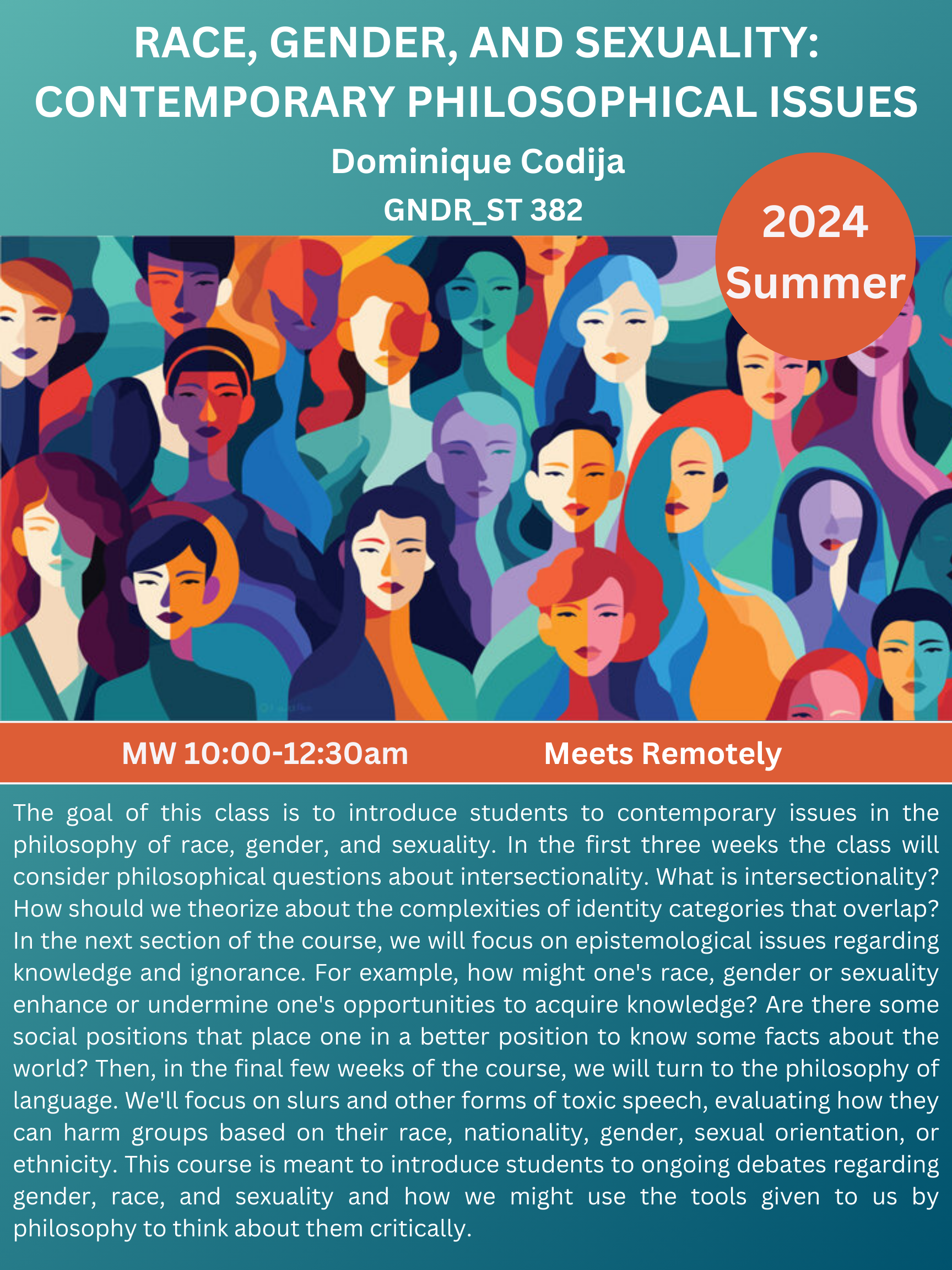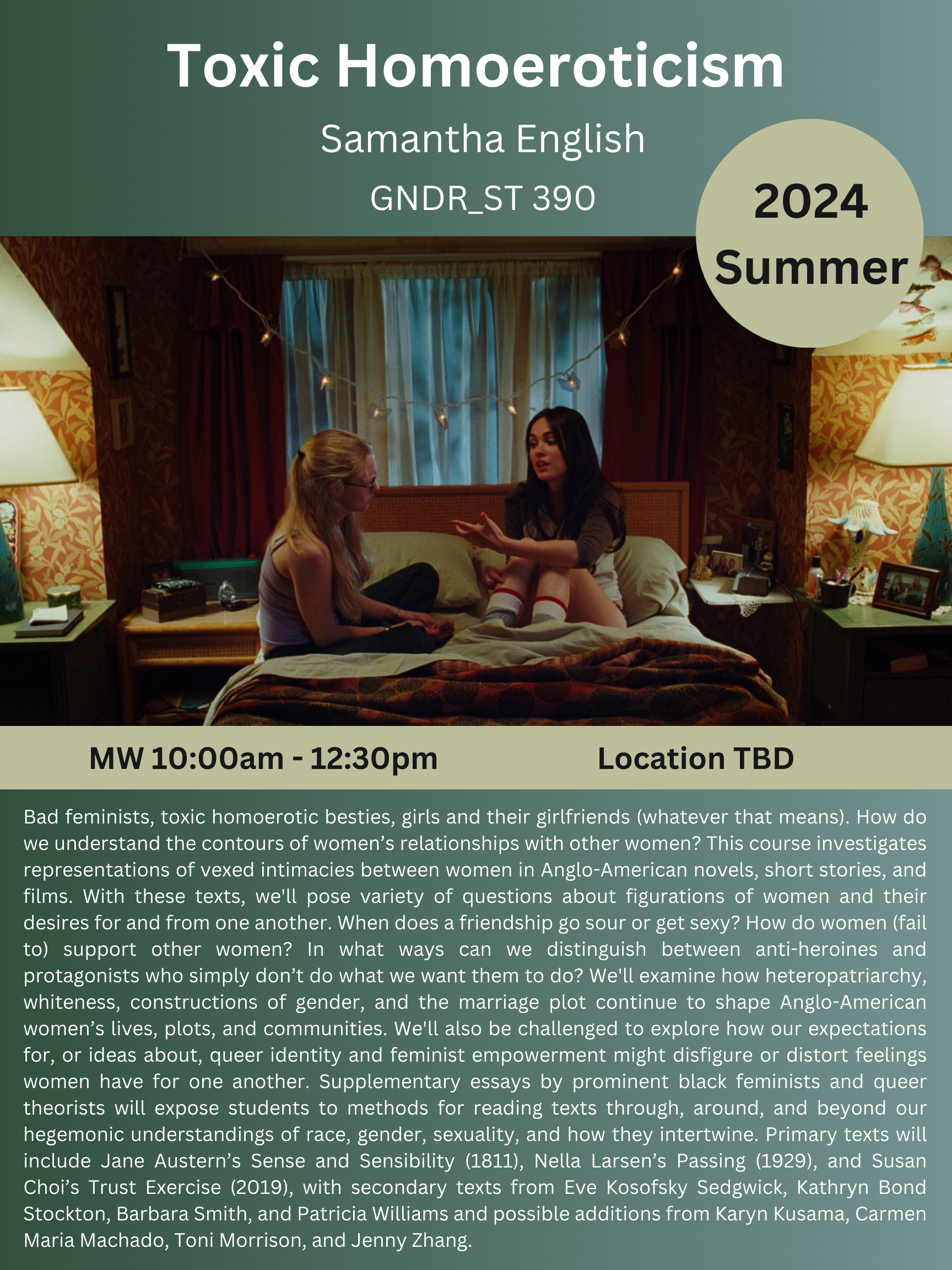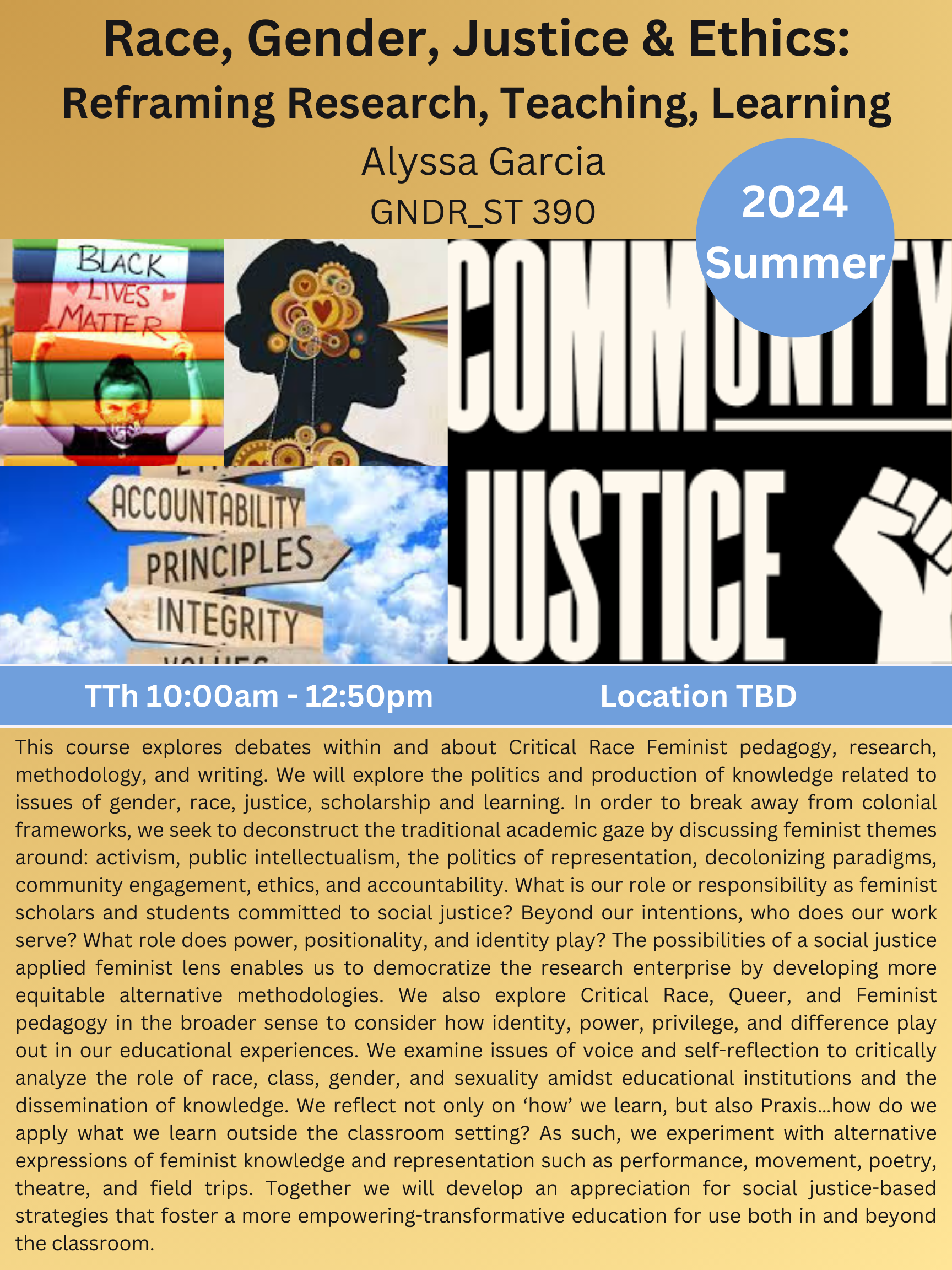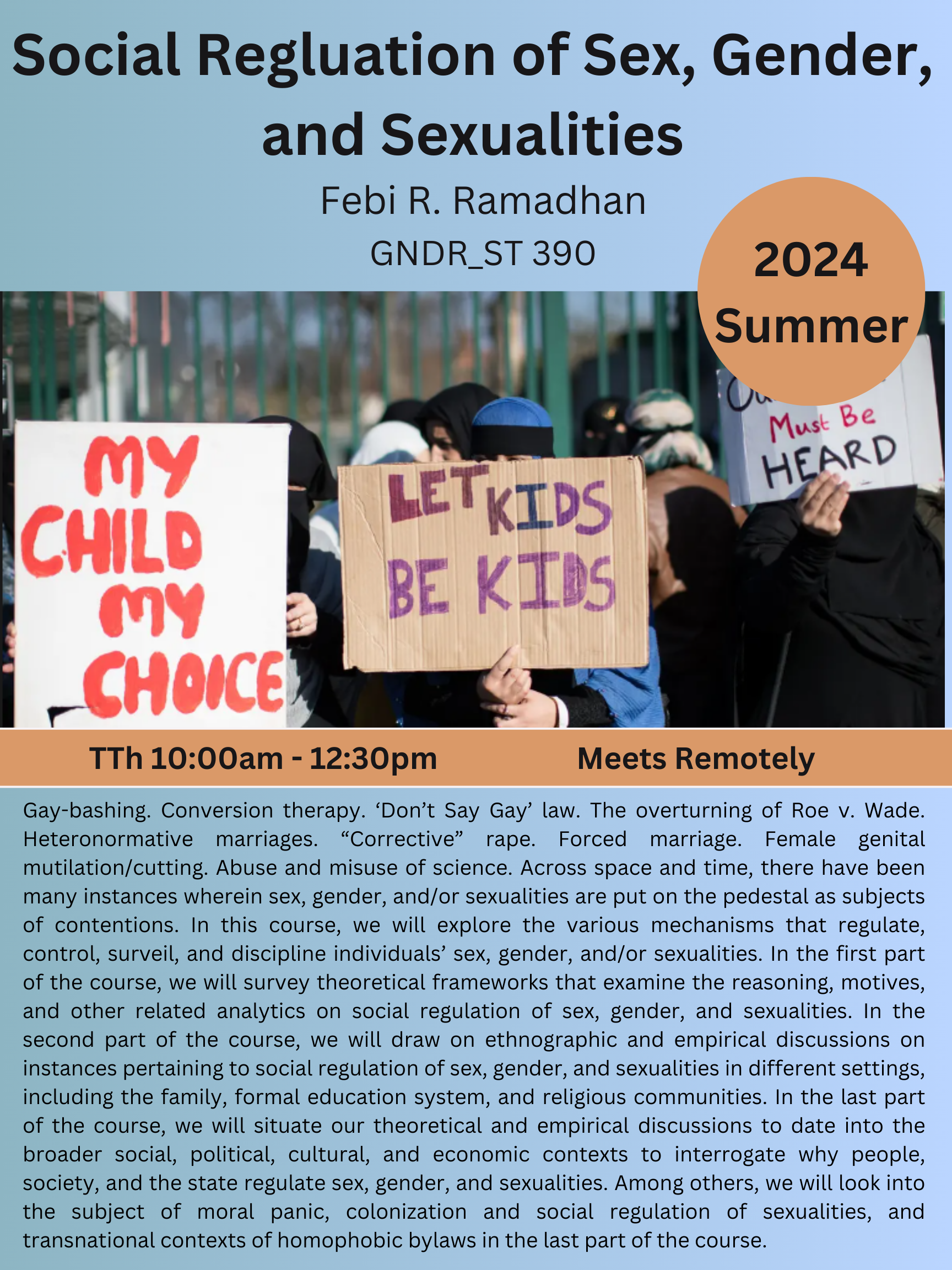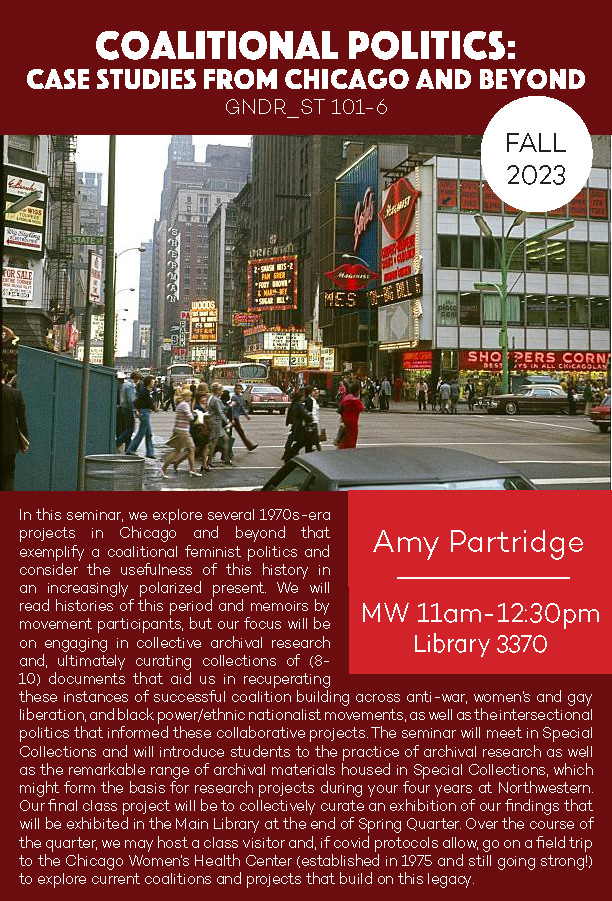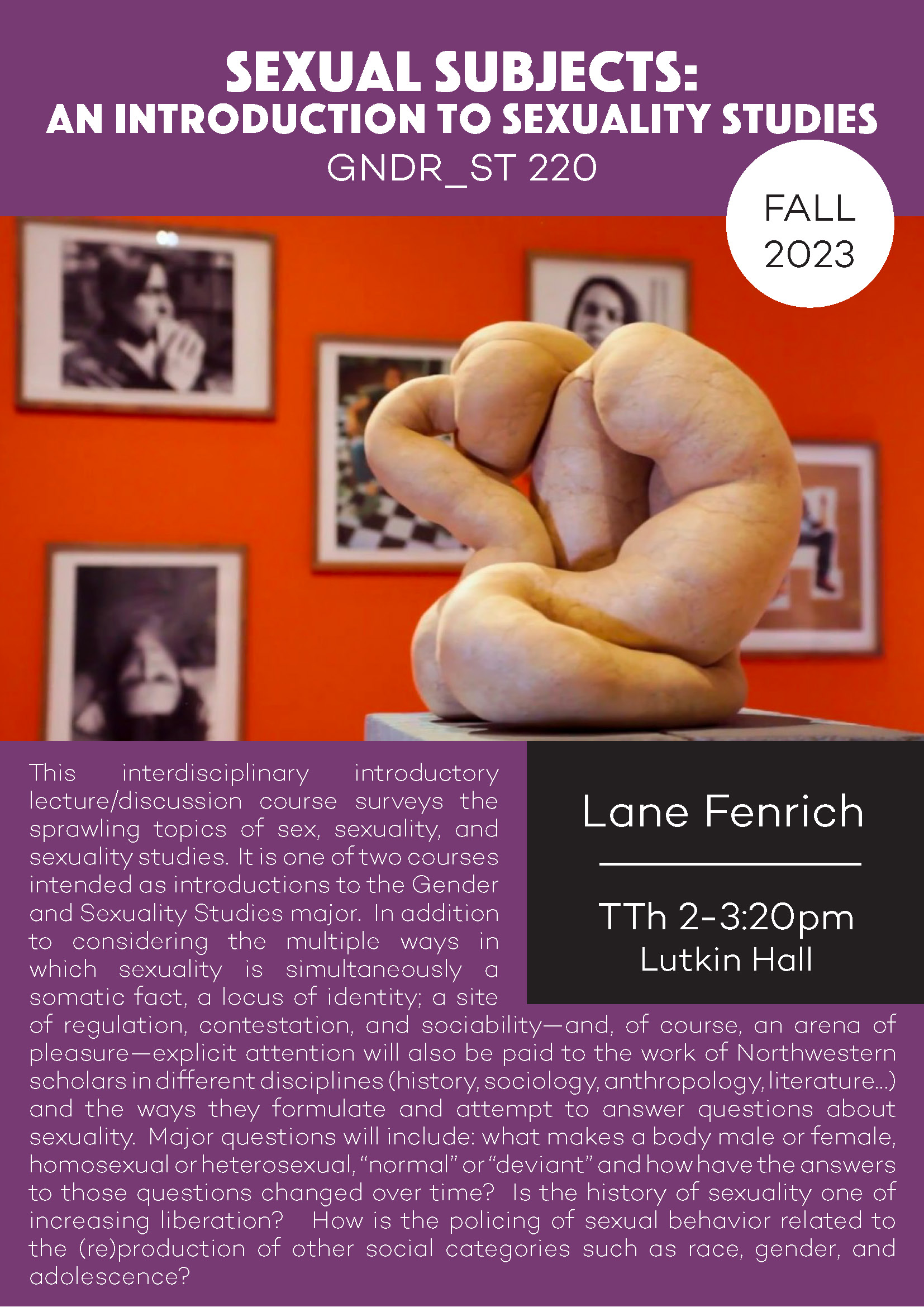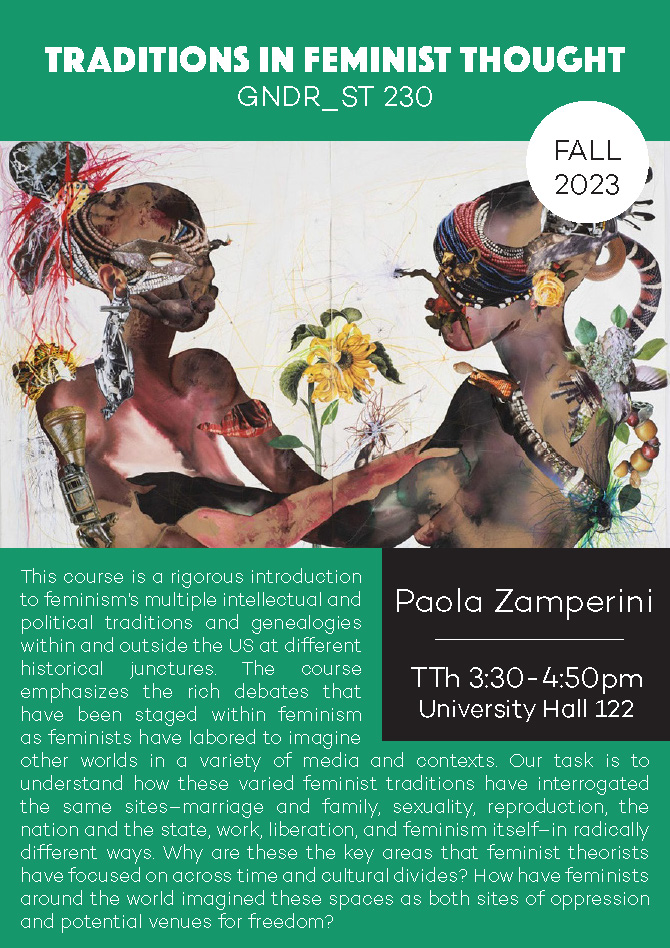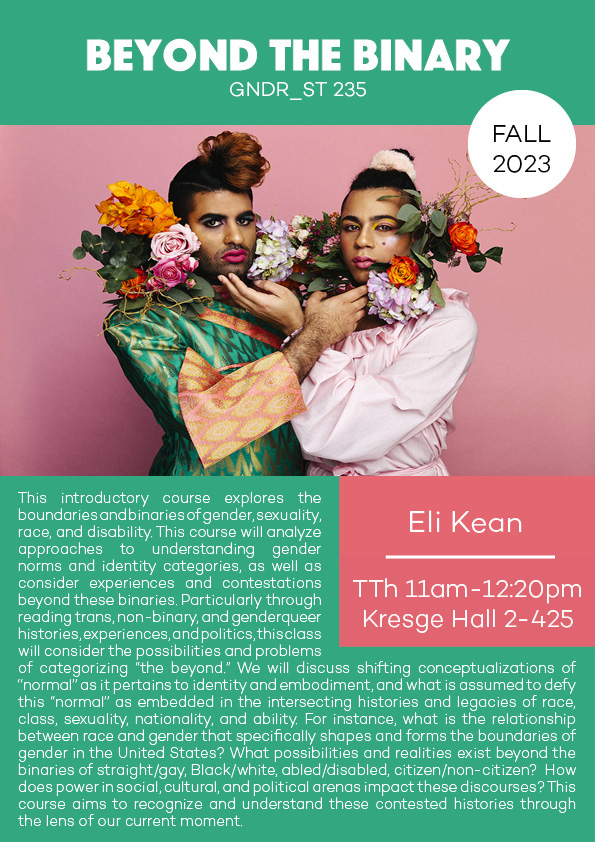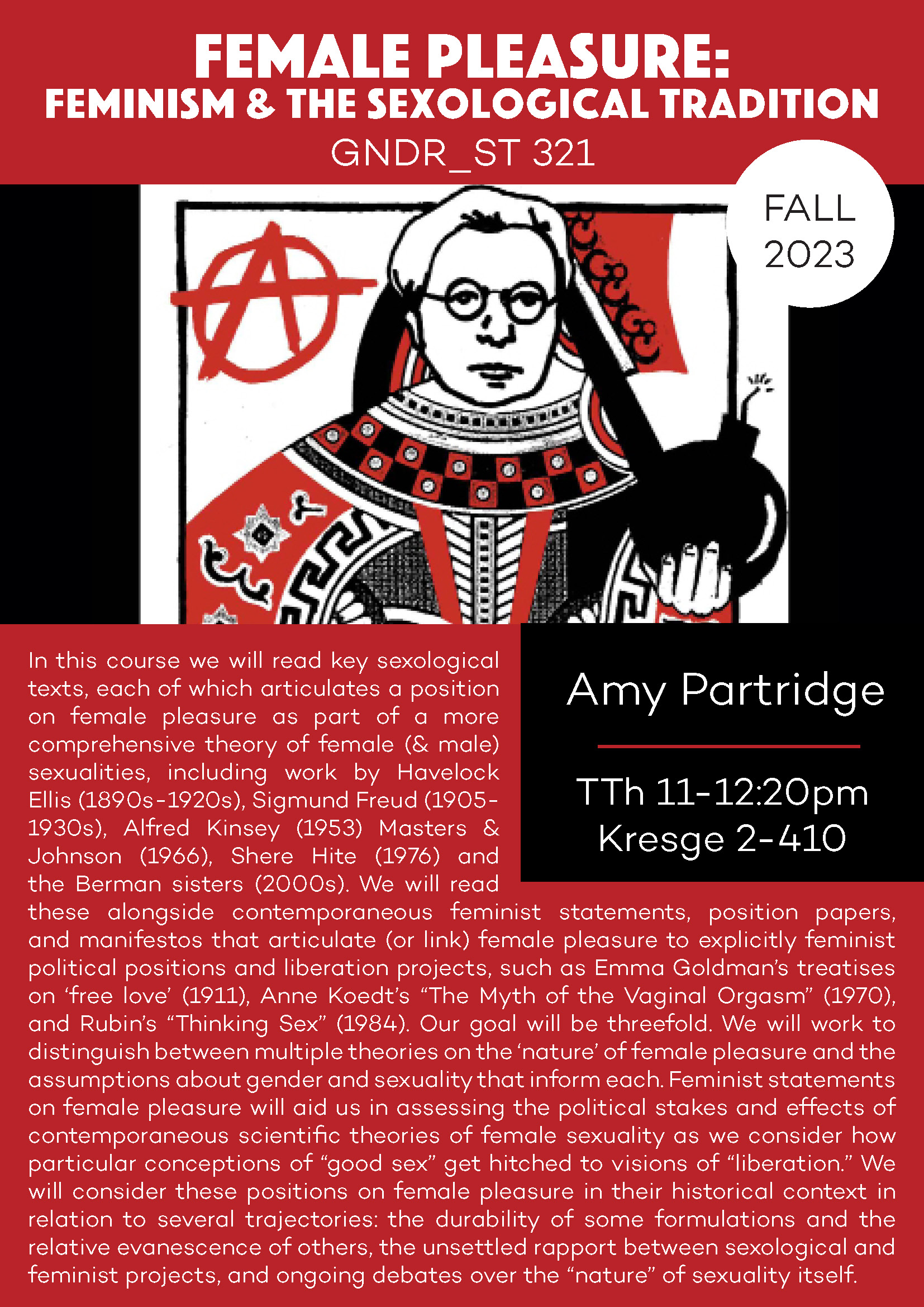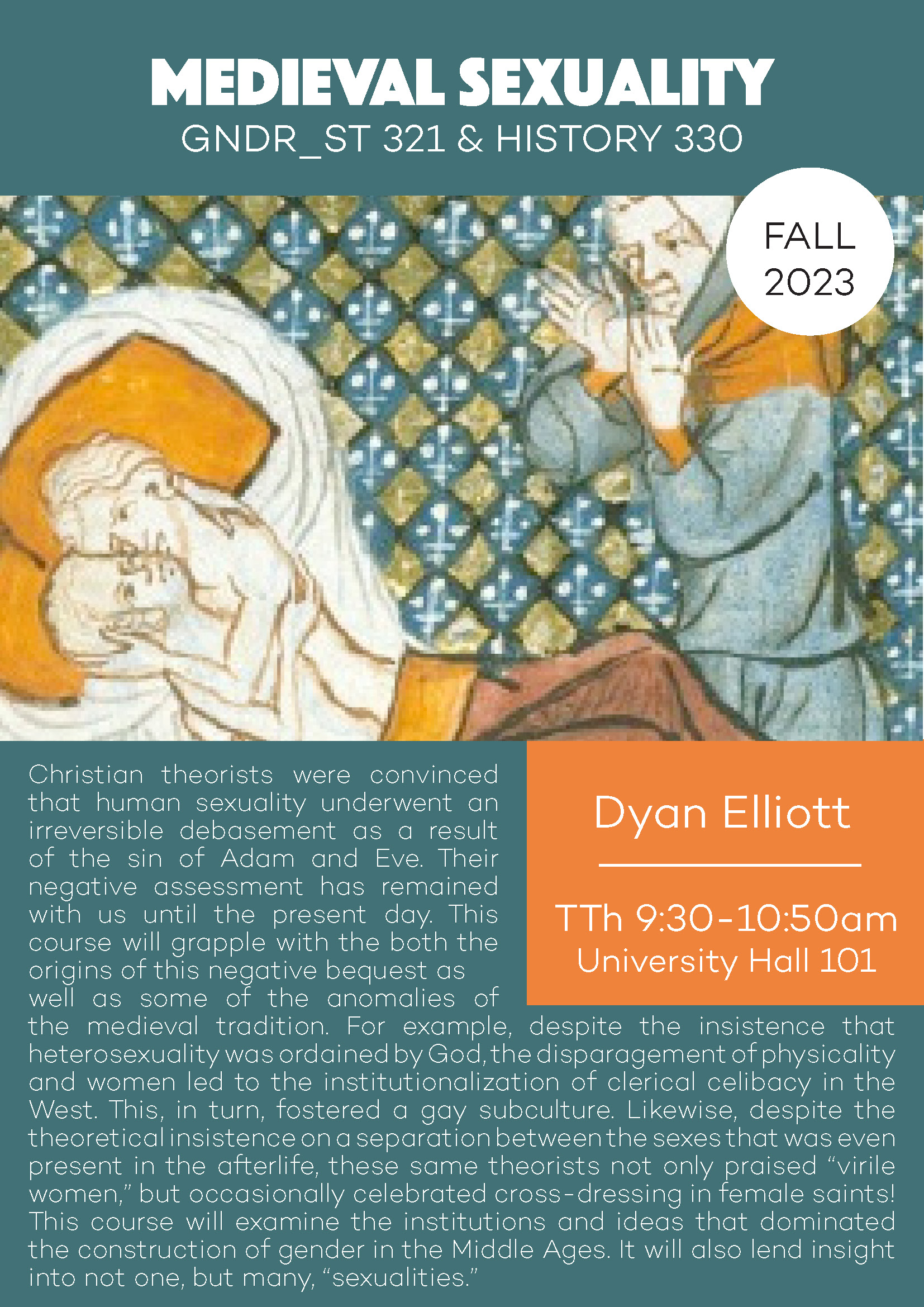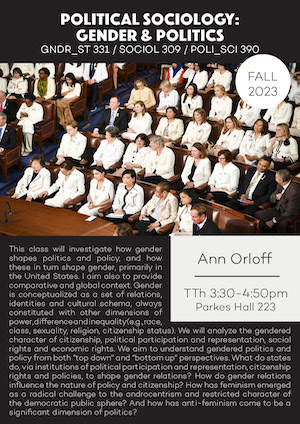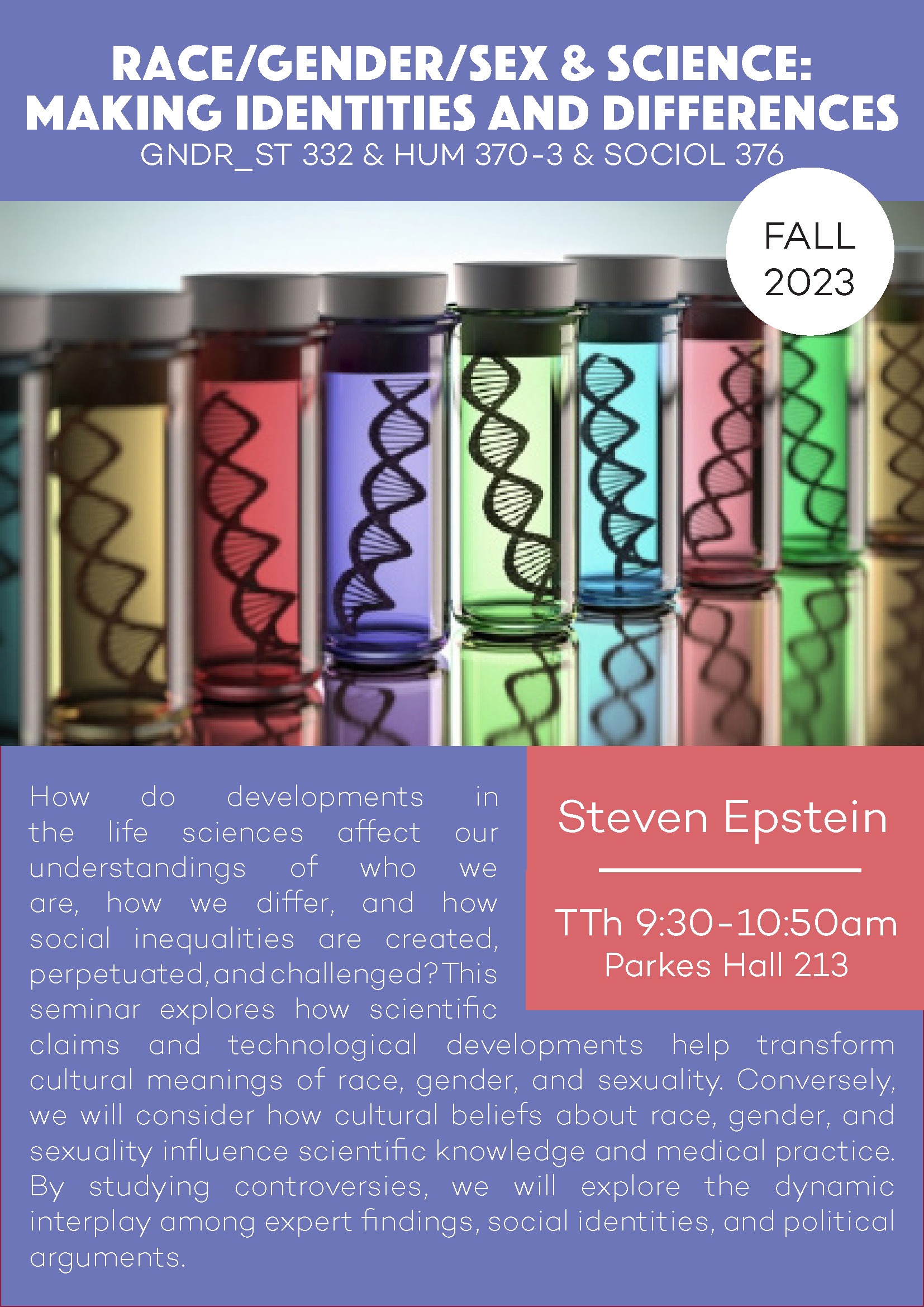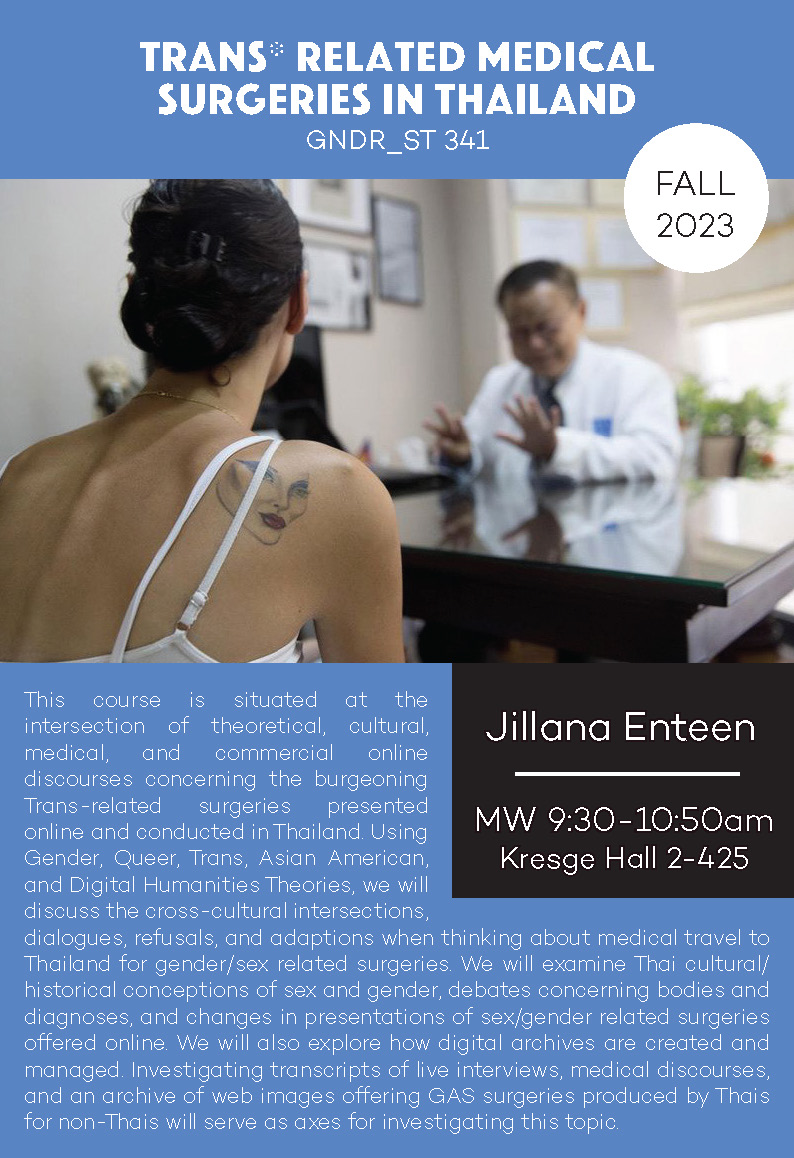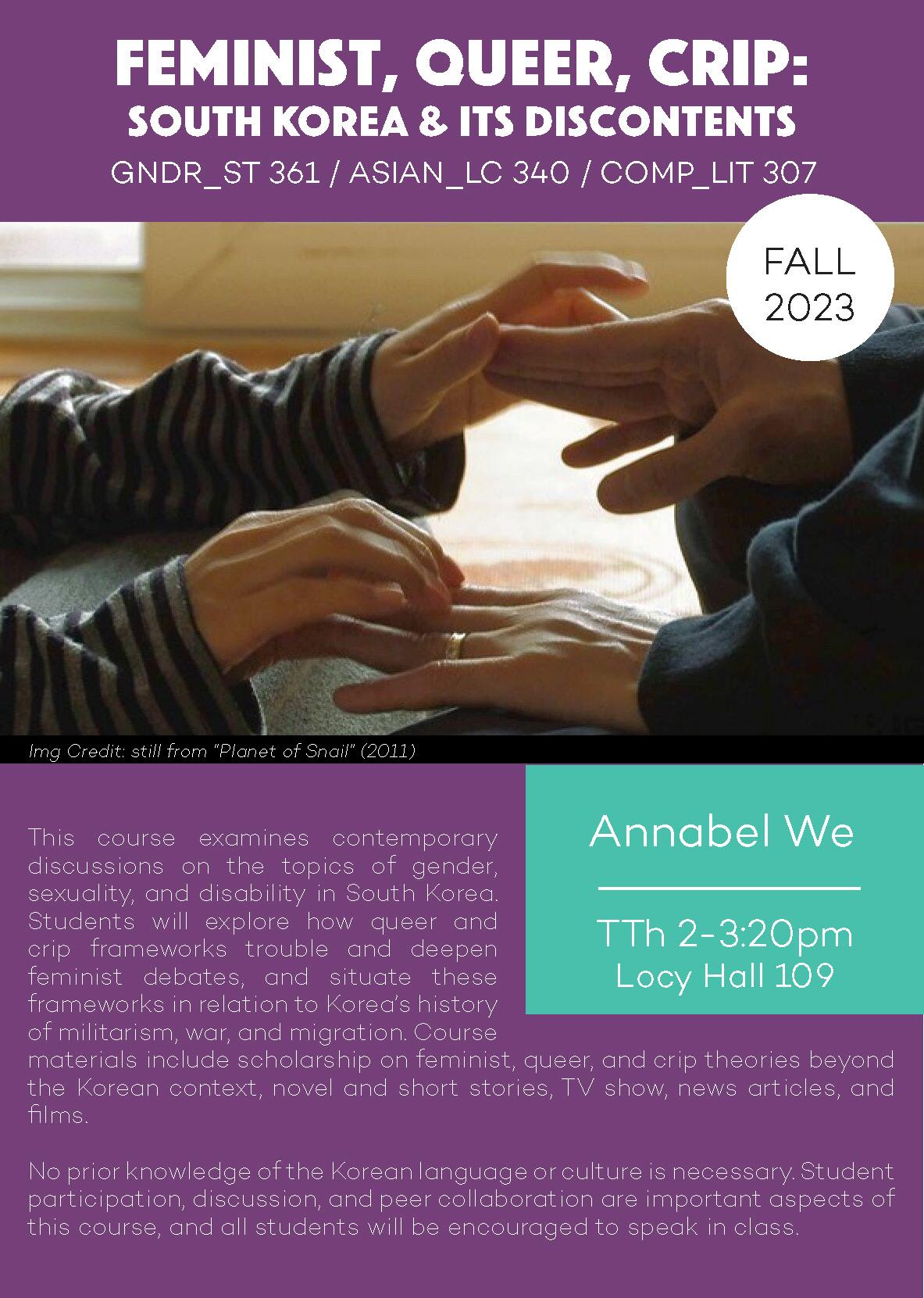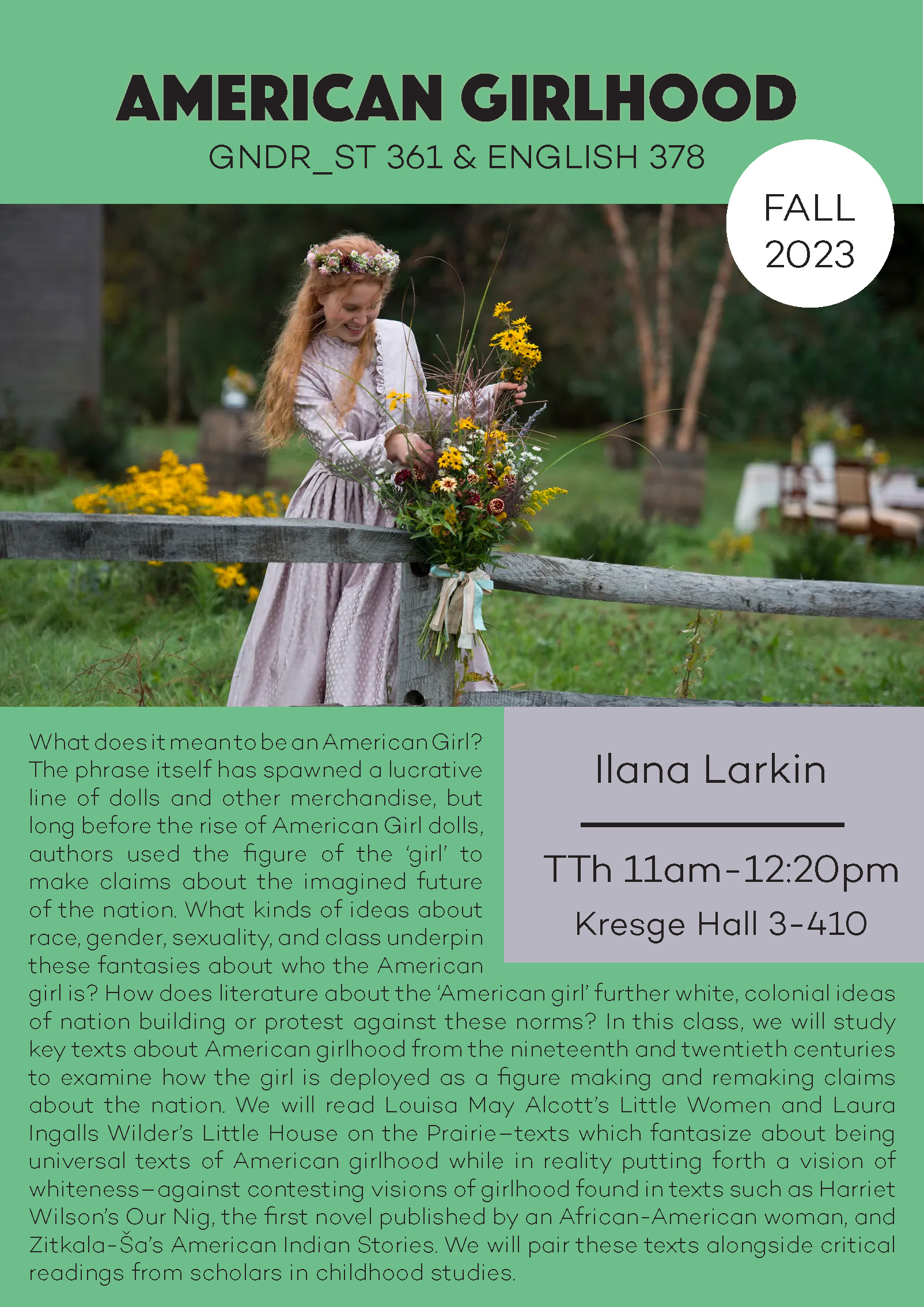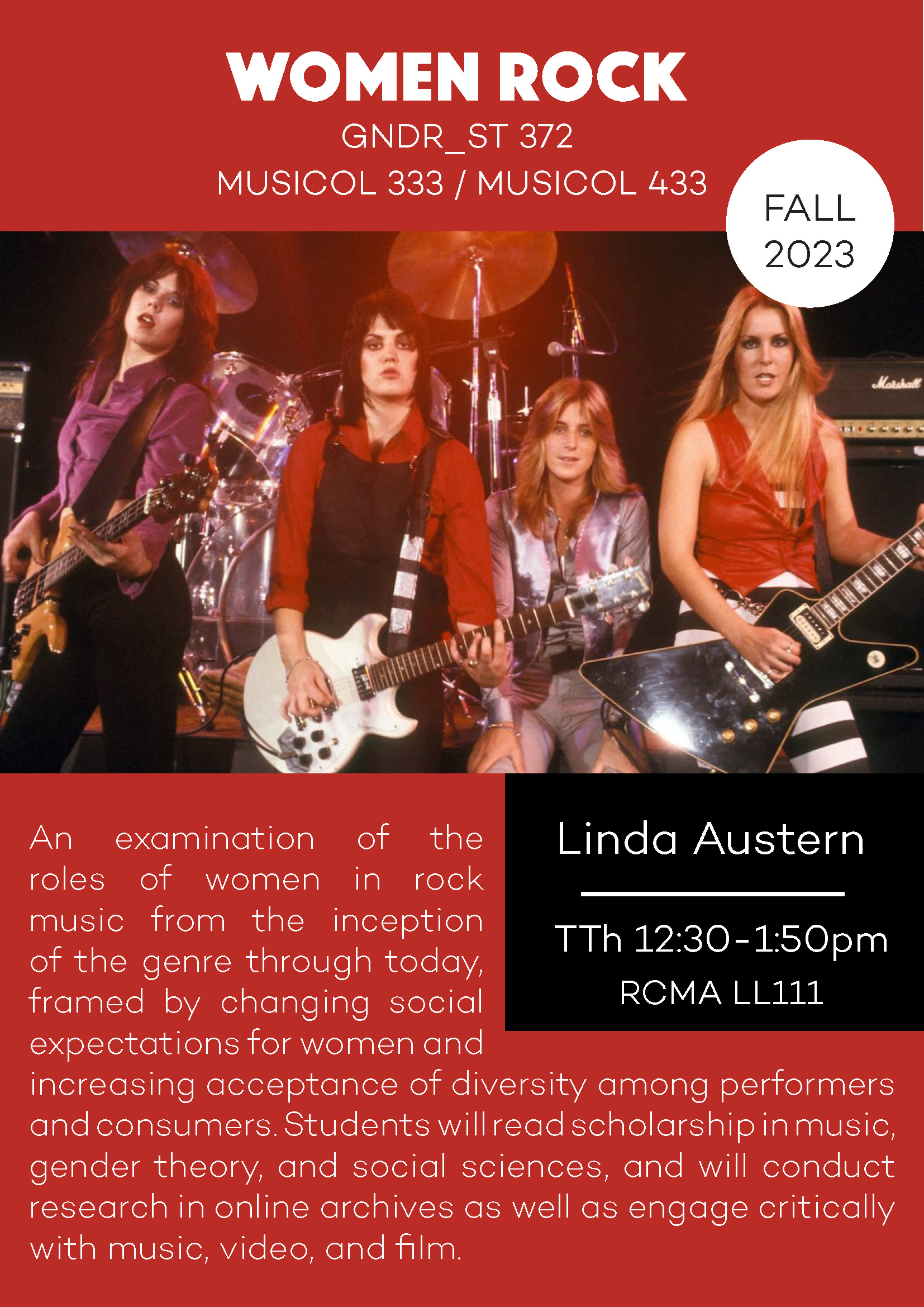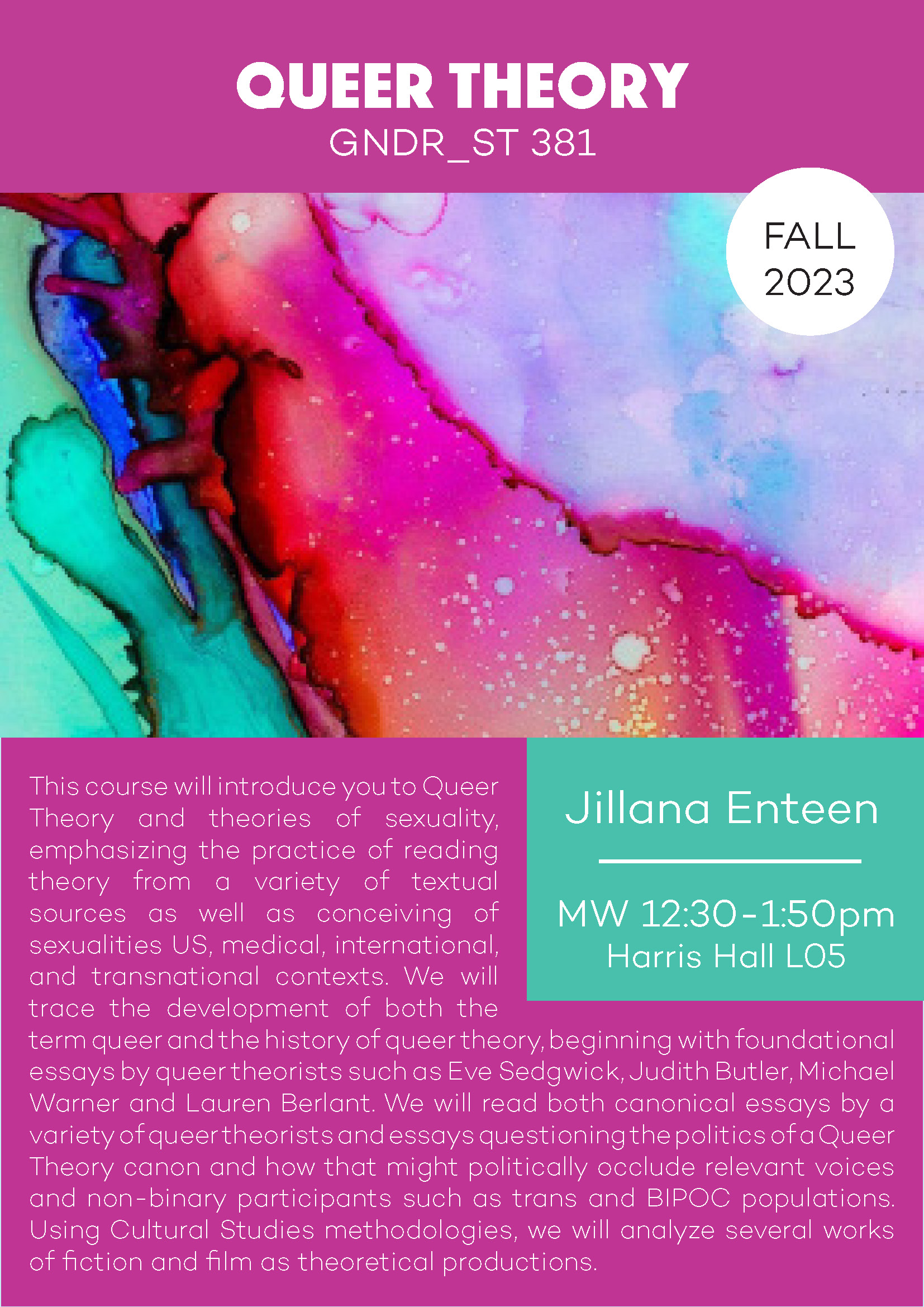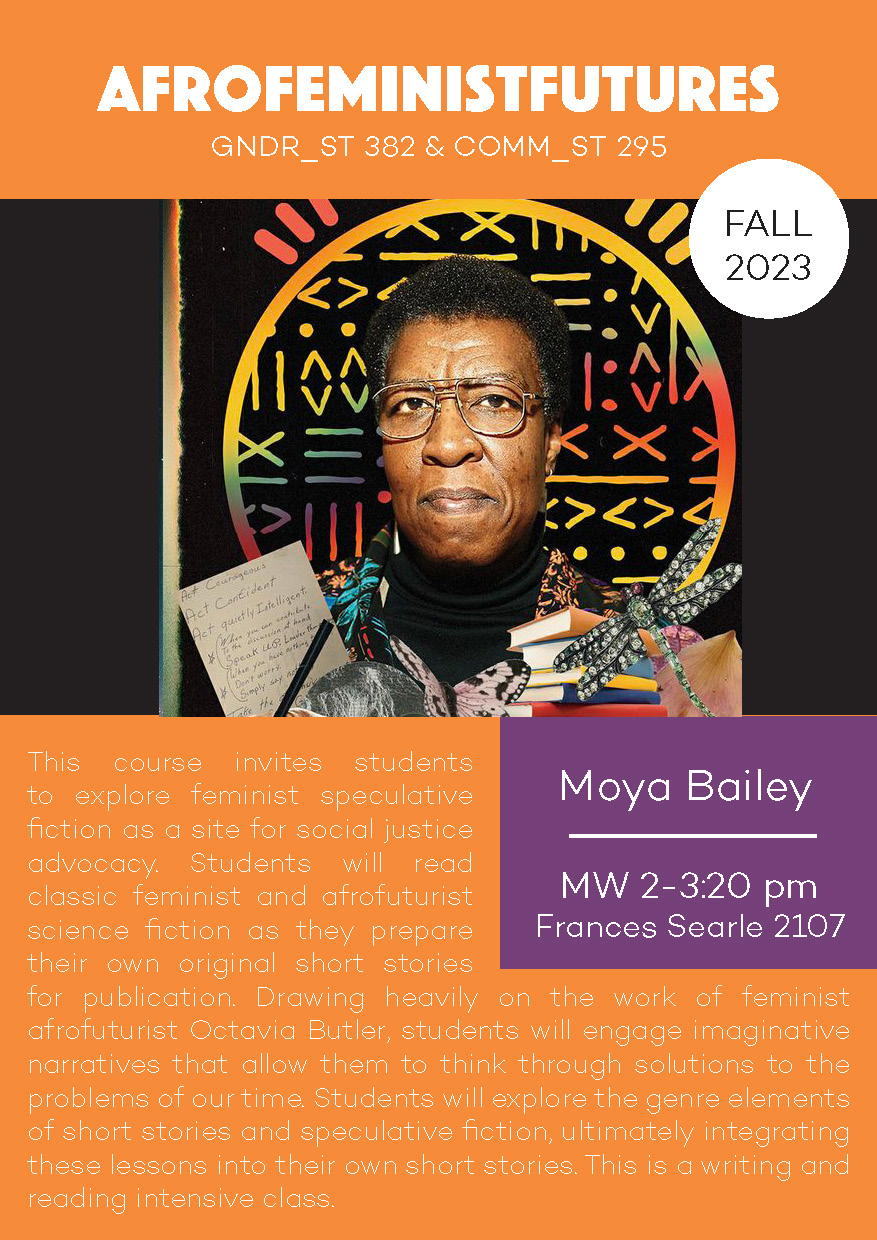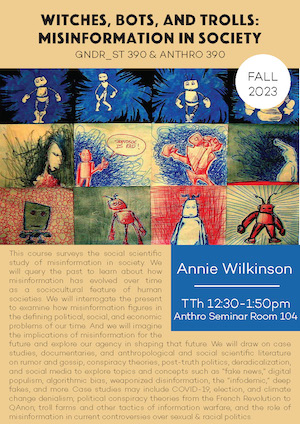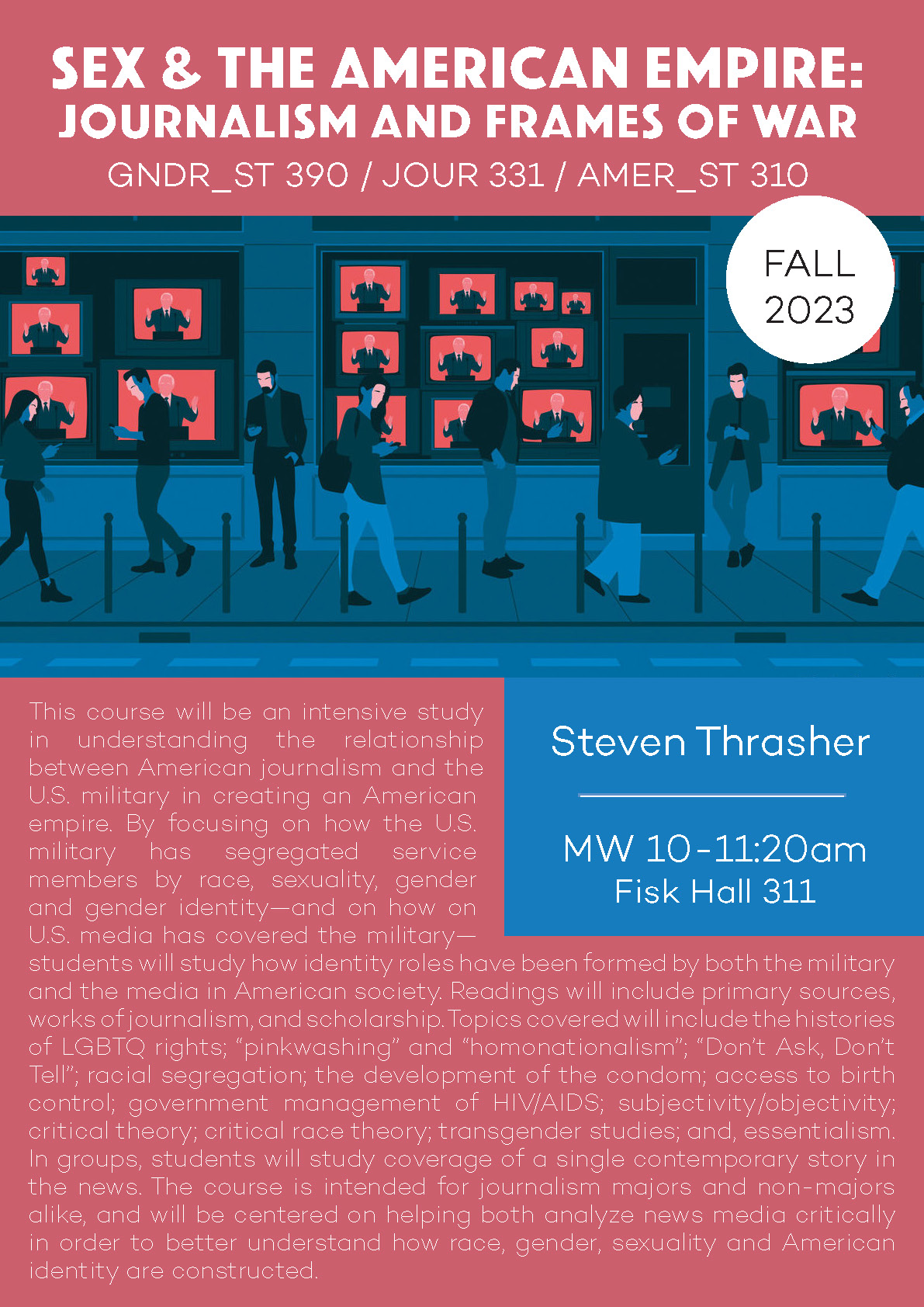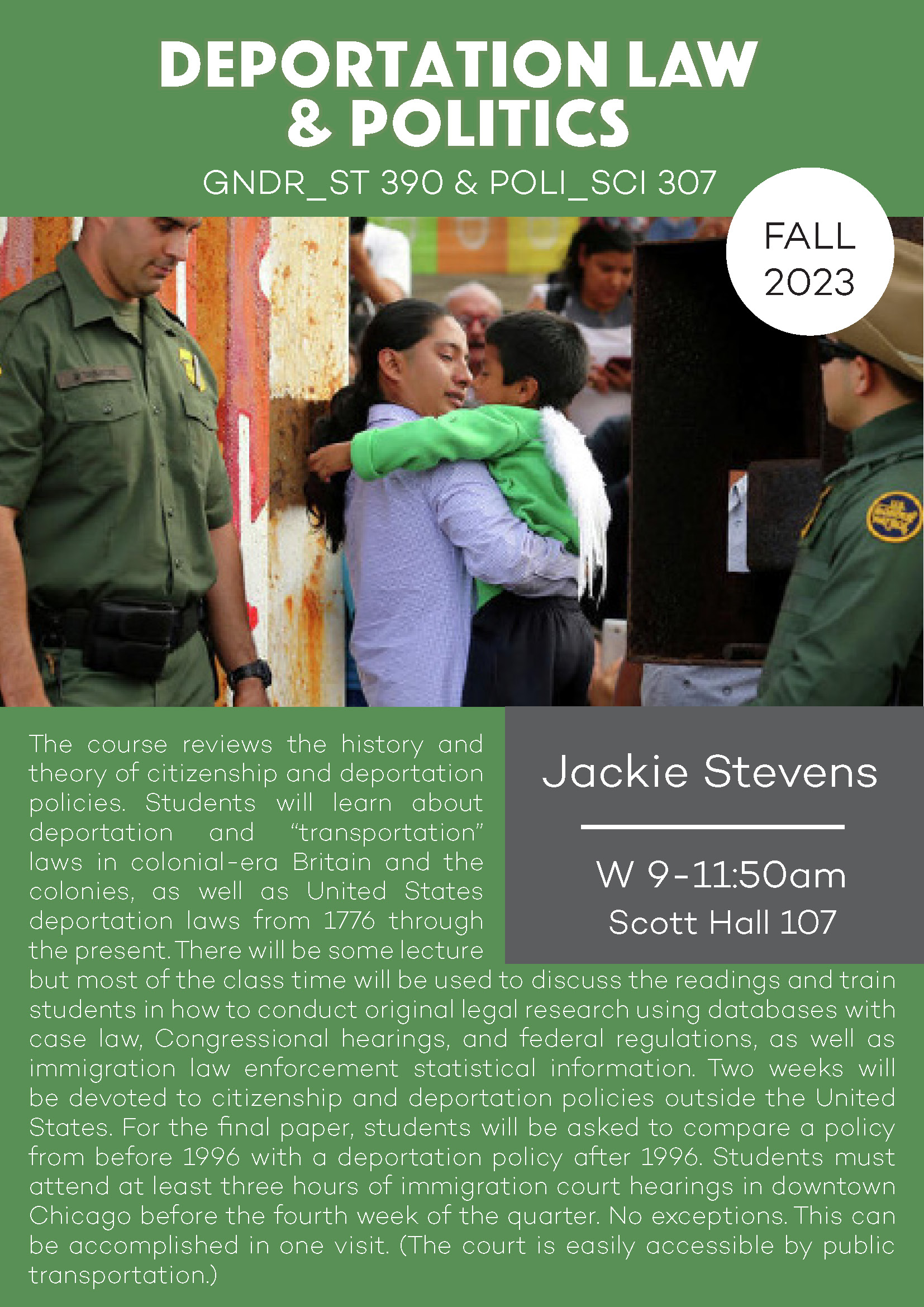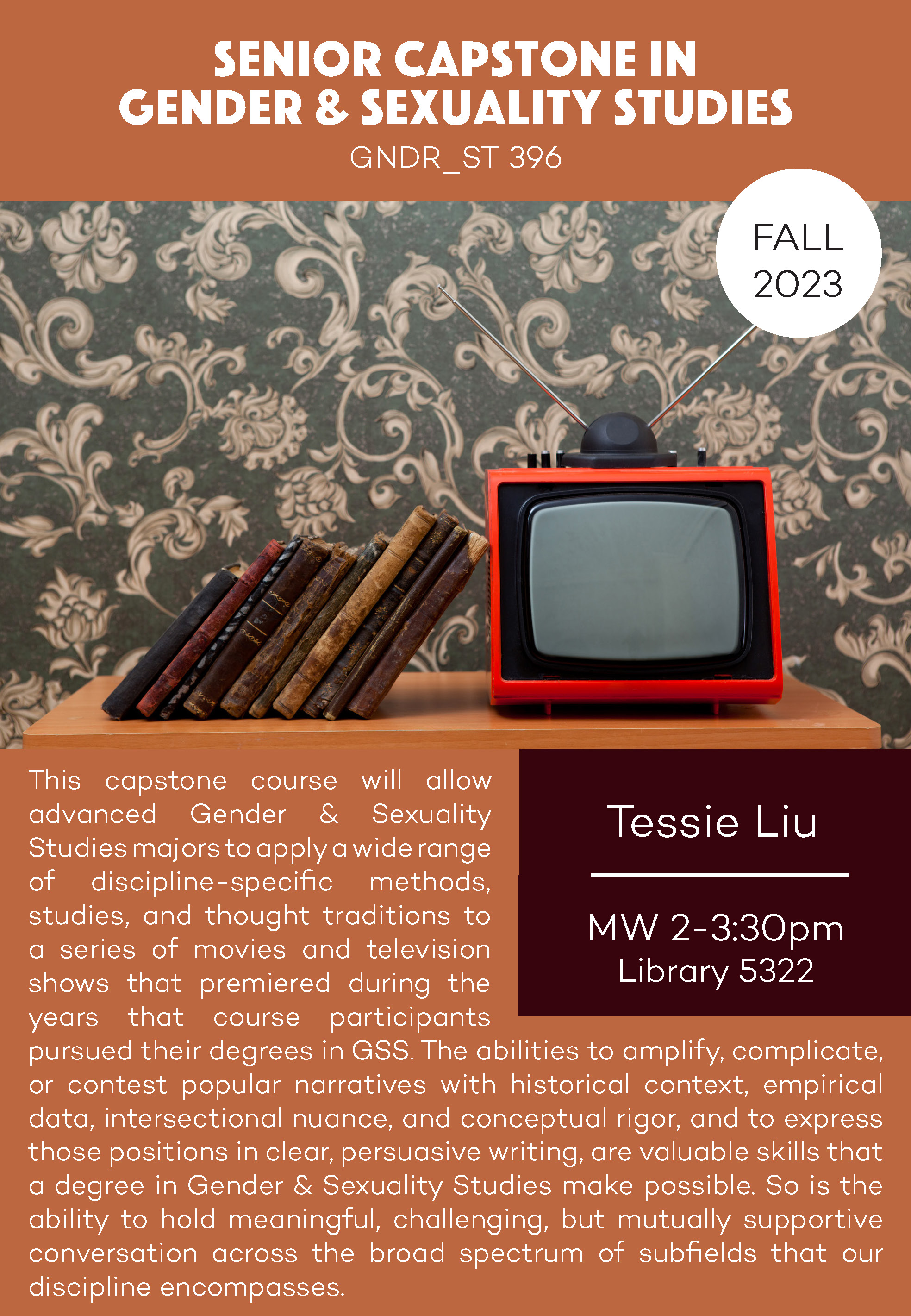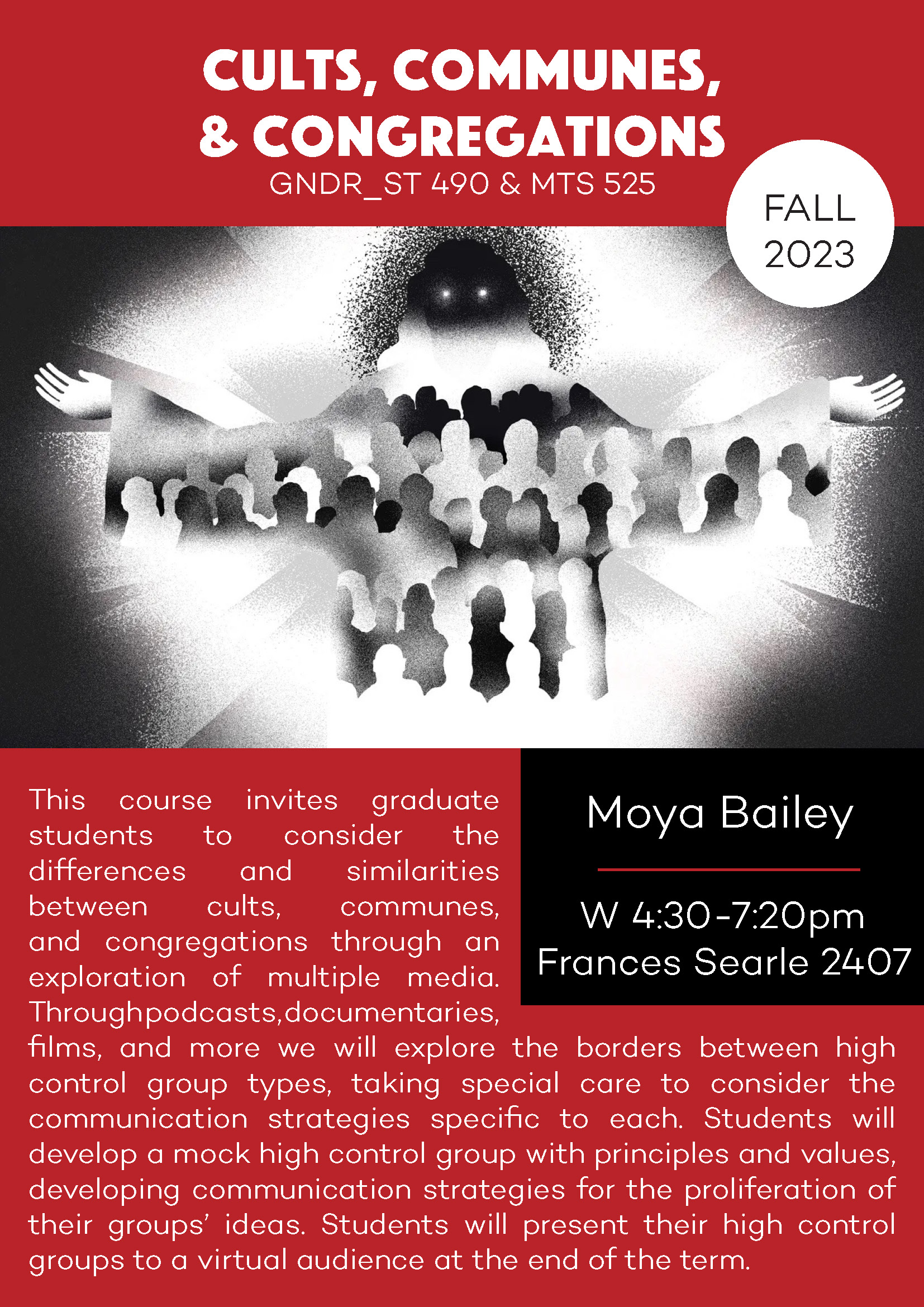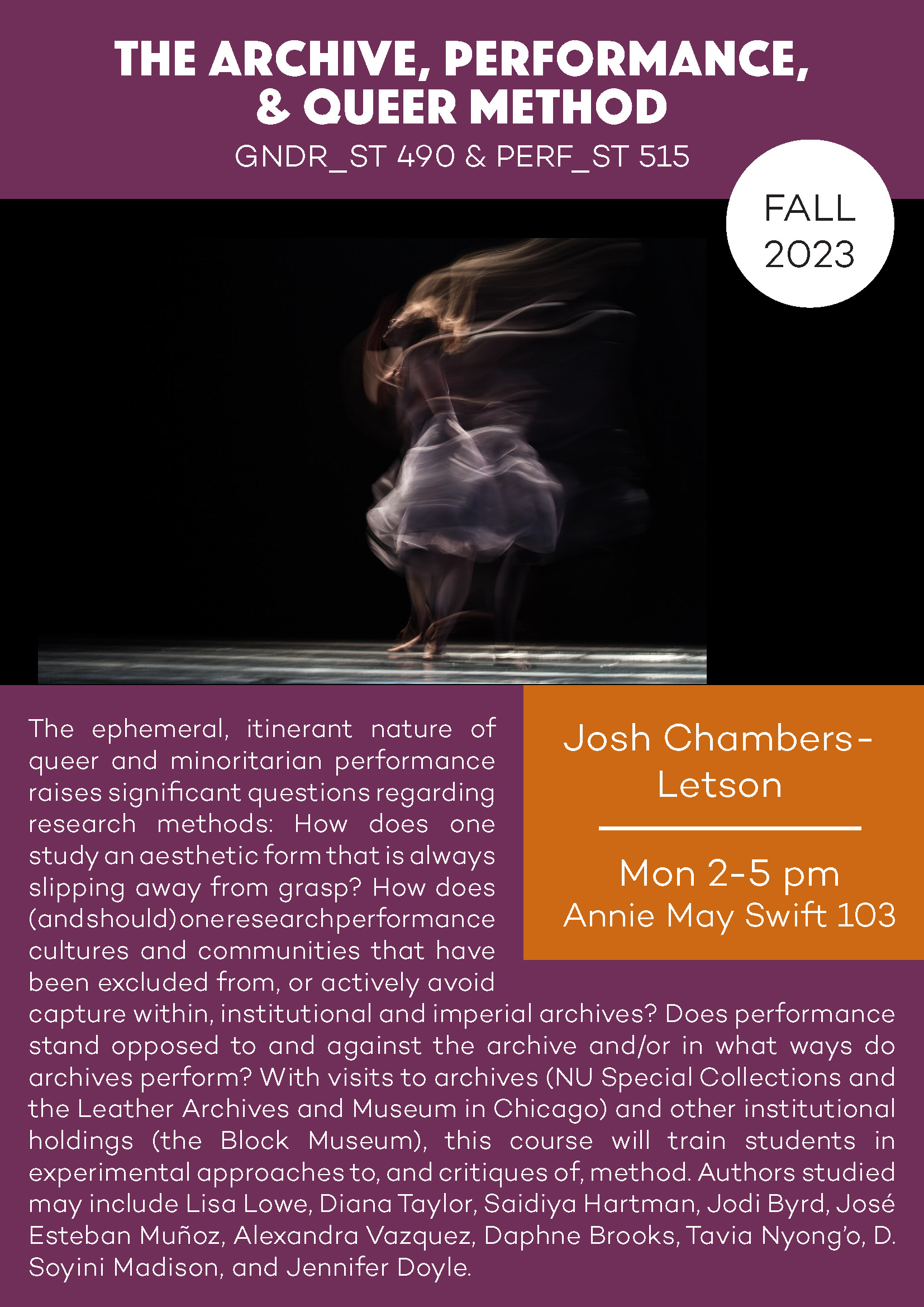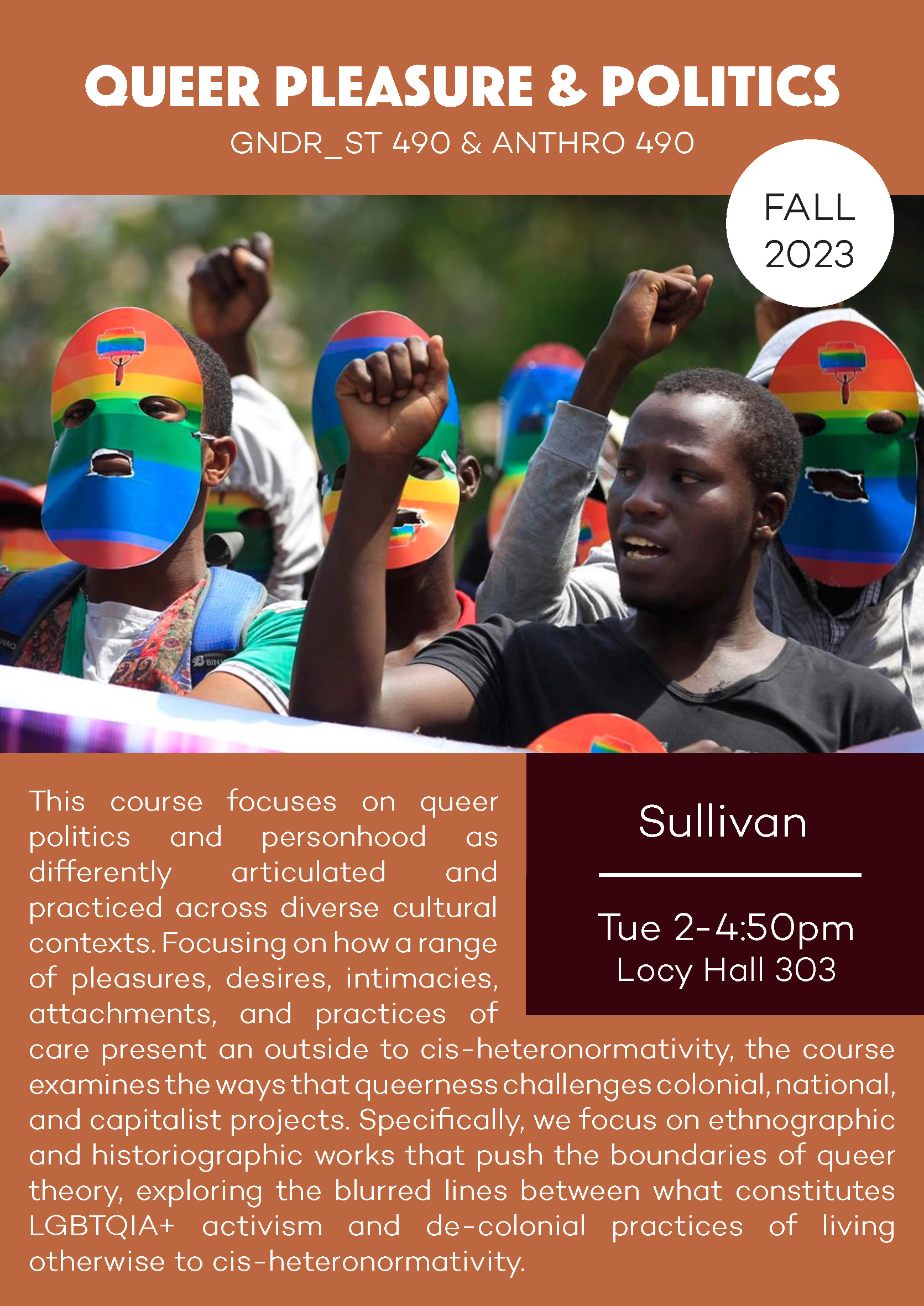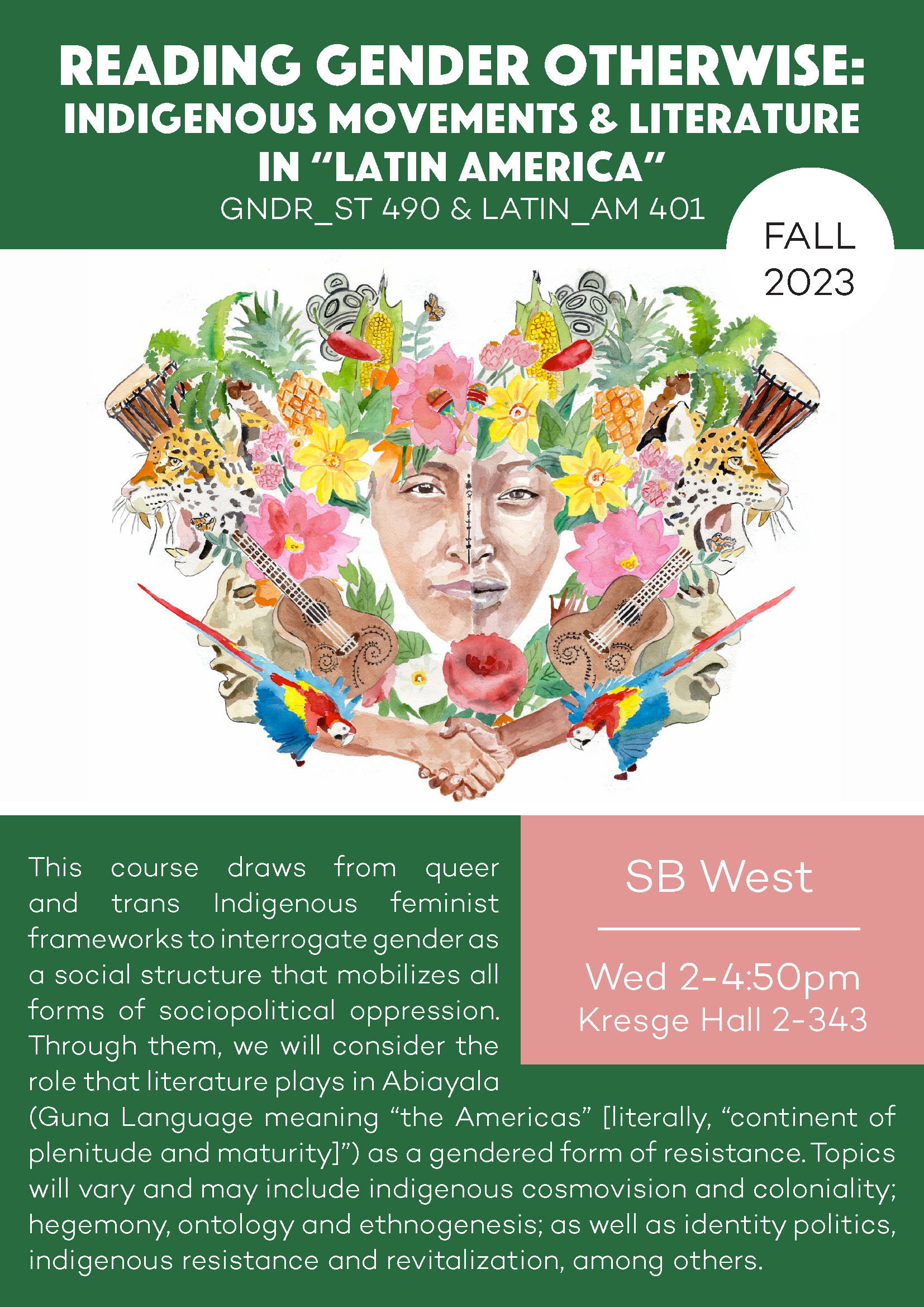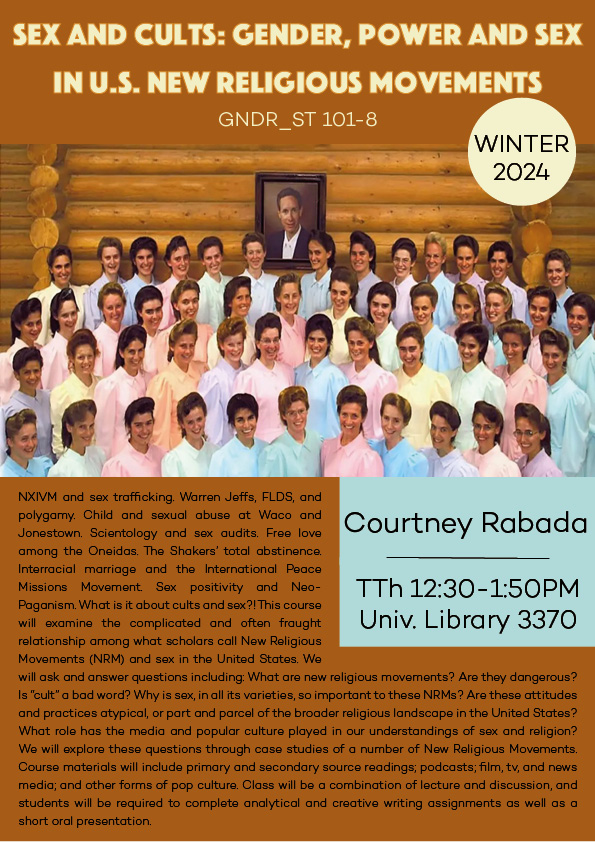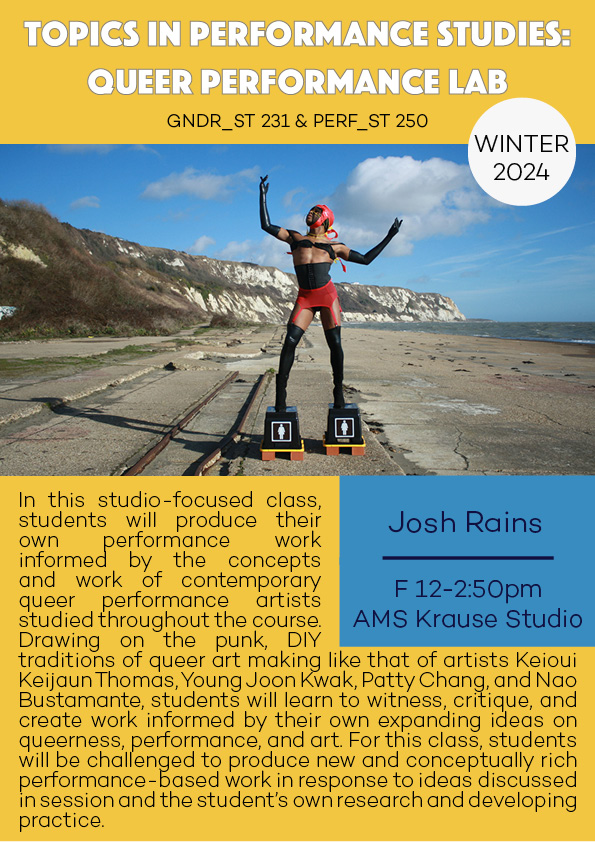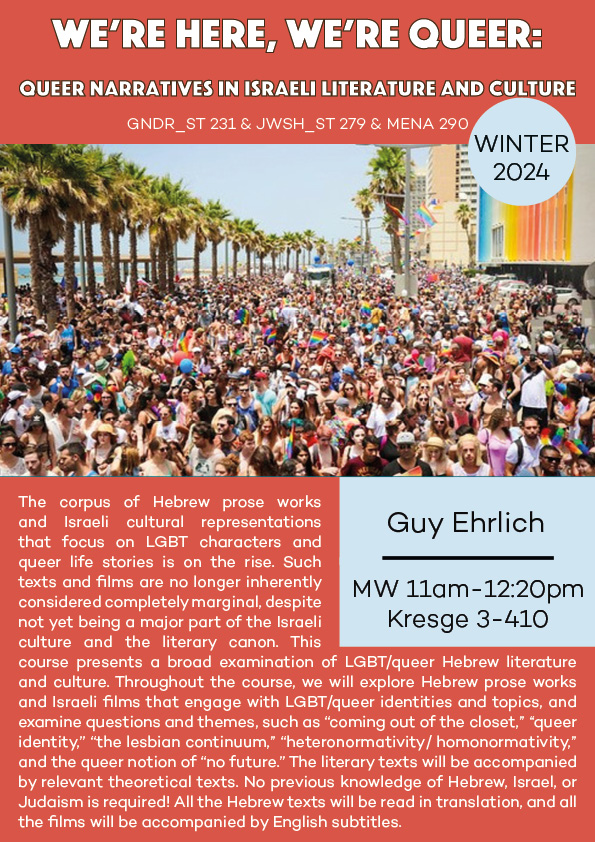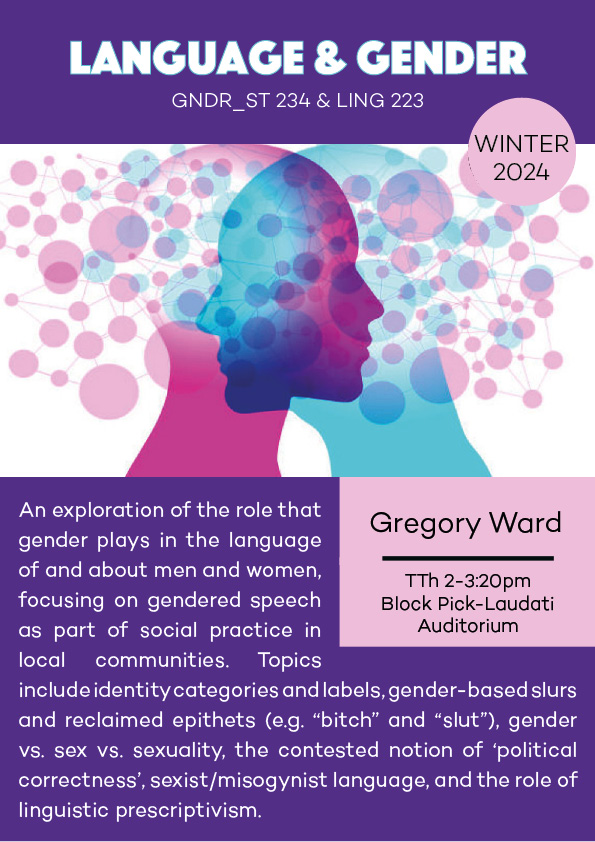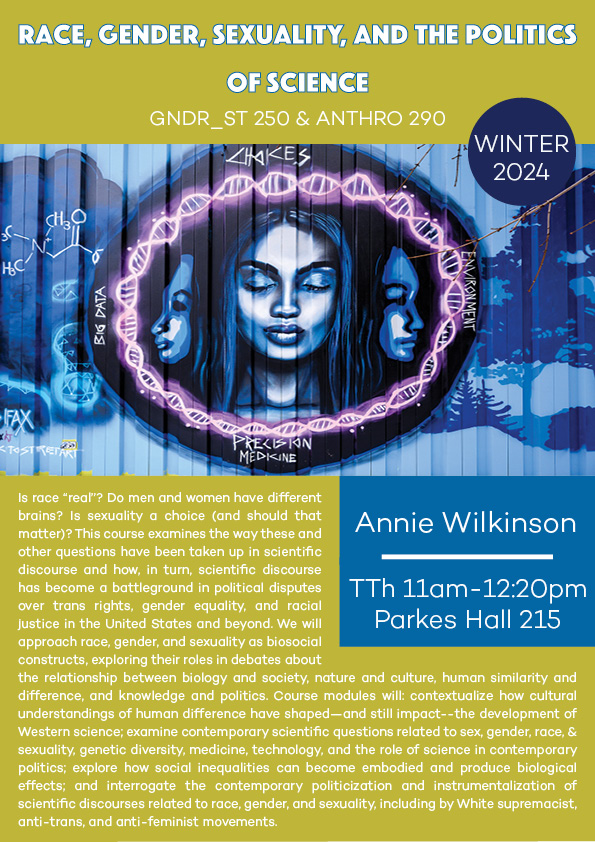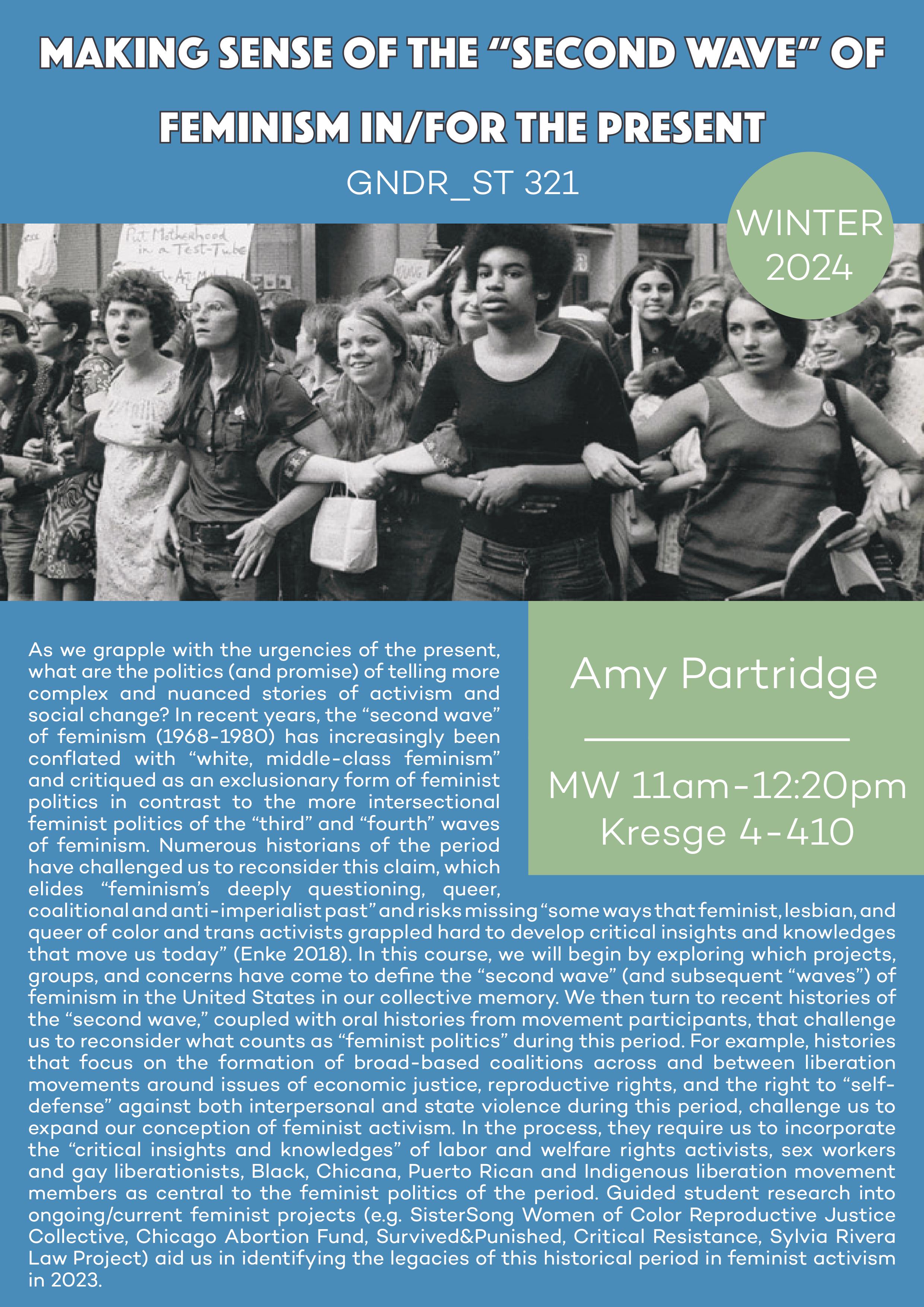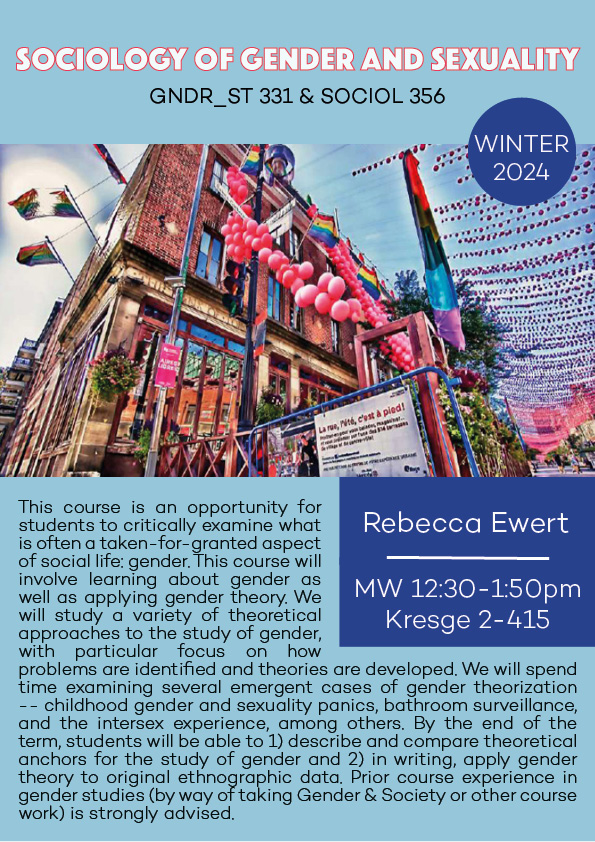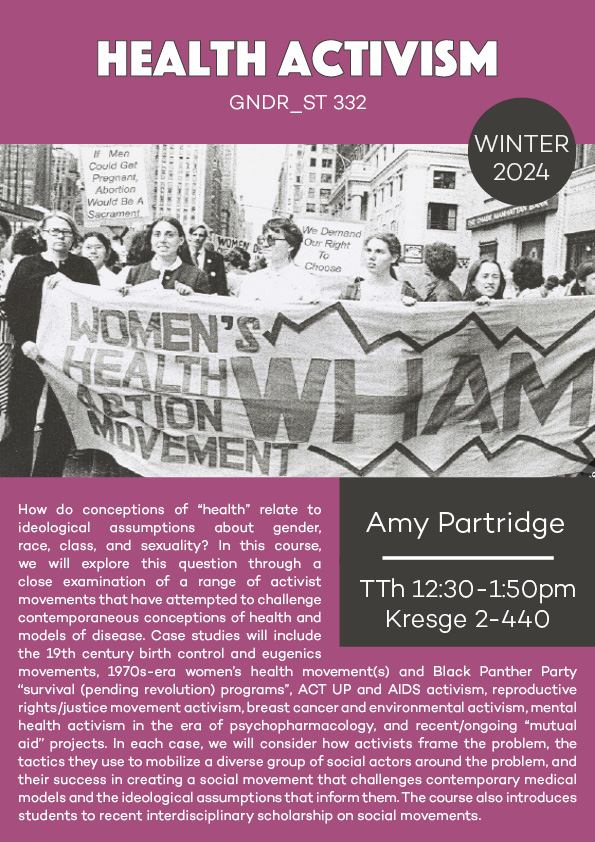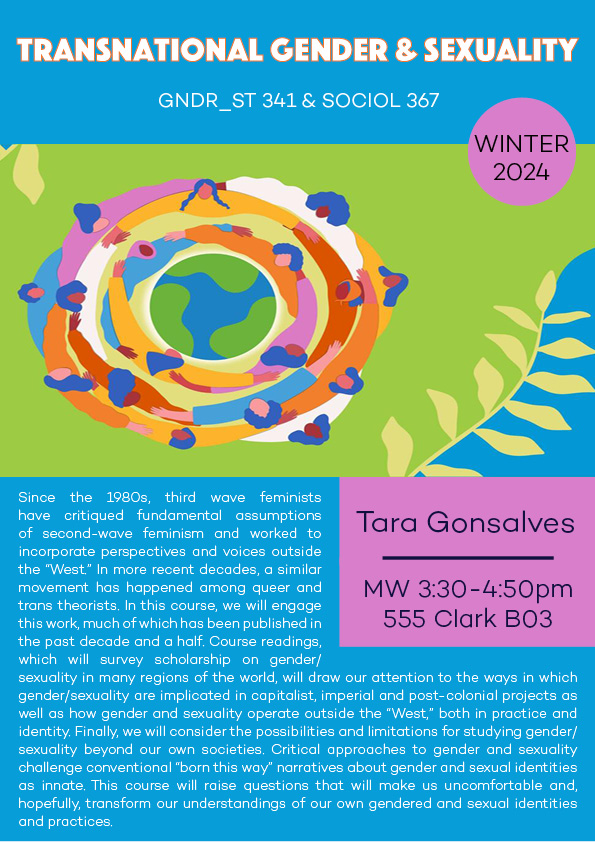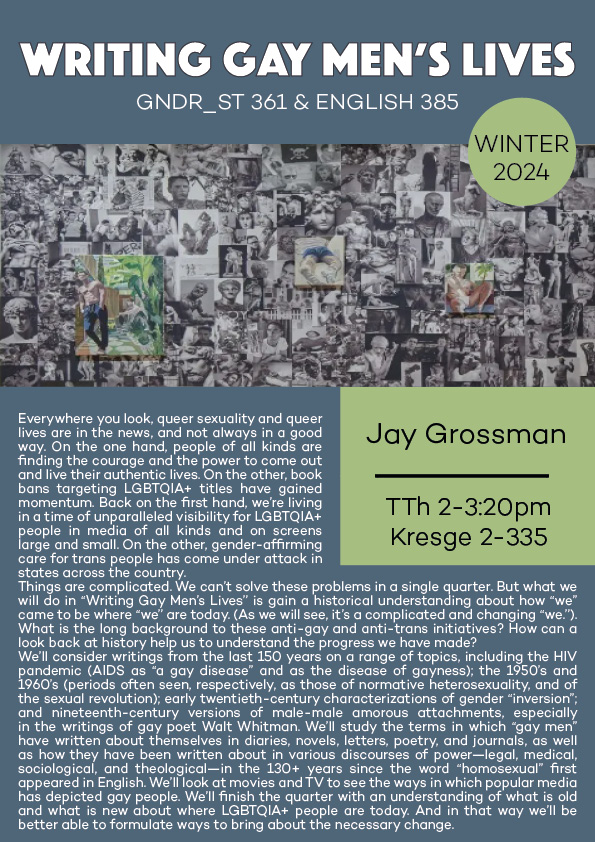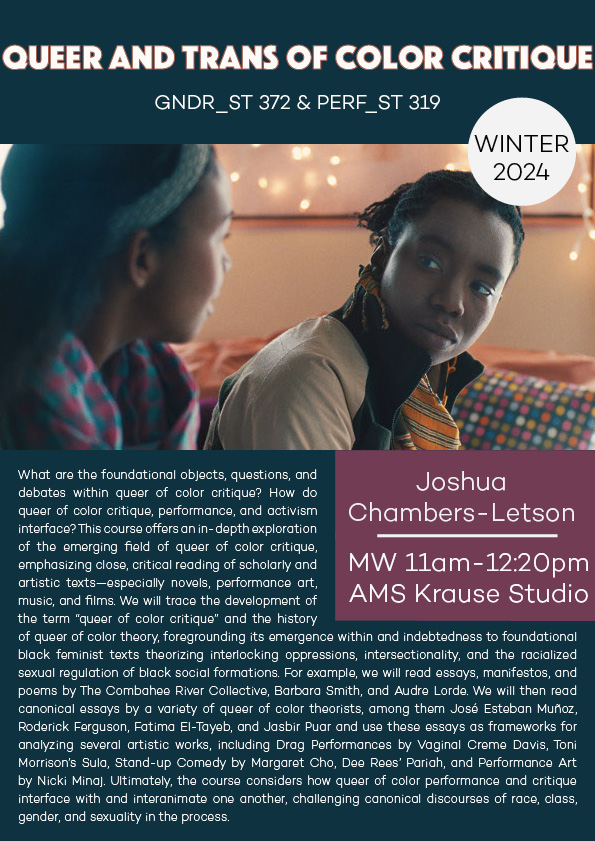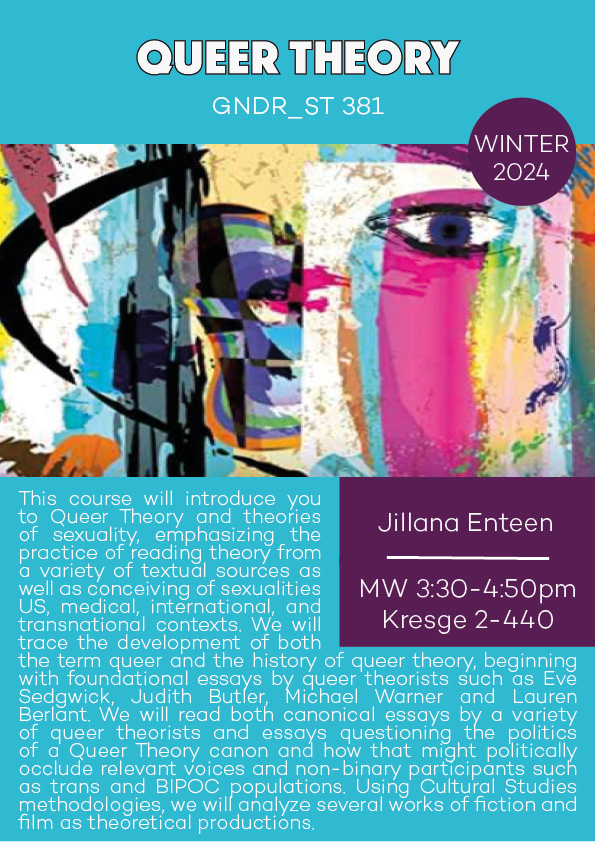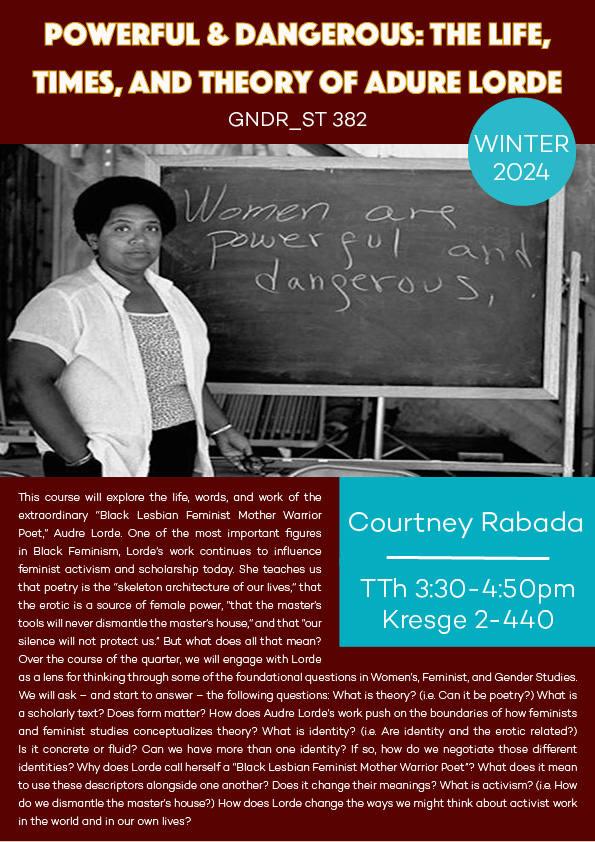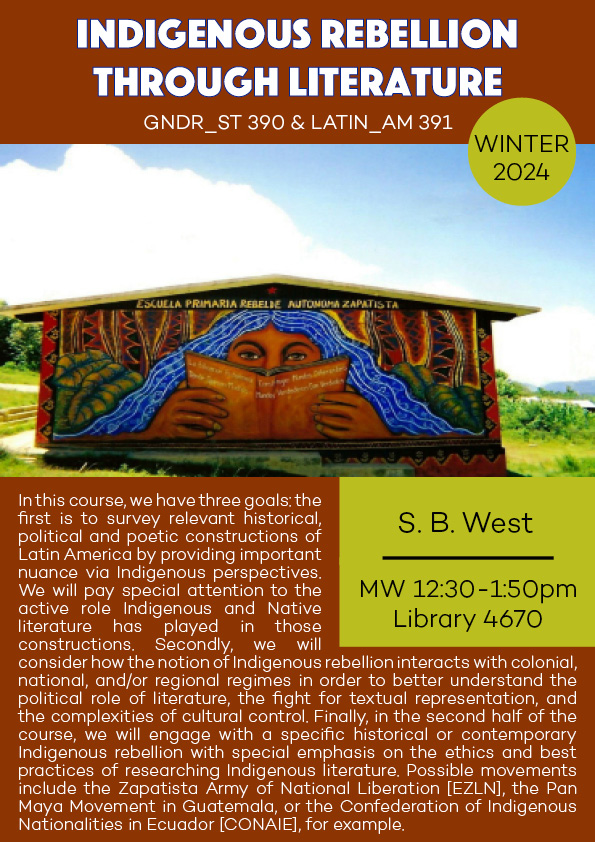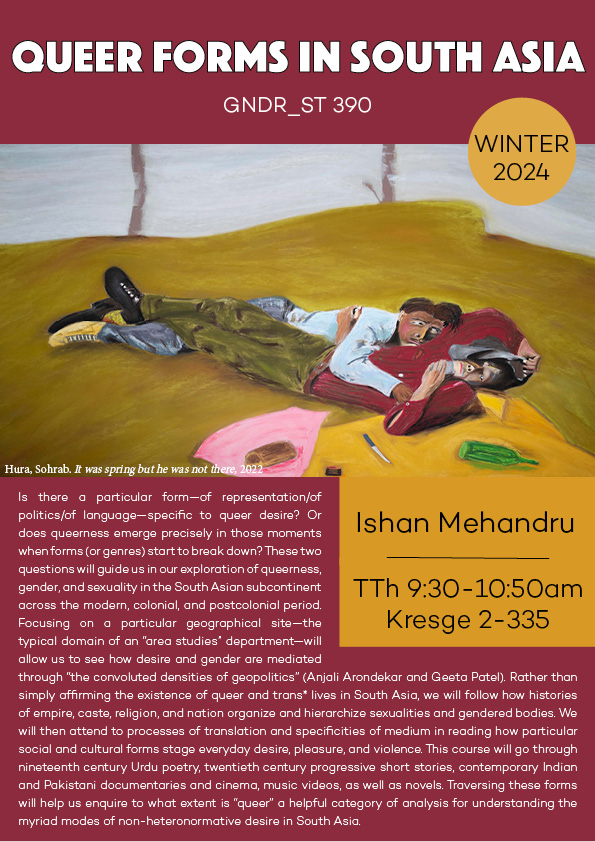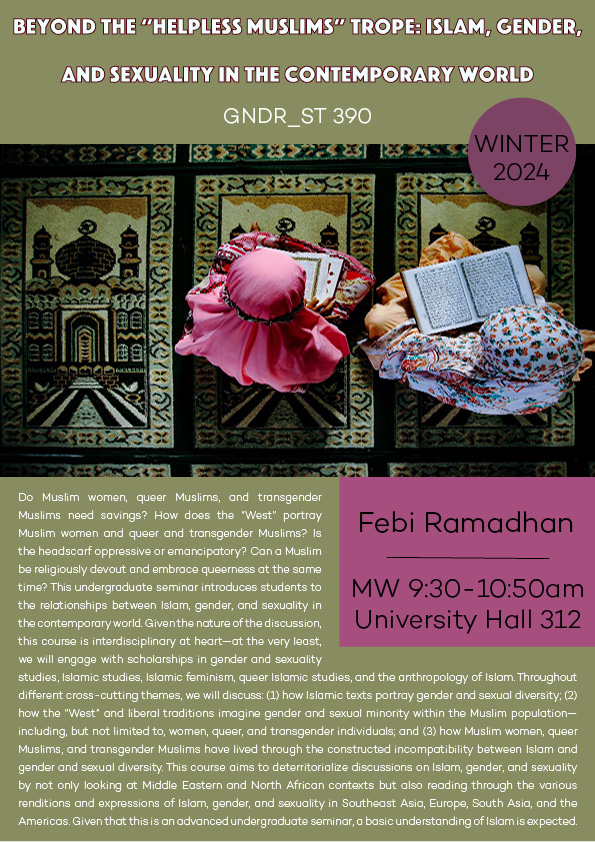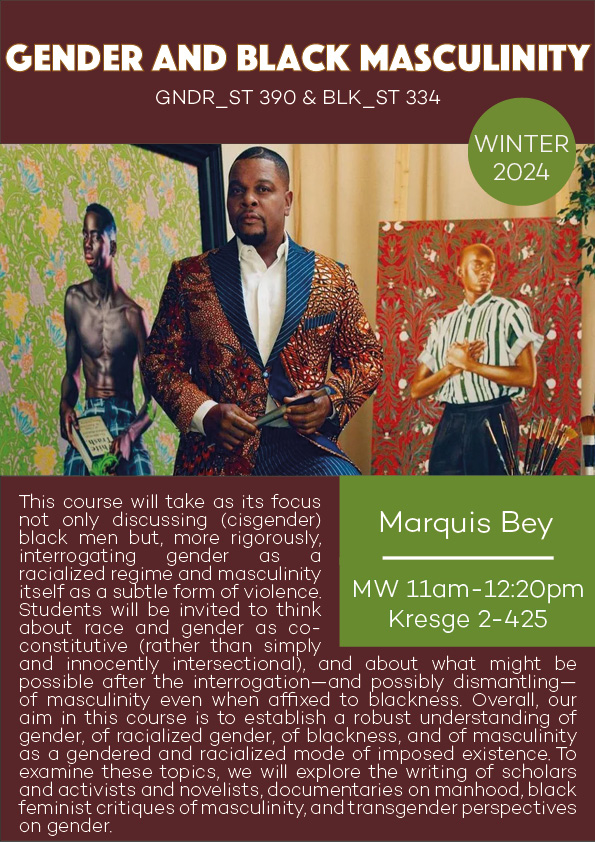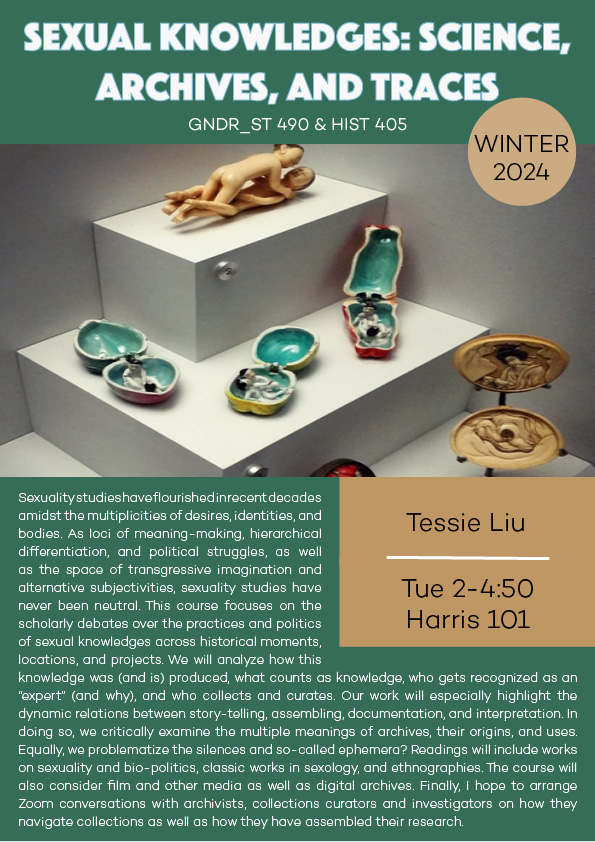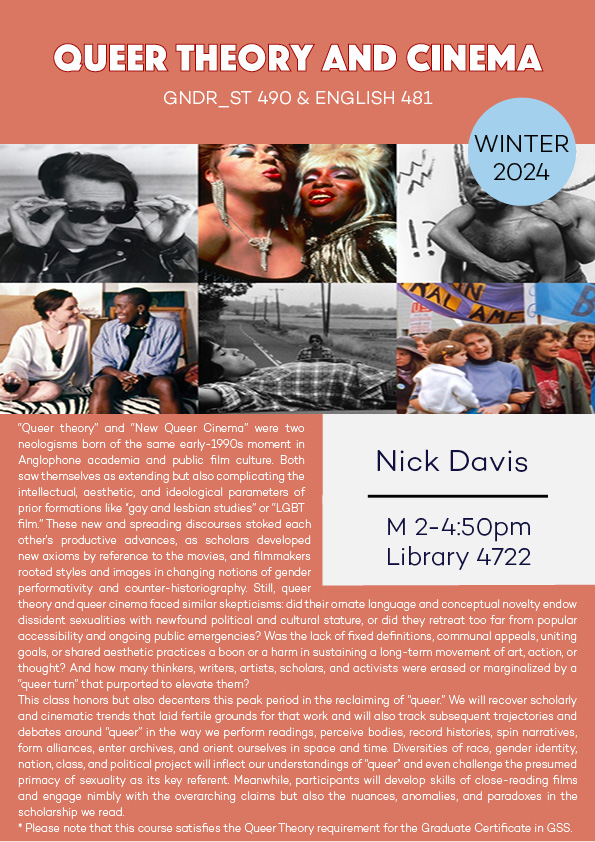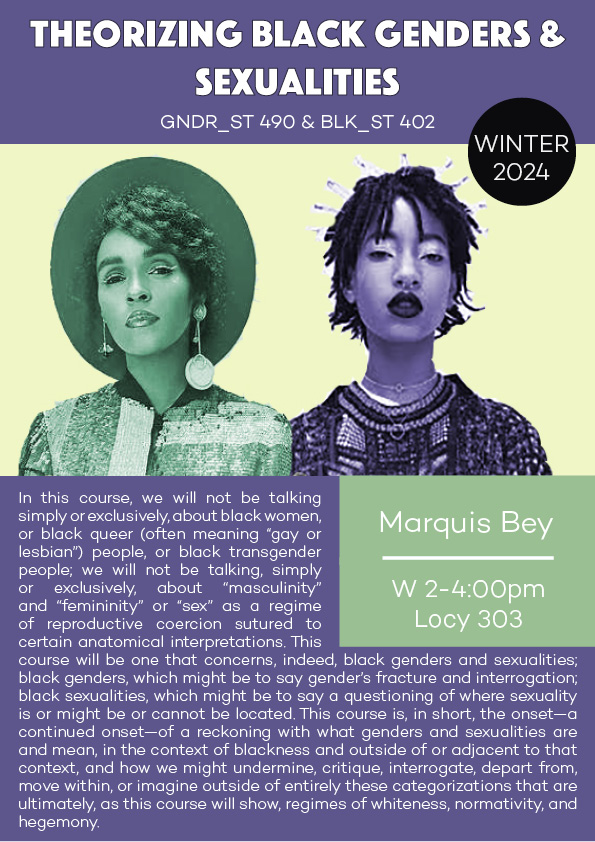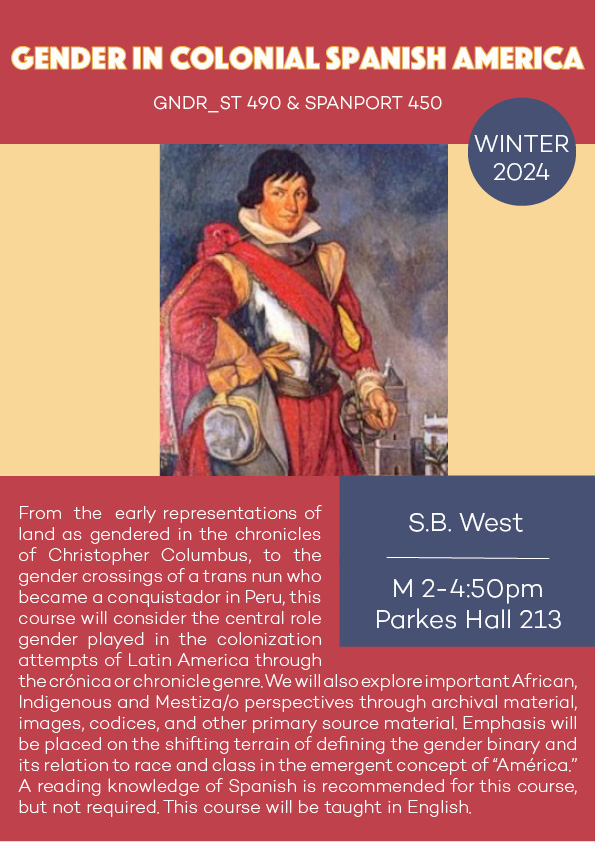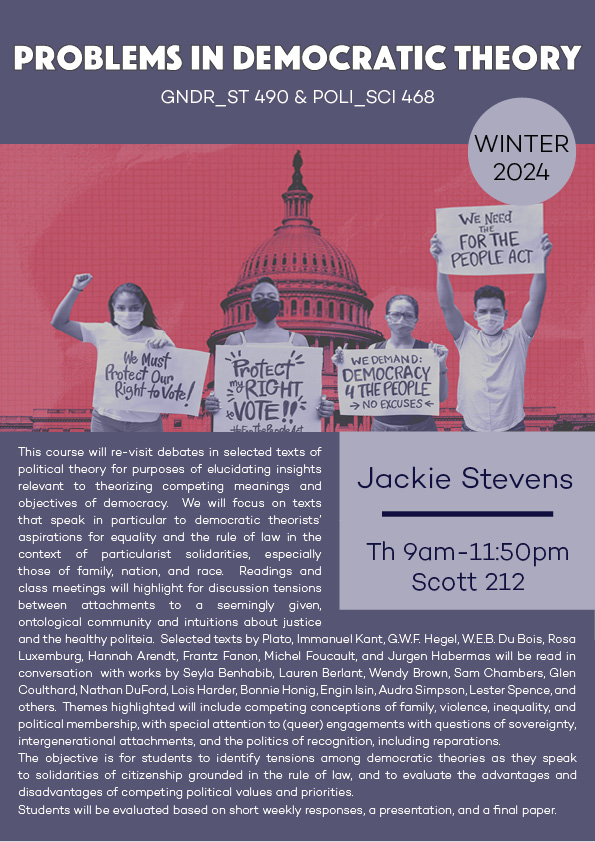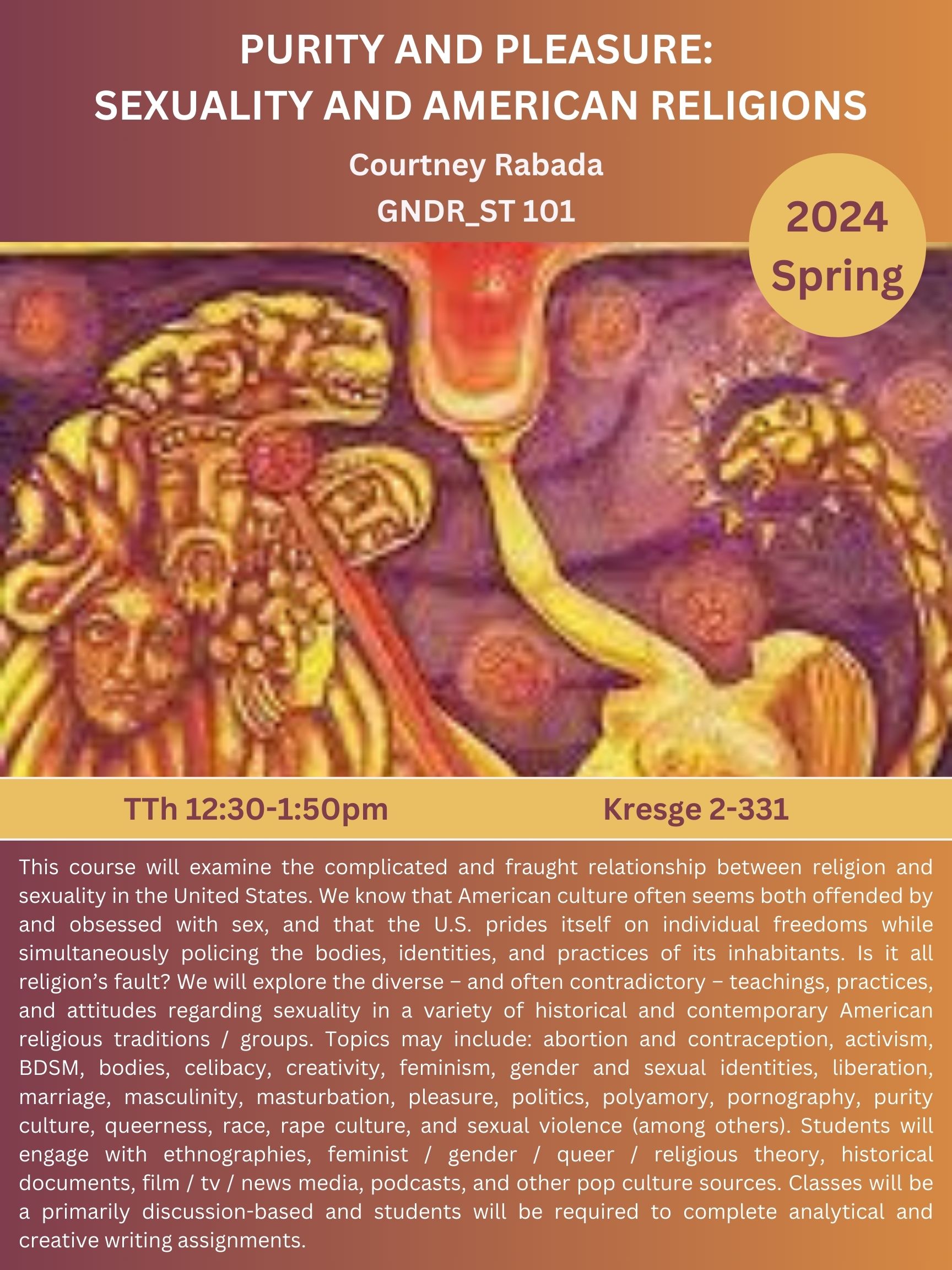 |
GNDR_ST 101-8-1: Purity and Pleasure: Sexuality and American Religions
This course will examine the complicated and fraught relationship between religion and sexuality in the United States. We know that American culture often seems both offended by and obsessed with sex, and that the U.S. prides itself on individual freedoms while simultaneously policing the bodies, identities, and practices of its inhabitants. Is it all religion’s fault? We will explore the diverse – and often contradictory – teachings, practices, and attitudes regarding sexuality in a variety of historical and contemporary American religious traditions / groups. Topics may include: abortion and contraception, activism, BDSM, bodies, celibacy, creativity, feminism, gender and sexual identities, liberation, marriage, masculinity, masturbation, pleasure, politics, polyamory, pornography, purity culture, queerness, race, rape culture, and sexual violence (among others). Students will engage with ethnographies, feminist / gender / queer / religious theory, historical documents, film / tv / news media, podcasts, and other pop culture sources. Classes will be a primarily discussion-based and students will be required to complete analytical and creative writing assignments.
|
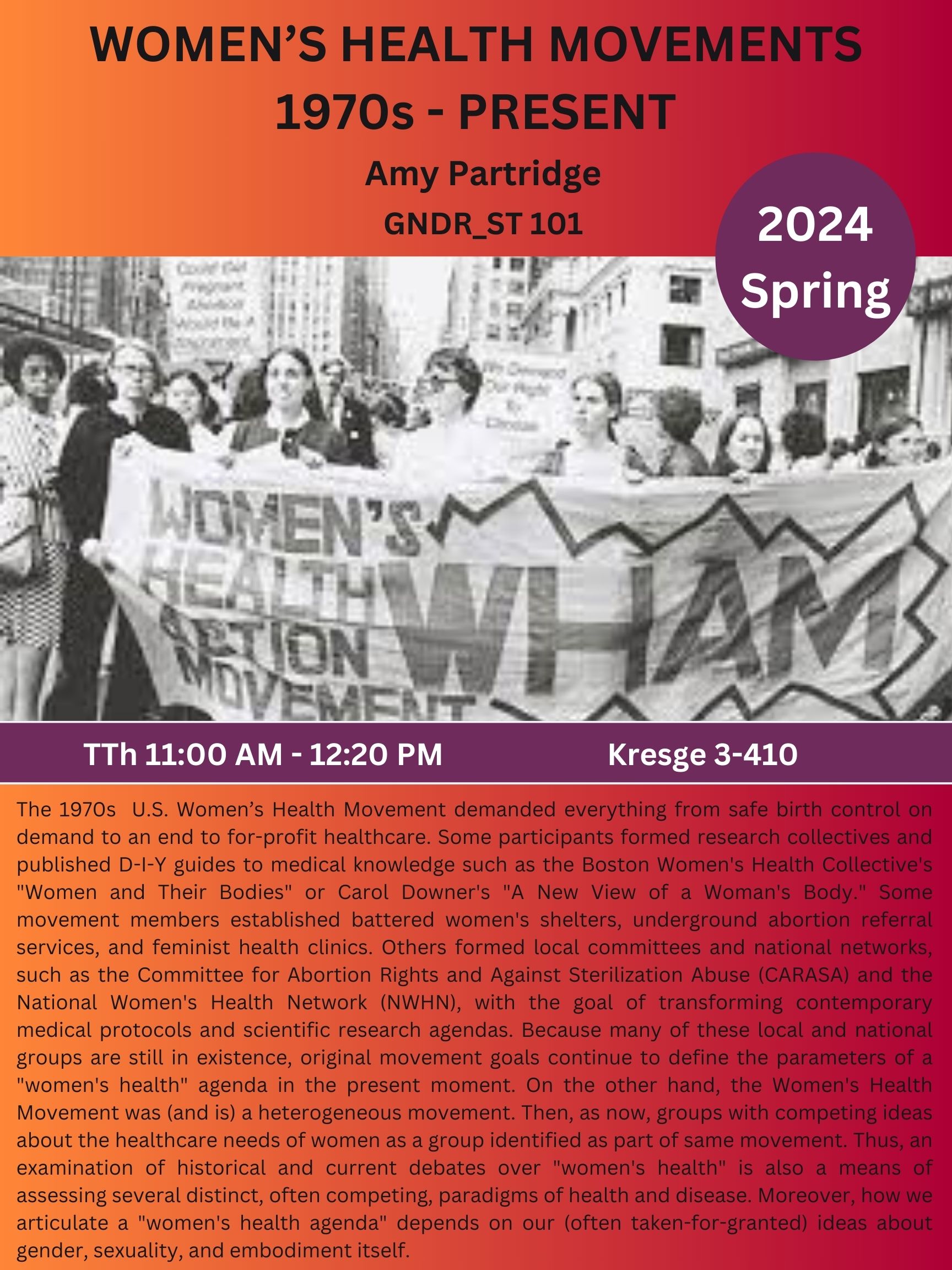 |
GNDR_ST 101-8-2: Women's Health Movements 1970s-Present
The 1970s U.S. Women’s Health Movement demanded everything from safe birth control on demand to an end to for-profit healthcare. Some participants formed research collectives and published D-I-Y guides to medical knowledge such as the Boston Women's Health Collective's "Women and Their Bodies" or Carol Downer's "A New View of a Woman's Body." Some movement members established battered women's shelters, underground abortion referral services, and feminist health clinics. Others formed local committees and national networks, such as the Committee for Abortion Rights and Against Sterilization Abuse (CARASA) and the National Women's Health Network (NWHN), with the goal of transforming contemporary medical protocols and scientific research agendas. Because many of these local and national groups are still in existence, original movement goals continue to define the parameters of a "women's health" agenda in the present moment. On the other hand, the Women's Health Movement was (and is) a heterogeneous movement. Then, as now, groups with competing ideas about the healthcare needs of women as a group identified as part of same movement. Thus, an examination of historical and current debates over "women's health" is also a means of assessing several distinct, often competing, paradigms of health and disease. Moreover, how we articulate a "women's health agenda" depends on our (often taken-for-granted) ideas about gender, sexuality, and embodiment itself.
|
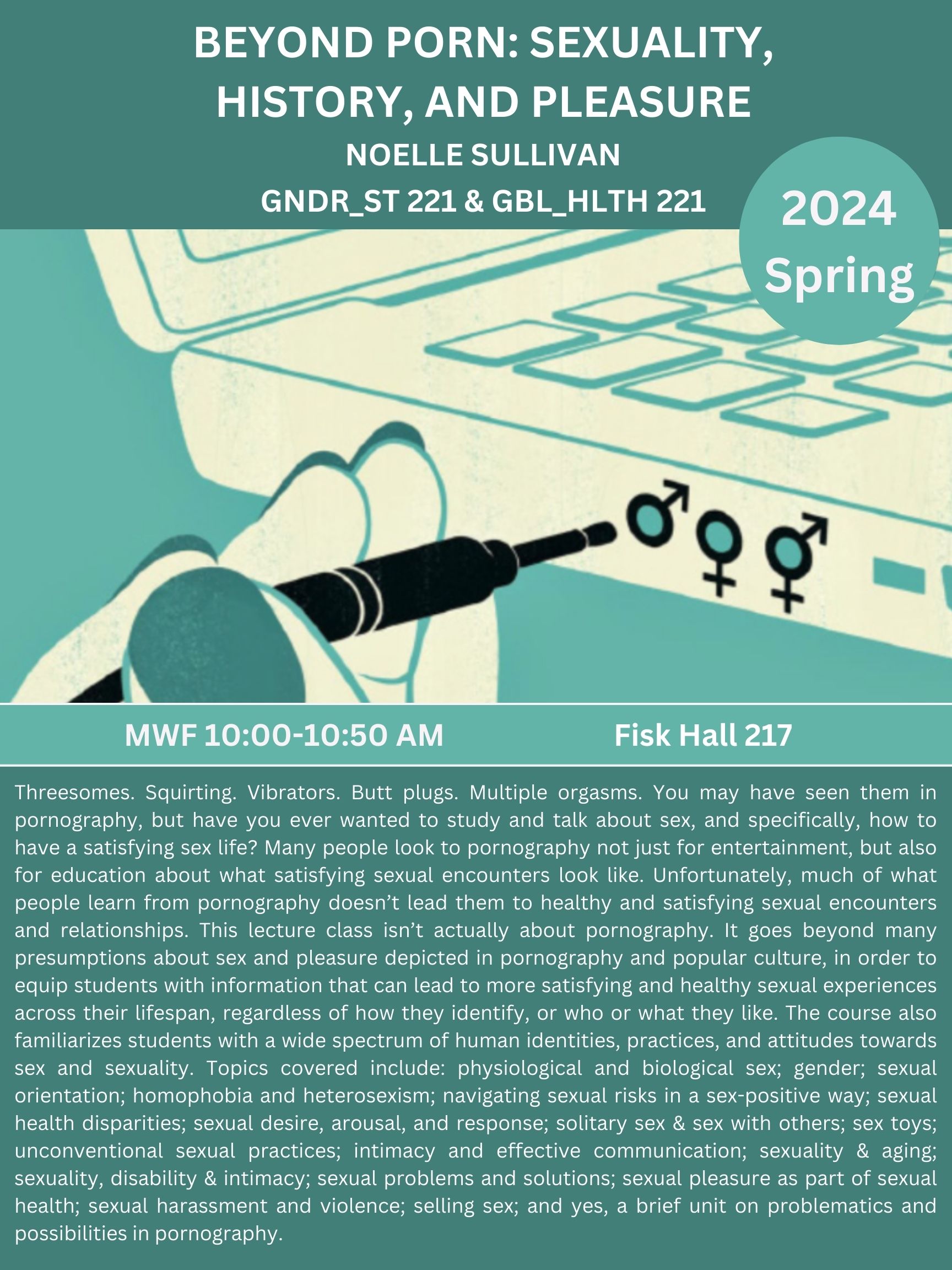 |
GNDR_ST 221/GBL_HLTH 221: Beyond Porn: Sexuality, Health & Pleasure
Threesomes. Squirting. Vibrators. Butt plugs. Multiple orgasms. You may have seen them in pornography, but have you ever wanted to study and talk about sex, and specifically, how to have a satisfying sex life? Many people look to pornography not just for entertainment, but also for education about what satisfying sexual encounters look like. Unfortunately, much of what people learn from pornography doesn’t lead them to healthy and satisfying sexual encounters and relationships. This lecture class isn’t actually about pornography. It goes beyond many presumptions about sex and pleasure depicted in pornography and popular culture, in order to equip students with information that can lead to more satisfying and healthy sexual experiences across their lifespan, regardless of how they identify, or who or what they like. The course also familiarizes students with a wide spectrum of human identities, practices, and attitudes towards sex and sexuality. Topics covered include: physiological and biological sex; gender; sexual orientation; homophobia and heterosexism; navigating sexual risks in a sex-positive way; sexual health disparities; sexual desire, arousal, and response; solitary sex & sex with others; sex toys; unconventional sexual practices; intimacy and effective communication; sexuality & aging; sexuality, disability & intimacy; sexual problems and solutions; sexual pleasure as part of sexual health; sexual harassment and violence; selling sex; and yes, a brief unit on problematics and possibilities in pornography.
|
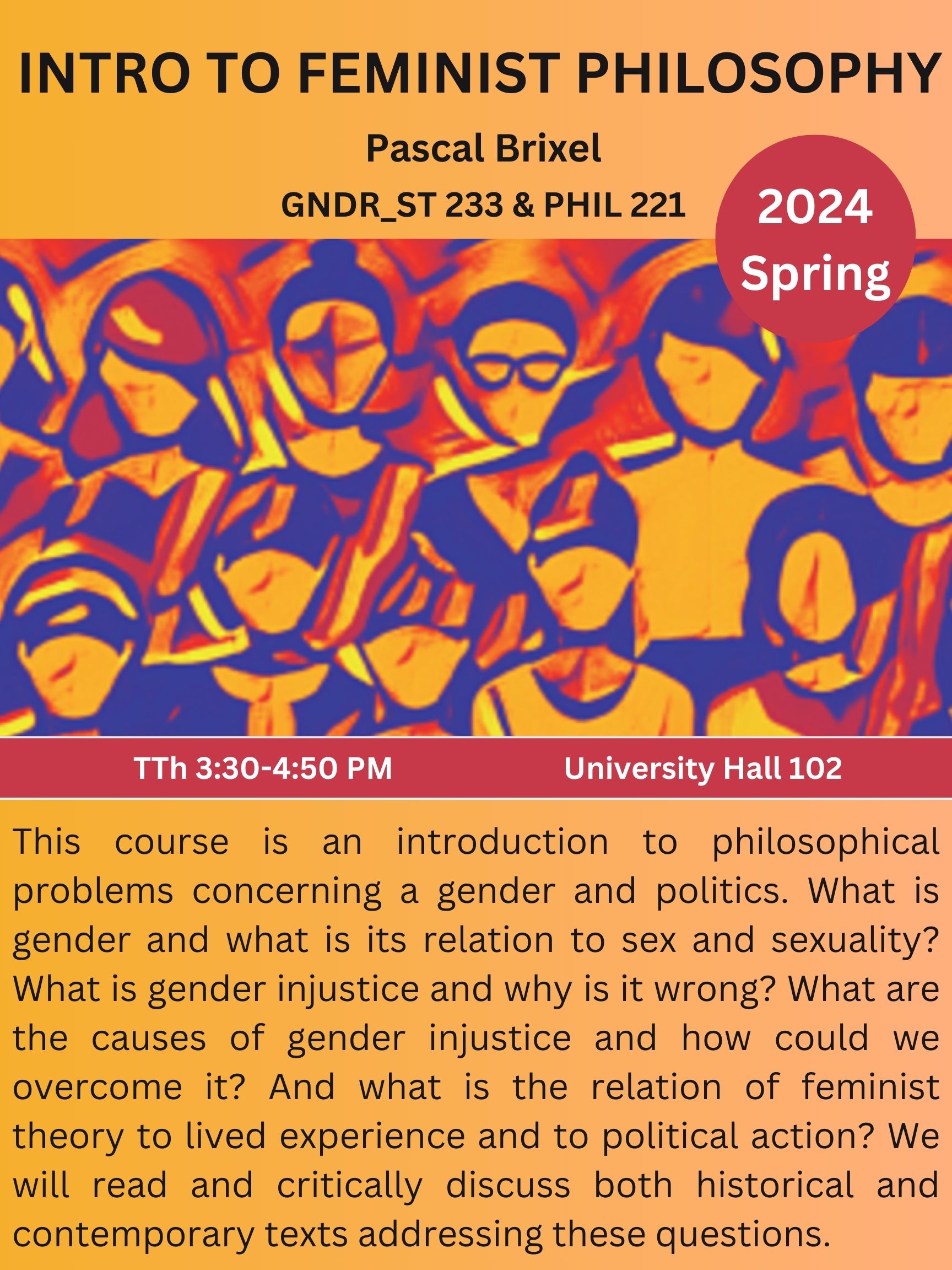 |
GNDR_ST 233/PHIL 221/COMP_LIT 205: Intro. to Feminist Philosophy
This course is an introduction to philosophical problems concerning a gender and politics. What is gender and what is its relation to sex and sexuality? What is gender injustice and why is it wrong? What are the causes of gender injustice and how could we overcome it? And what is the relation of feminist theory to lived experience and to political action? We will read and critically discuss both historical and contemporary texts addressing these questions.
|
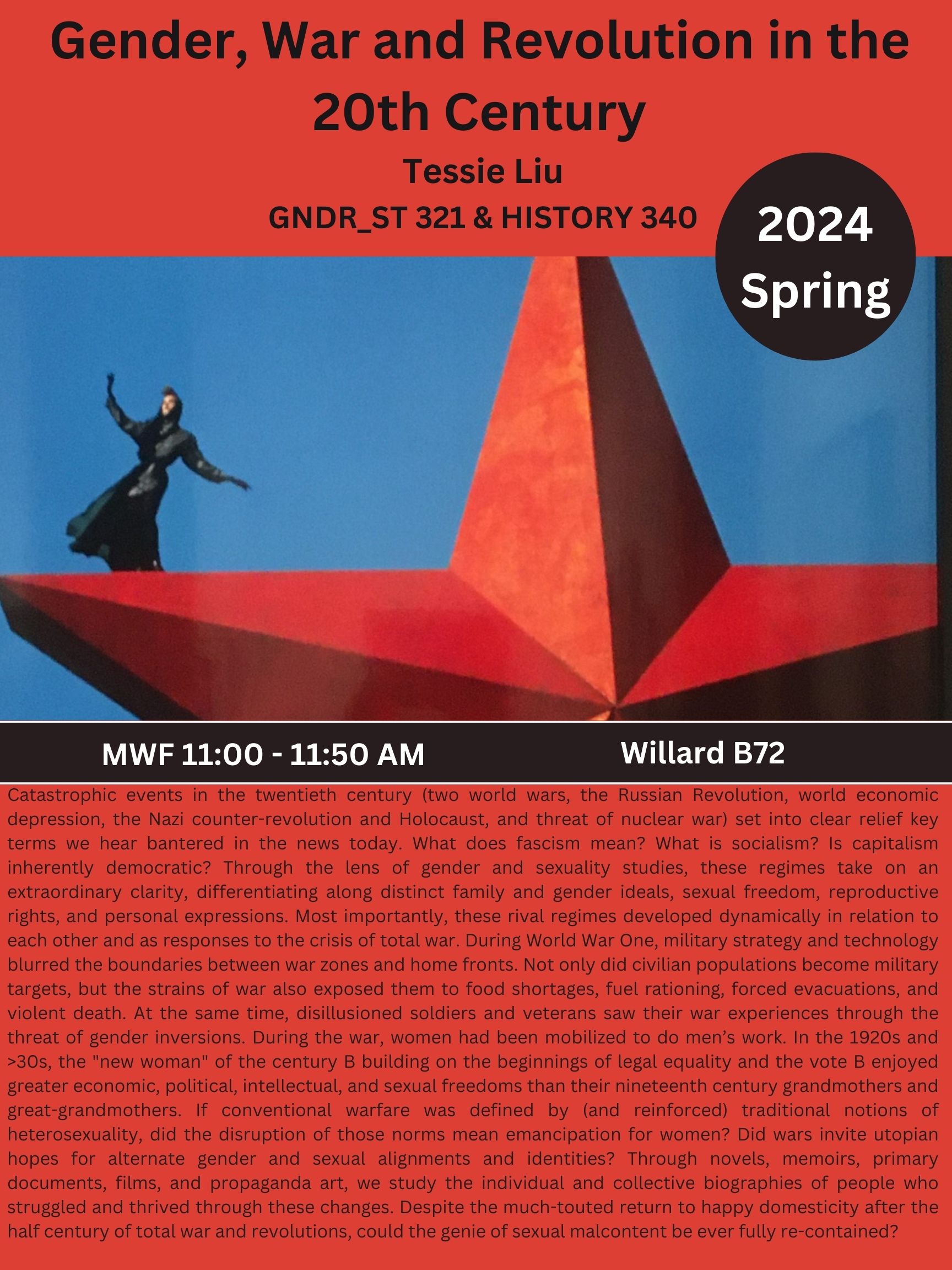 |
GNDR_ST 321-0-20/HISTORY 340: Gender, War, and Revolution In the 20th Century
Catastrophic events in the twentieth century (two world wars, the Russian Revolution, world economic depression, the Nazi counter-revolution and Holocaust, and threat of nuclear war) set into clear relief key terms we hear bantered in the news today. What does fascism mean? What is socialism? Is capitalism inherently democratic? Through the lens of gender and sexuality studies, these regimes take on an extraordinary clarity, differentiating along distinct family and gender ideals, sexual freedom, reproductive rights, and personal expressions. Most importantly, these rival regimes developed dynamically in relation to each other and as responses to the crisis of total war. During World War One, military strategy and technology blurred the boundaries between war zones and home fronts. Not only did civilian populations become military targets, but the strains of war also exposed them to food shortages, fuel rationing, forced evacuations, and violent death. At the same time, disillusioned soldiers and veterans saw their war experiences through the threat of gender inversions. During the war, women had been mobilized to do men=s work. In the 1920s and >30s, the "new woman" of the century B building on the beginnings of legal equality and the vote B enjoyed greater economic, political, intellectual, and sexual freedoms than their nineteenth century grandmothers and great-grandmothers. If conventional warfare was defined by (and reinforced) traditional notions of heterosexuality, did the disruption of those norms mean emancipation for women? Did wars invite utopian hopes for alternate gender and sexual alignments and identities? Through novels, memoirs, primary documents, films, and propaganda art, we study the individual and collective biographies of people who struggled and thrived through these changes. Despite the much-touted return to happy domesticity after the half century of total war and revolutions, could the genie of sexual malcontent be ever fully re-contained?
|
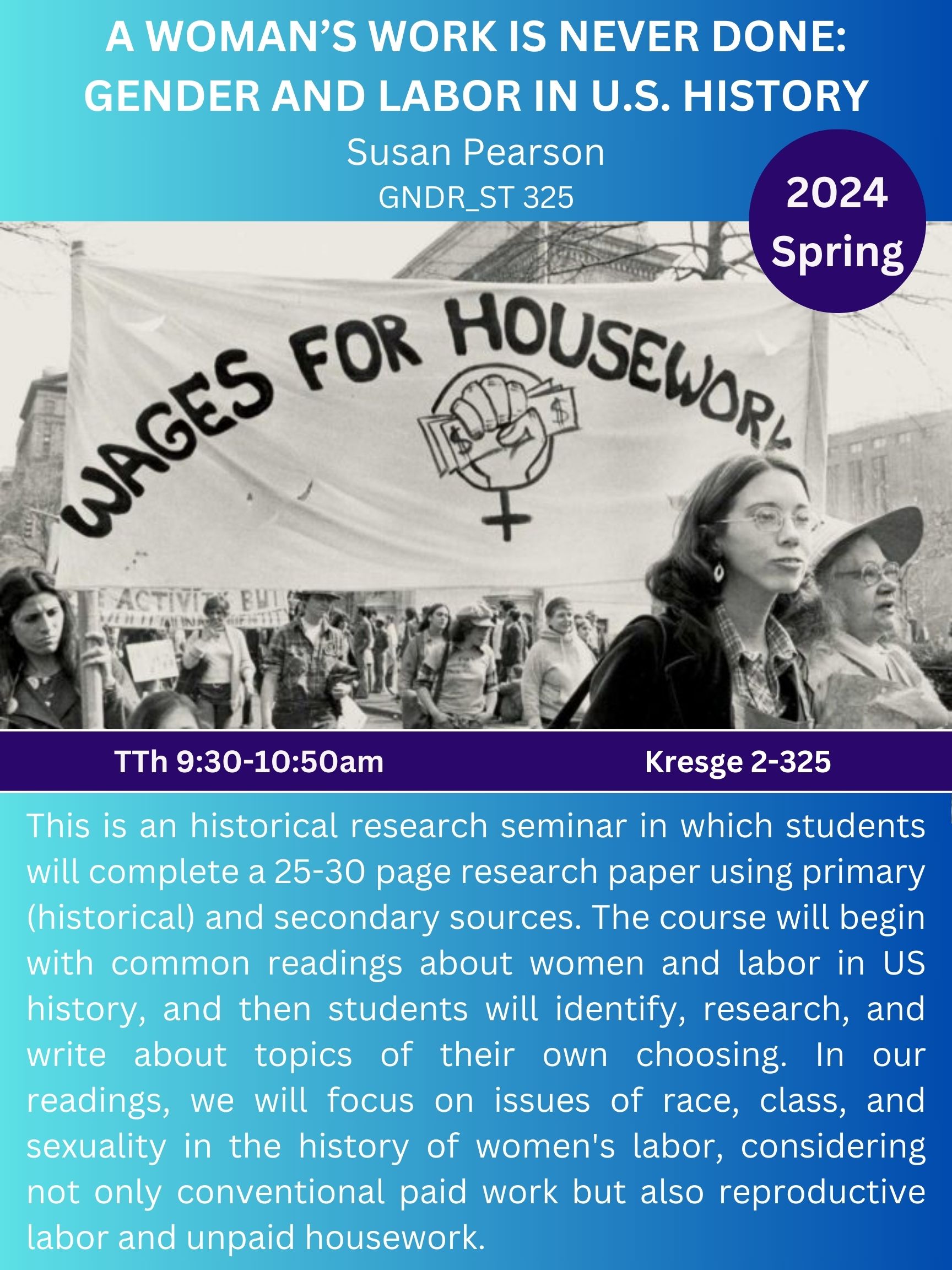 |
GNDR_ST 321-0-21/HISTORY 395: A Woman's Work is Never Done: Gender and Labor in U.S. History
This is an historical research seminar in which students will complete a 25-30 page research paper using primary (historical) and secondary sources. The course will begin with common readings about women and labor in US history, and then students will identify, research, and write about topics of their own choosing. In our readings, we will focus on issues of race, class, and sexuality in the history of women's labor, considering not only conventional paid work but also reproductive labor and unpaid housework.
|
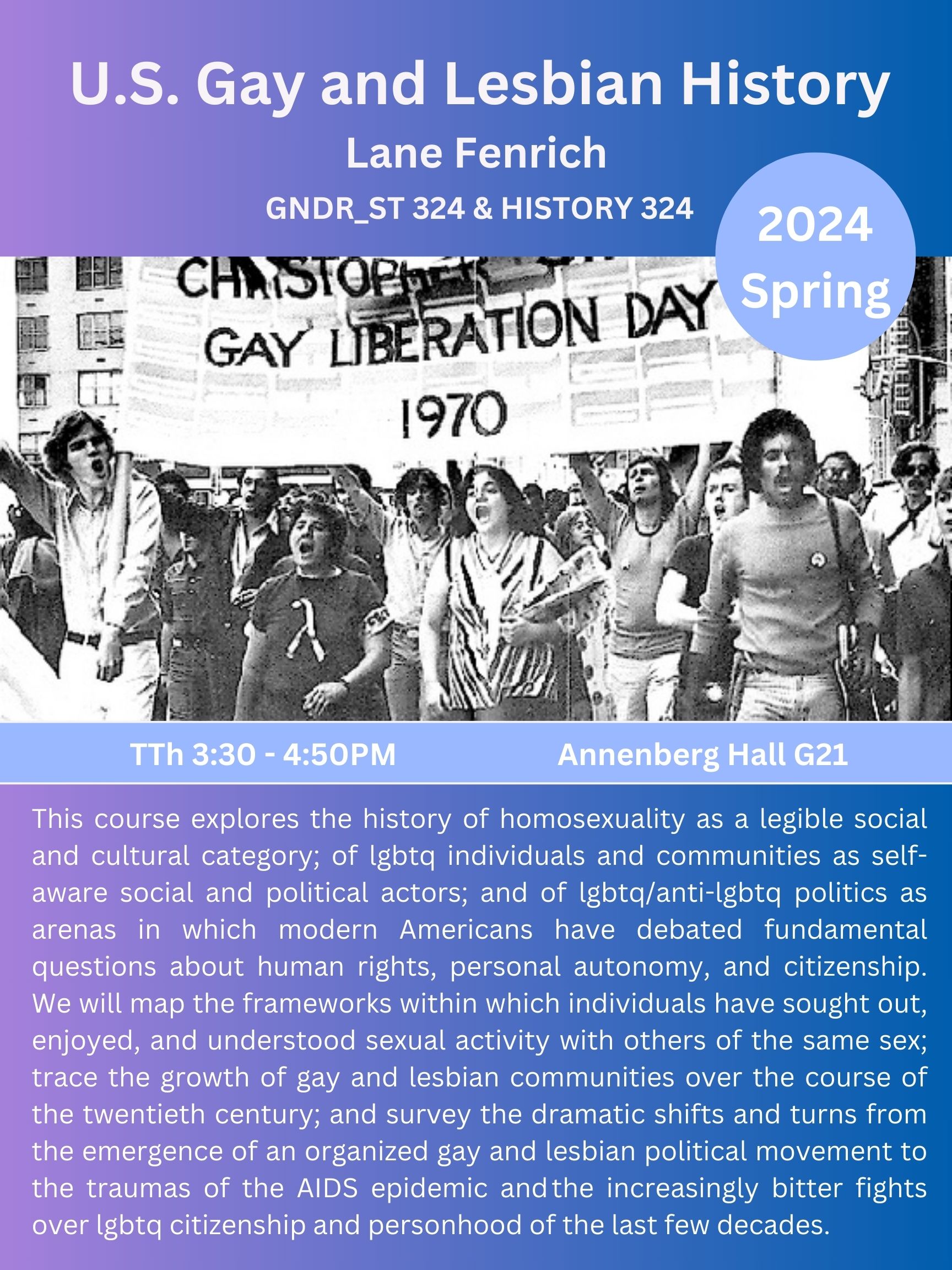 |
GNDR_ST 324/HISTORY 324: US Gay & Lesbian History
This course explores the history of homosexuality as a legible social and cultural category; of lgbtq individuals and communities as self-aware social and political actors; and of lgbtq/anti-lgbtq politics as arenas in which modern Americans have debated fundamental questions about human rights, personal autonomy, and citizenship. We will map the frameworks within which individuals have sought out, enjoyed, and understood sexual activity with others of the same sex; trace the growth of gay and lesbian communities over the course of the twentieth century; and survey the dramatic shifts and turns from the emergence of an organized gay and lesbian political movement to the traumas of the AIDS epidemic and the increasingly bitter fights over lgbtq citizenship and personhood of the last few decades.
|
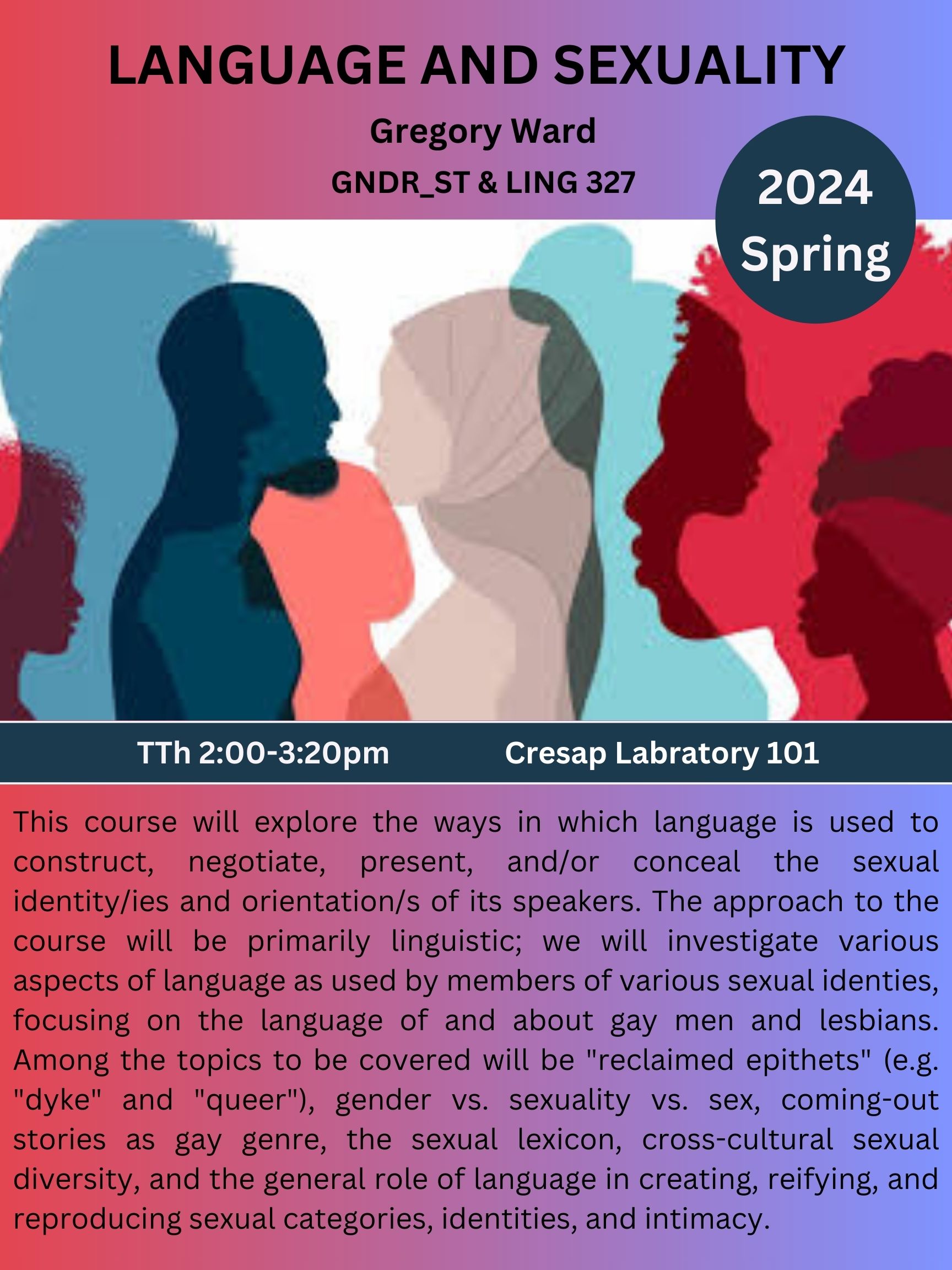 |
GNDR_ST 327/LING 327: Language & Sexuality
This course will explore the ways in which language is used to construct, negotiate, present, and/or conceal the sexual identity/ies and orientation/s of its speakers. The approach to the course will be primarily linguistic; we will investigate various aspects of language as used by members of various sexual identies, focusing on the language of and about gay men and lesbians. Among the topics to be covered will be “reclaimed epithets” (e.g. "dyke" and "queer"), gender vs. sexuality vs. sex, coming-out stories as gay genre, the sexual lexicon, cross-cultural sexual diversity, and the general role of language in creating, reifying, and reproducing sexual categories, identities, and intimacy.
|
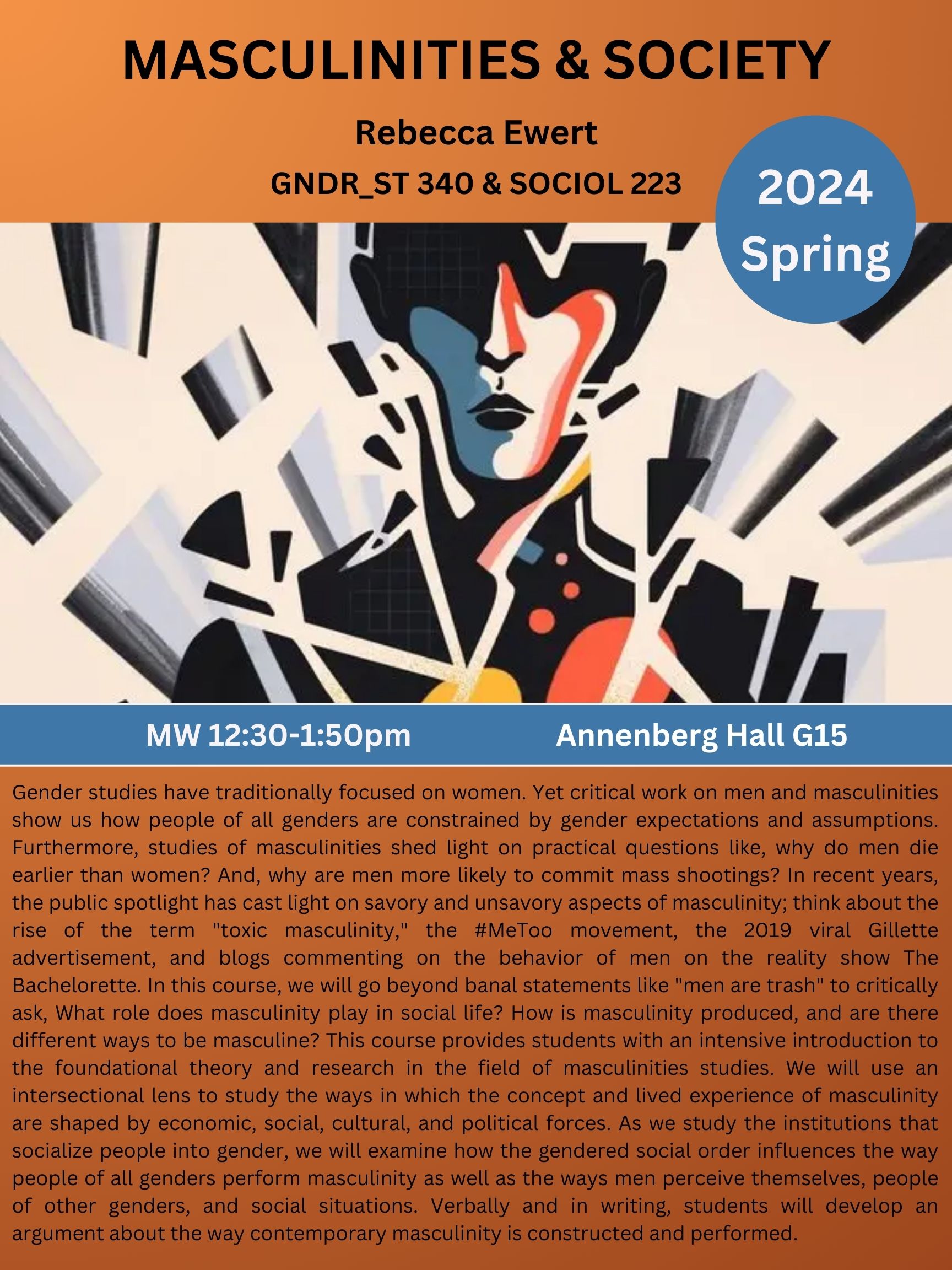 |
GNDR_ST 331/SOCIOL 223: Masculinities & Society
Gender studies have traditionally focused on women. Yet critical work on men and masculinities show us how people of all genders are constrained by gender expectations and assumptions. Furthermore, studies of masculinities shed light on practical questions like, why do men die earlier than women? And, why are men more likely to commit mass shootings? In recent years, the public spotlight has cast light on savory and unsavory aspects of masculinity; think about the rise of the term “toxic masculinity,” the #MeToo movement, the 2019 viral Gillette advertisement, and blogs commenting on the behavior of men on the reality show The Bachelorette. In this course, we will go beyond banal statements like “men are trash” to critically ask, What role does masculinity play in social life? How is masculinity produced, and are there different ways to be masculine? This course provides students with an intensive introduction to the foundational theory and research in the field of masculinities studies. We will use an intersectional lens to study the ways in which the concept and lived experience of masculinity are shaped by economic, social, cultural, and political forces. As we study the institutions that socialize people into gender, we will examine how the gendered social order influences the way people of all genders perform masculinity as well as the ways men perceive themselves, people of other genders, and social situations. Verbally and in writing, students will develop an argument about the way contemporary masculinity is constructed and performed.
|
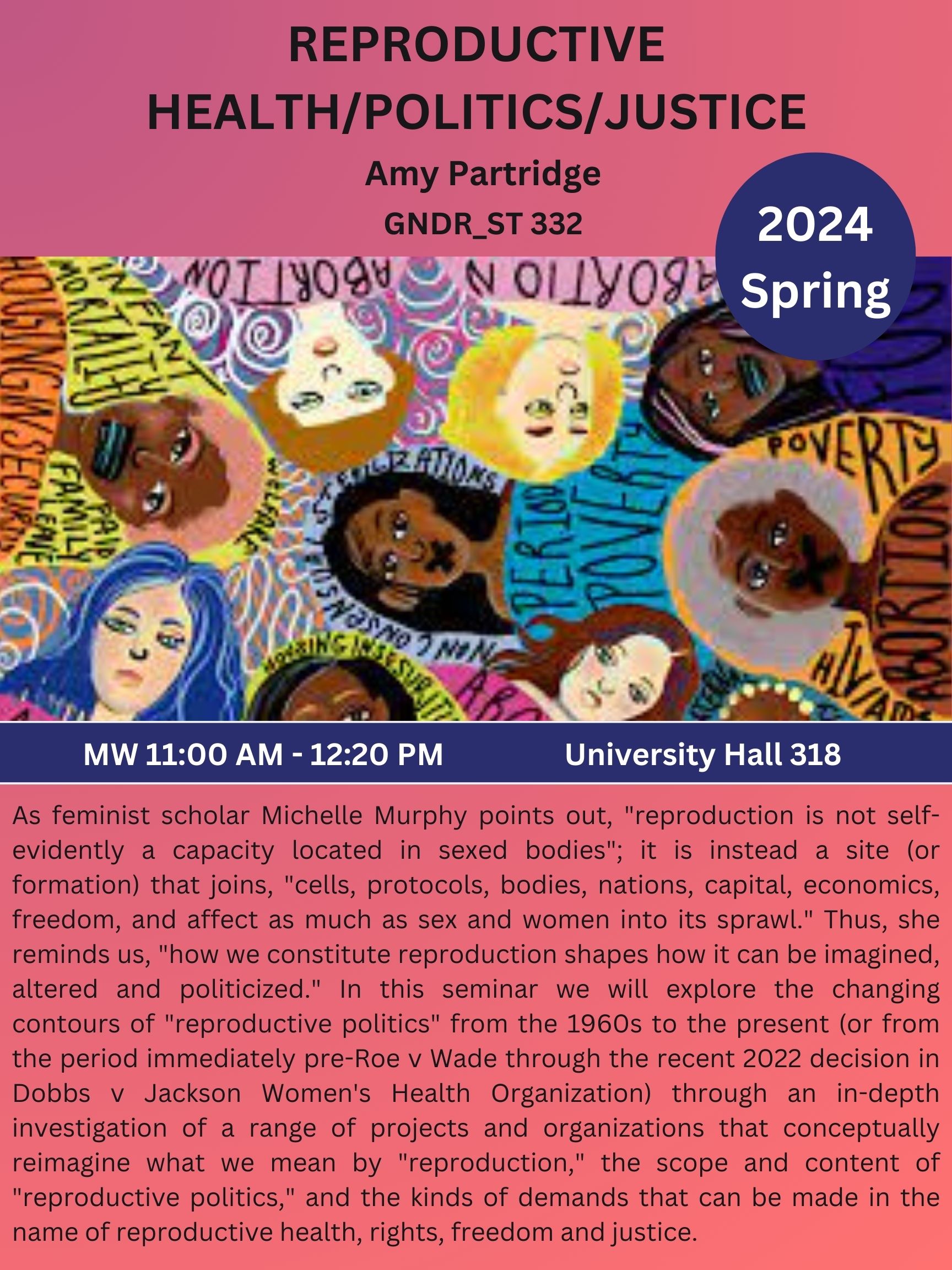 |
GNDR_ST 332-0-21: Reproductive Health/Politics/Justice
As feminist scholar Michelle Murphy points out, “reproduction is not self-evidently a capacity located in sexed bodies”; it is instead a site (or formation) that joins, “cells, protocols, bodies, nations, capital, economics, freedom, and affect as much as sex and women into its sprawl.” Thus, she reminds us, “how we constitute reproduction shapes how it can be imagined, altered and politicized.” In this seminar we will explore the changing contours of “reproductive politics” from the 1960s to the present (or from the period immediately pre-Roe v Wade through the recent 2022 decision in Dobbs v Jackson Women’s Health Organization) through an in-depth investigation of a range of projects and organizations that conceptually reimagine what we mean by “reproduction,” the scope and content of “reproductive politics,” and the kinds of demands that can be made in the name of reproductive health, rights, freedom and justice. Course Assignments: Research Assignments: Each student will research a key piece of recent legislation, contemporaneous news coverage of a key event, and select 2-3 primary source documents working with pre-selected materials in NU Special Collections to contribute to a Fall Quarter 2024 exhibition.
|
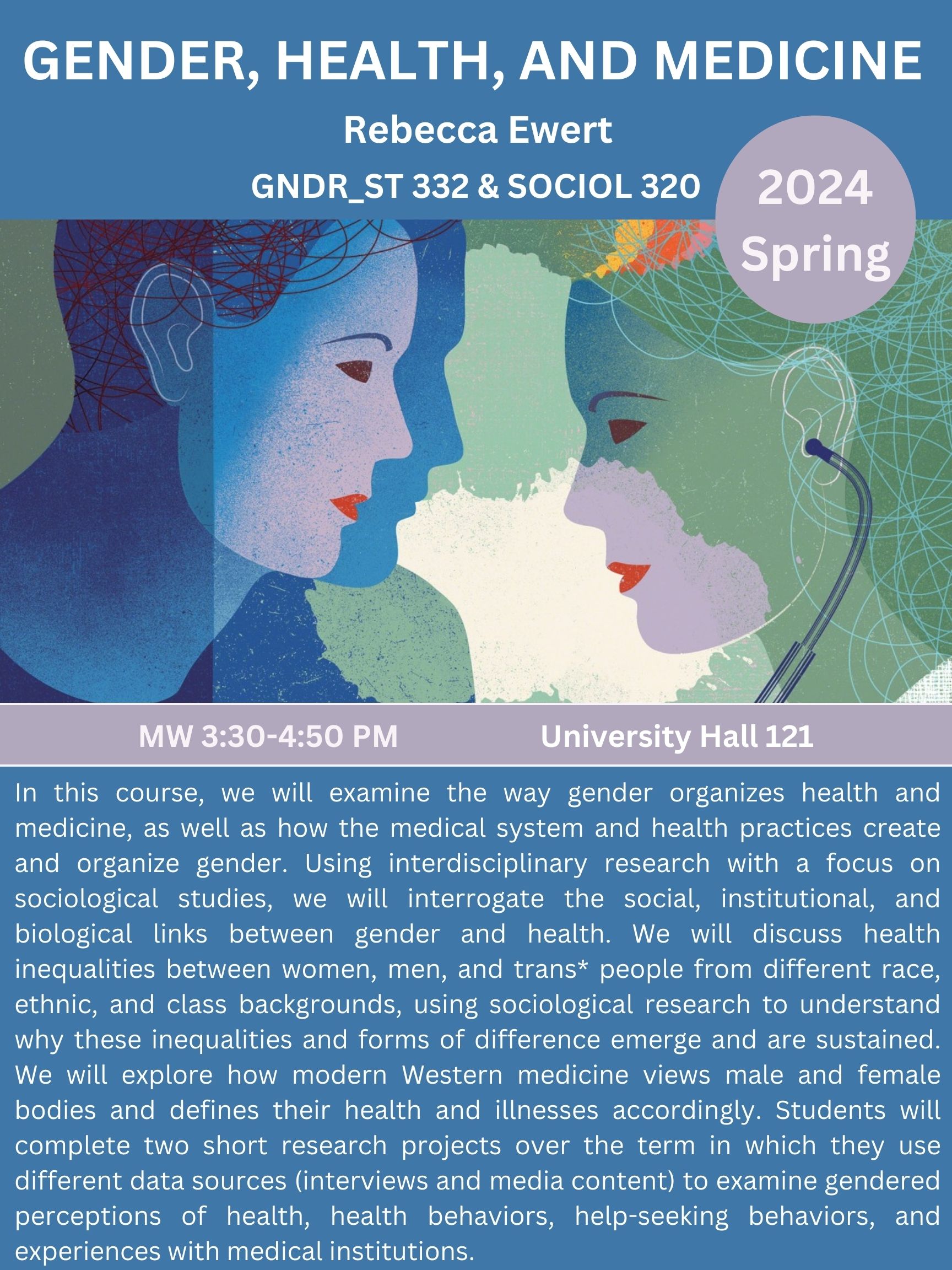 |
GNDR_ST 332-0-22/SOCIOL 376: Gender, Health, and Medicine
In this course, we will examine the way gender organizes health and medicine, as well as how the medical system and health practices create and organize gender. Using interdisciplinary research with a focus on sociological studies, we will interrogate the social, institutional, and biological links between gender and health. We will discuss health inequalities between women, men, and trans* people from different race, ethnic, and class backgrounds, using sociological research to understand why these inequalities and forms of difference emerge and are sustained. We will explore how modern Western medicine views male and female bodies and defines their health and illnesses accordingly. Students will complete two short research projects over the term in which they use different data sources (interviews and media content) to examine gendered perceptions of health, health behaviors, help-seeking behaviors, and experiences with medical institutions.
|
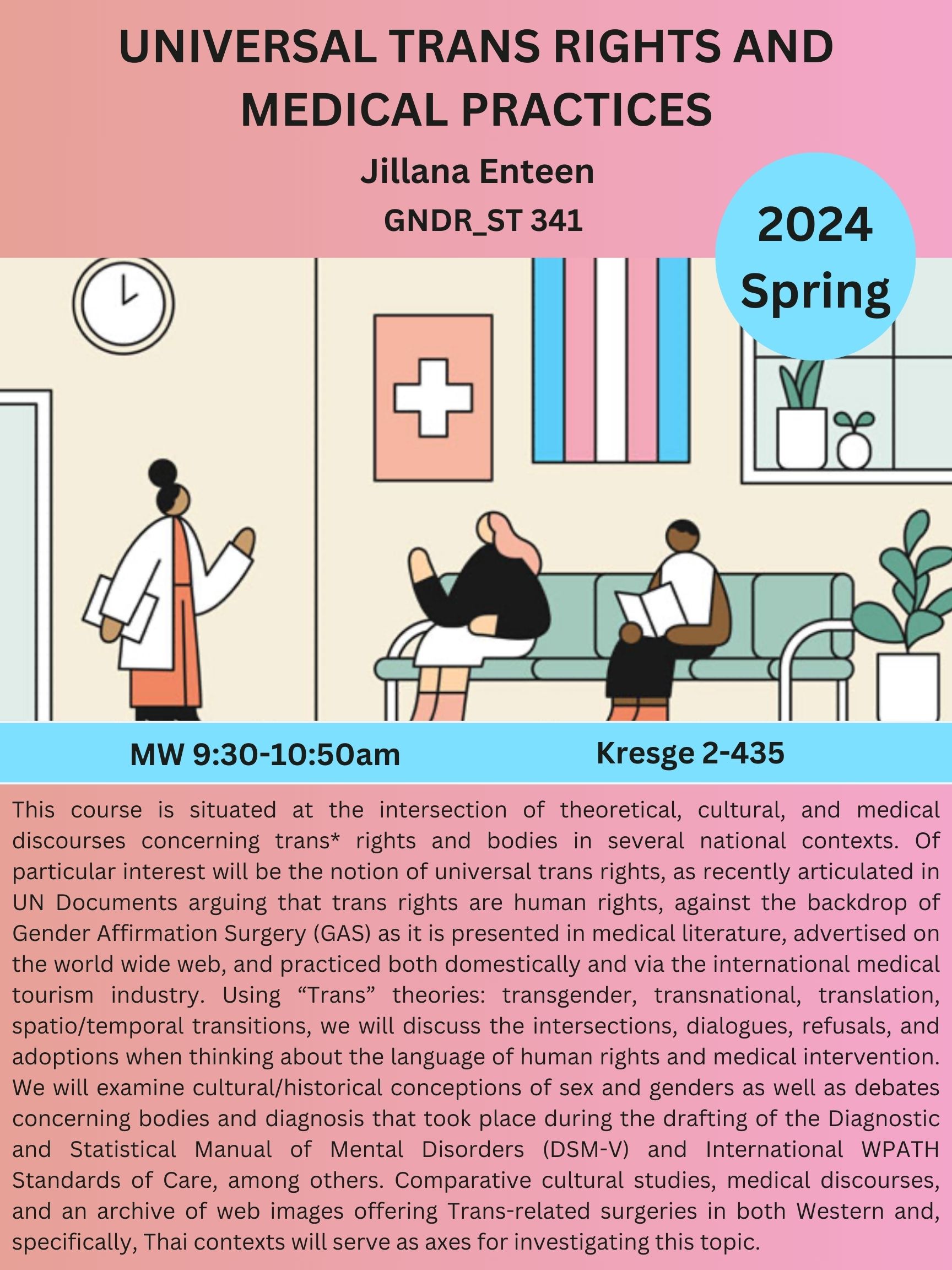 |
GNDR_ST 341: Universal Trans Rights and Medical Practices
This course is situated at the intersection of theoretical, cultural, and medical discourses concerning trans* rights and bodies in several national contexts. Of particular interest will be the notion of universal trans rights, as recently articulated in UN Documents arguing that trans rights are human rights, against the backdrop of Gender Affirmation Surgery (GAS) as it is presented in medical literature, advertised on the world wide web, and practiced both domestically and via the international medical tourism industry. Using “Trans” theories: transgender, transnational, translation, spatio/temporal transitions, we will discuss the intersections, dialogues, refusals, and adoptions when thinking about the language of human rights and medical intervention. We will examine cultural/historical conceptions of sex and genders as well as debates concerning bodies and diagnosis that took place during the drafting of the Diagnostic and Statistical Manual of Mental Disorders (DSM-V) and International WPATH Standards of Care, among others. Comparative cultural studies, medical discourses, and an archive of web images offering Trans-related surgeries in both Western and, specifically, Thai contexts will serve as axes for investigating this topic.
|
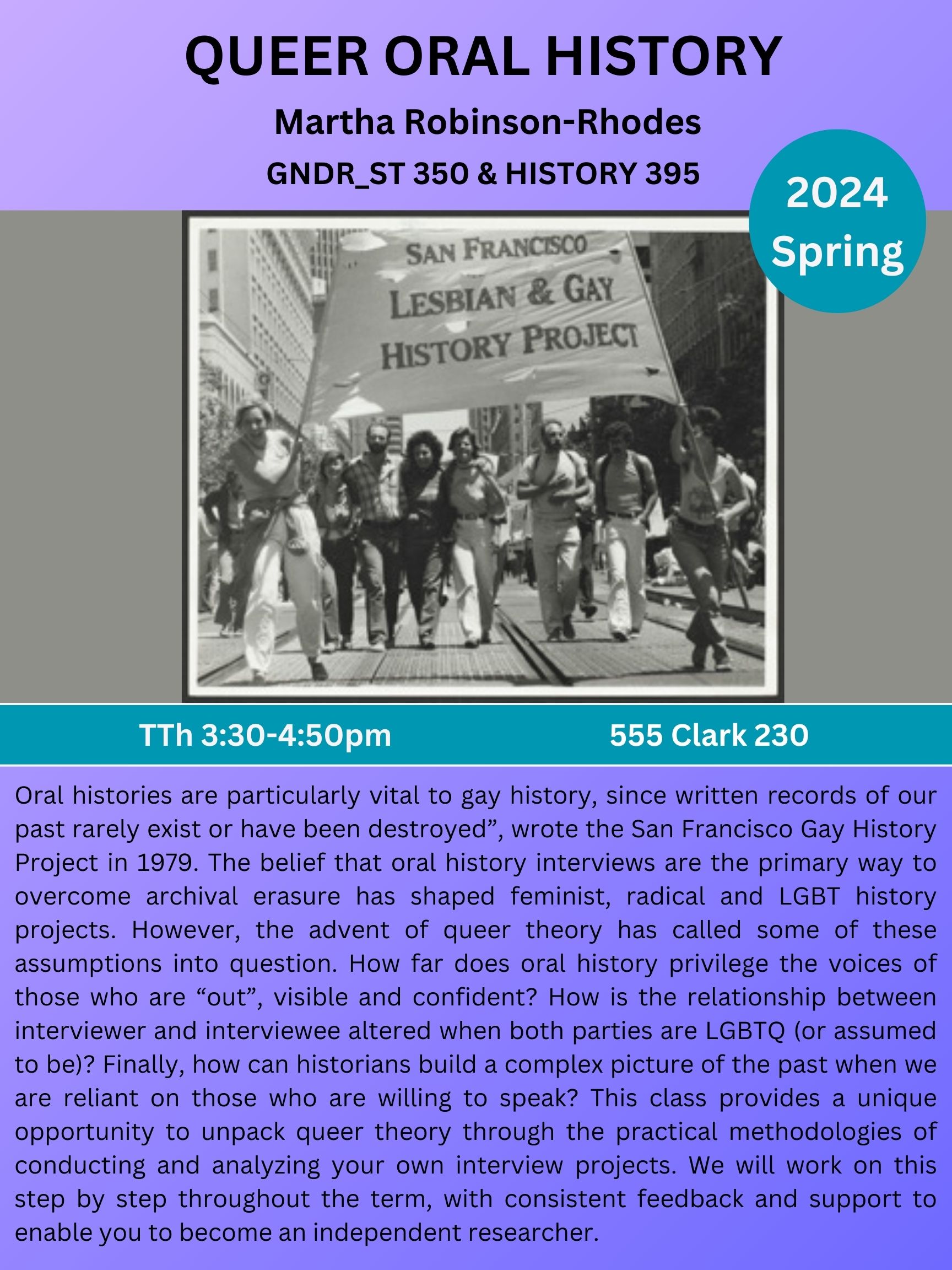 |
GNDR_ST 350/HISTORY 395: Queer Oral History
“Oral histories are particularly vital to gay history, since written records of our past rarely exist or have been destroyed”, wrote the San Francisco Gay History Project in 1979. The belief that oral history interviews are the primary way to overcome archival erasure has shaped feminist, radical and LGBT history projects. However, the advent of queer theory has called some of these assumptions into question. How far does oral history privilege the voices of those who are “out”, visible and confident? How is the relationship between interviewer and interviewee altered when both parties are LGBTQ (or assumed to be)? Finally, how can historians build a complex picture of the past when we are reliant on those who are willing to speak? This class provides a unique opportunity to unpack queer theory through the practical methodologies of conducting and analyzing your own interview projects. We will work on this step by step throughout the term, with consistent feedback and support to enable you to become an independent researcher.
|
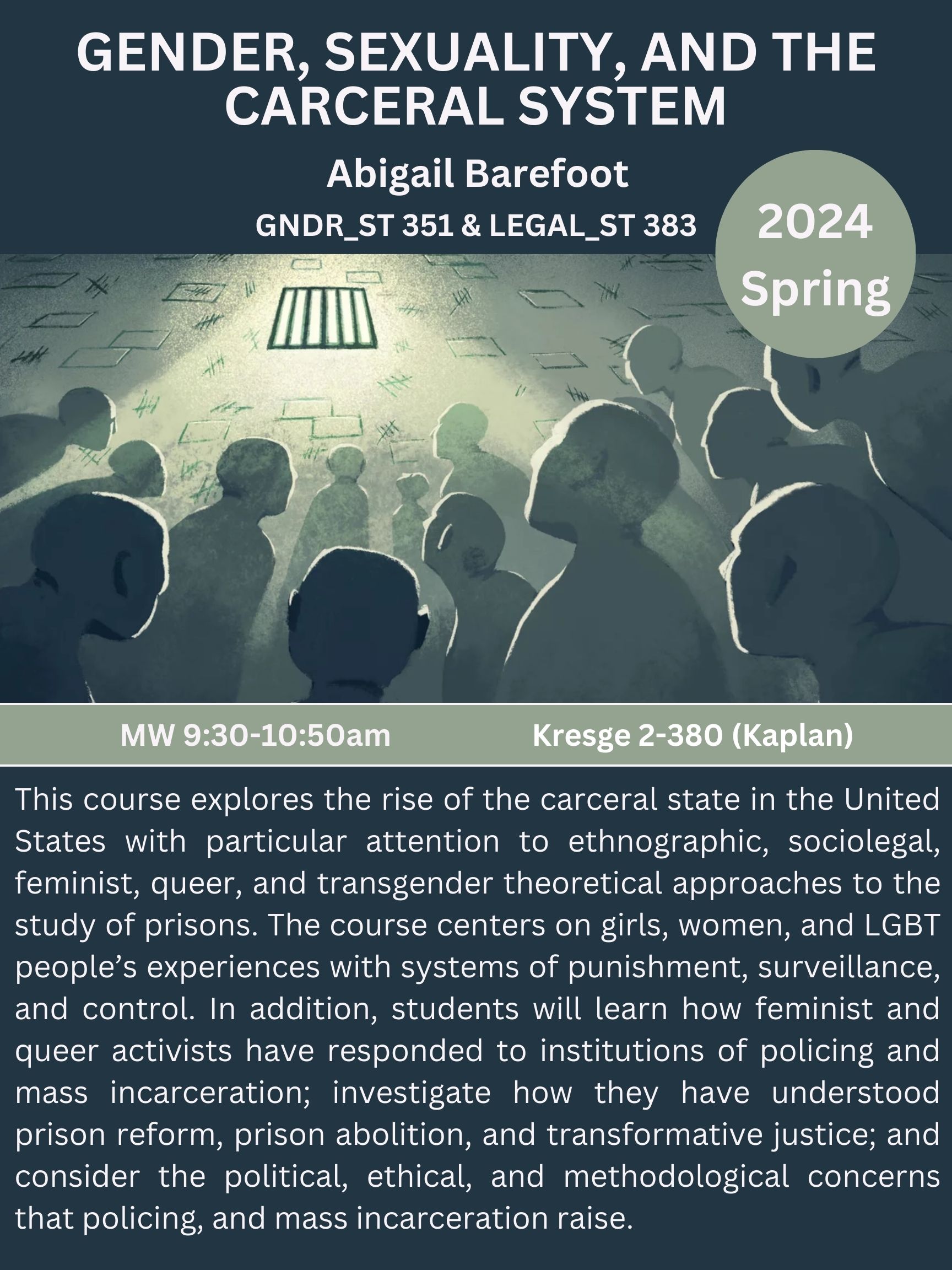 |
GNDR_ST 351/LEGAL_ST 383: Gender, Sexuality and the Carceral State
This course explores the rise of the carceral state in the United States with particular attention to ethnographic, sociolegal, feminist, queer, and transgender theoretical approaches to the study of prisons. The course centers on girls, women, and LGBT people’s experiences with systems of punishment, surveillance, and control. In addition, students will learn how feminist and queer activists have responded to institutions of policing and mass incarceration; investigate how they have understood prison reform, prison abolition, and transformative justice; and consider the political, ethical, and methodological concerns that policing, and mass incarceration raise.
|
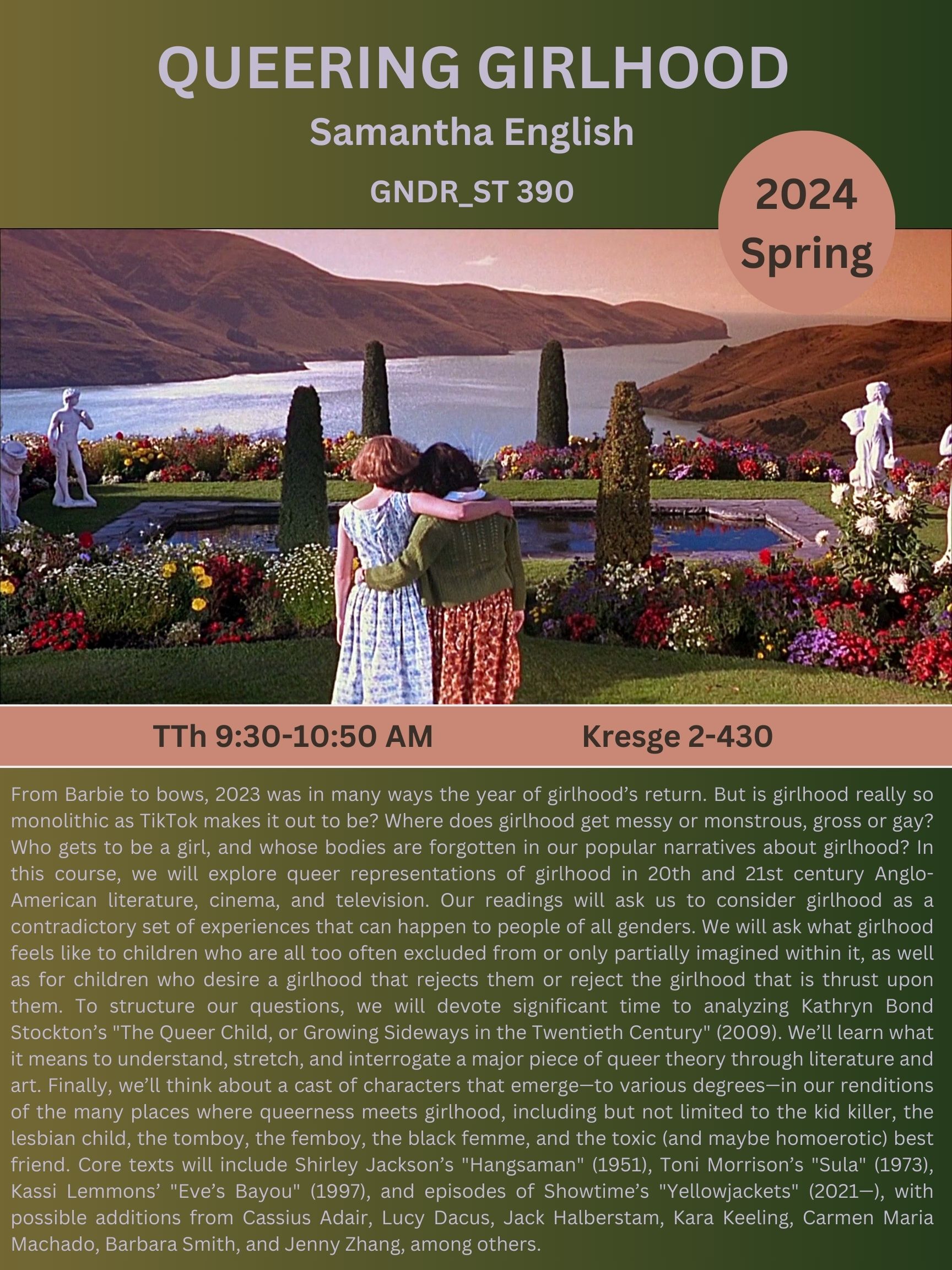 |
GNDR_ST 361: Queering Girlhood
From Barbie to bows, 2023 was in many ways the year of girlhood’s return. But is girlhood really so monolithic as TikTok makes it out to be? Where does girlhood get messy or monstrous, gross or gay? Who gets to be a girl, and whose bodies are forgotten in our popular narratives about girlhood? In this course, we will explore queer representations of girlhood in 20th and 21st century Anglo-American literature, cinema, and television. Our readings will ask us to consider girlhood as a contradictory set of experiences that can happen to people of all genders. We will ask what girlhood feels like to children who are all too often excluded from or only partially imagined within it, as well as for children who desire a girlhood that rejects them or reject the girlhood that is thrust upon them. To structure our questions, we will devote significant time to analyzing Kathryn Bond Stockton’s "The Queer Child, or Growing Sideways in the Twentieth Century" (2009). We’ll learn what it means to understand, stretch, and interrogate a major piece of queer theory through literature and art. Finally, we’ll think about a cast of characters that emerge—to various degrees—in our renditions of the many places where queerness meets girlhood, including but not limited to the kid killer, the lesbian child, the tomboy, the femboy, the black femme, and the toxic (and maybe homoerotic) best friend. Core texts will include Shirley Jackson’s "Hangsaman" (1951), Toni Morrison’s "Sula" (1973), Kassi Lemmons’ "Eve’s Bayou" (1997), and episodes of Showtime’s "Yellowjackets" (2021—), with possible additions from Cassius Adair, Lucy Dacus, Jack Halberstam, Kara Keeling, Carmen Maria Machado, Barbara Smith, and Jenny Zhang, among others.
|
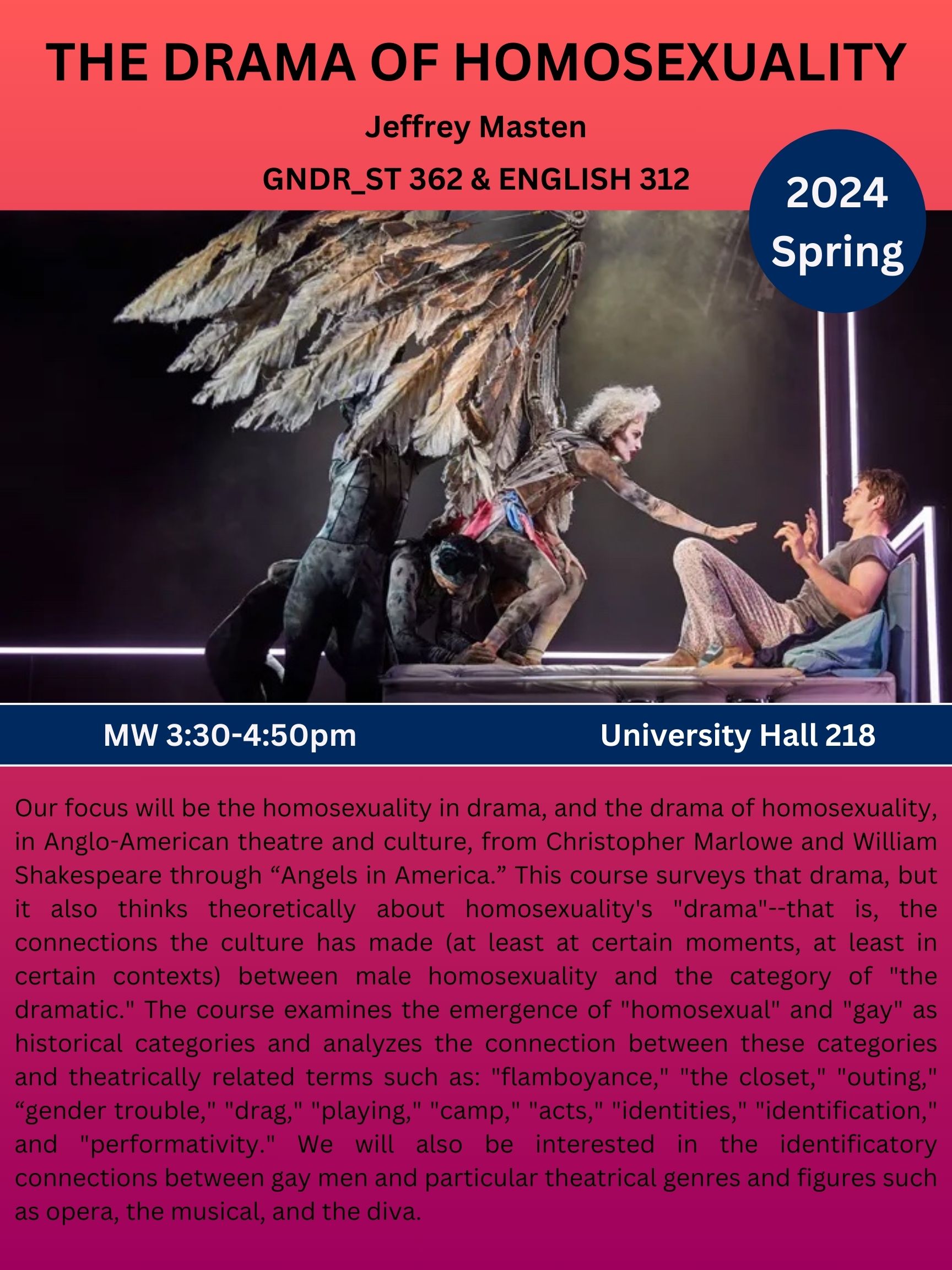 |
GNDR_362/ENGLISH 312: The Drama of Homosexuality
Our focus will be the homosexuality in drama, and the drama of homosexuality, in Anglo-American theatre and culture, from Christopher Marlowe and William Shakespeare through _Angels in America_. This course surveys that drama, but it also thinks theoretically about homosexuality's "drama"--that is, the connections the culture has made (at least at certain moments, at least in certain contexts) between male homosexuality and the category of "the dramatic." The course examines the emergence of "homosexual" and "gay" as historical categories and analyzes the connection between these categories and theatrically related terms such as: "flamboyance," "the closet," "outing," “gender trouble," "drag," "playing," "camp," "acts," "identities," "identification," and "performativity." We will also be interested in the identificatory connections between gay men and particular theatrical genres and figures such as opera, the musical, and the diva.
|
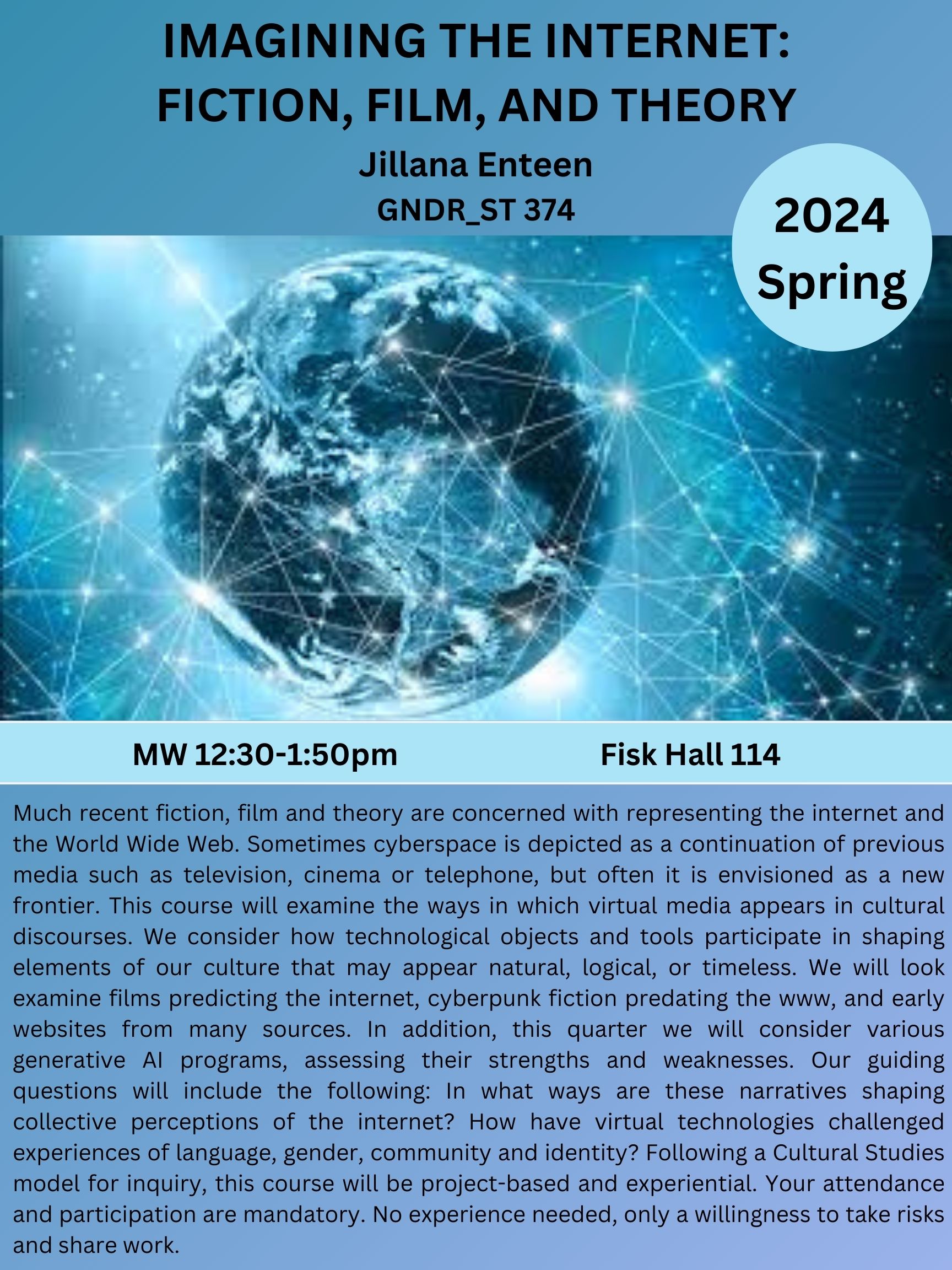 |
GNDR_374: Imagining the Internet
Much recent fiction, film and theory are concerned with representing the internet and the World Wide Web. Sometimes cyberspace is depicted as a continuation of previous media such as television, cinema or telephone, but often it is envisioned as a new frontier. This course will examine the ways in which virtual media appears in cultural discourses. We consider how technological objects and tools participate in shaping elements of our culture that may appear natural, logical, or timeless. We will look examine films predicting the internet, cyberpunk fiction predating the www, and early websites from many sources. In addition, this quarter we will consider various generative AI programs, assessing their strengths and weaknesses. Our guiding questions will include the following: In what ways are these narratives shaping collective perceptions of the internet? How have virtual technologies challenged experiences of language, gender, community and identity? Following a Cultural Studies model for inquiry, this course will be project-based and experiential. Your attendance and participation are mandatory. No experience needed, only a willingness to take risks and share work.
|
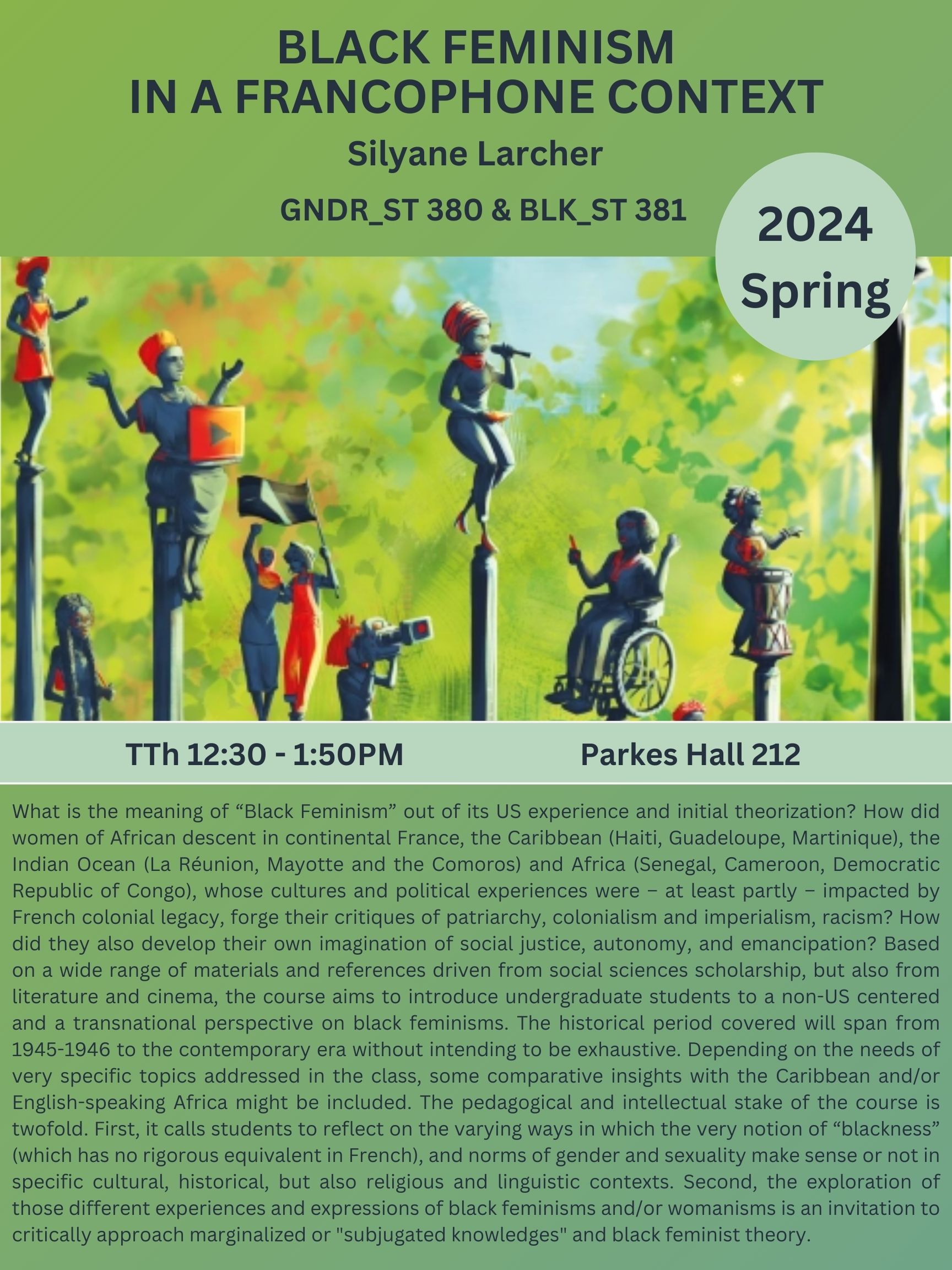 |
GNDR_ST 380/BLK_ST 381: Black Feminisms in a Francophone context. From World War II to contemporary period
What is the meaning of “Black Feminism” out of its US experience and initial theorization? How did women of African descent in continental France, the Caribbean (Haiti, Guadeloupe, Martinique), the Indian Ocean (La Réunion, Mayotte and the Comoros) and Africa (Senegal, Cameroon, Democratic Republic of Congo), whose cultures and political experiences were – at least partly – impacted by French colonial legacy, forge their critiques of patriarchy, colonialism and imperialism, racism? How did they also develop their own imagination of social justice, autonomy, and emancipation? Based on a wide range of materials and references driven from social sciences scholarship, but also from literature and cinema, the course aims to introduce undergraduate students to a non-US centered and a transnational perspective on black feminisms. The historical period covered will span from 1945-1946 to the contemporary era without intending to be exhaustive. Depending on the needs of very specific topics addressed in the class, some comparative insights with the Caribbean and/or English-speaking Africa might be included. The pedagogical and intellectual stake of the course is twofold. First, it calls students to reflect on the varying ways in which the very notion of “blackness” (which has no rigorous equivalent in French), and norms of gender and sexuality make sense or not in specific cultural, historical, but also religious and linguistic contexts. Second, the exploration of those different experiences and expressions of black feminisms and/or womanisms is an invitation to critically approach marginalized or "subjugated knowledges" and black feminist theory.
|
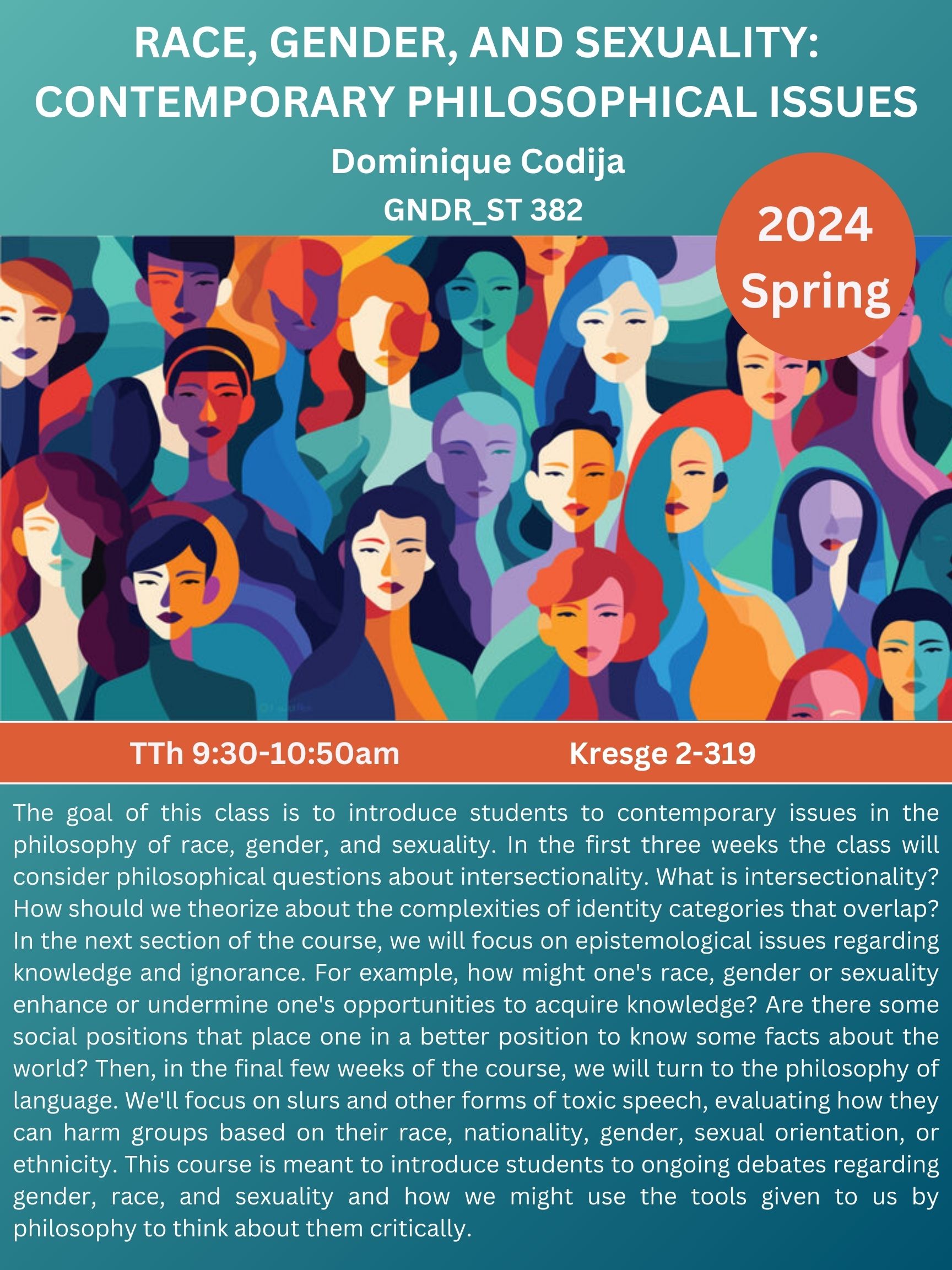 |
GNDR_ST 382: Race, Gender, and Sexuality: Contemporary Philosophical Issues
The goal of this class is to introduce students to contemporary issues in the philosophy of race, gender, and sexuality. In the first three weeks the class will consider philosophical questions about intersectionality. What is intersectionality? How should we theorize about the complexities of identity categories that overlap? In the next section of the course, we will focus on epistemological issues regarding knowledge and ignorance. For example, how might one’s race, gender or sexuality enhance or undermine one’s opportunities to acquire knowledge? Are there some social positions that place one in a better position to know some facts about the world? Then, in the final few weeks of the course, we will turn to the philosophy of language. We’ll focus on slurs and other forms of toxic speech, evaluating how they can harm groups based on their race, nationality, gender, sexual orientation, or ethnicity. This course is meant to introduce students to ongoing debates regarding gender, race, and sexuality and how we might use the tools given to us by philosophy to think about them critically.
|
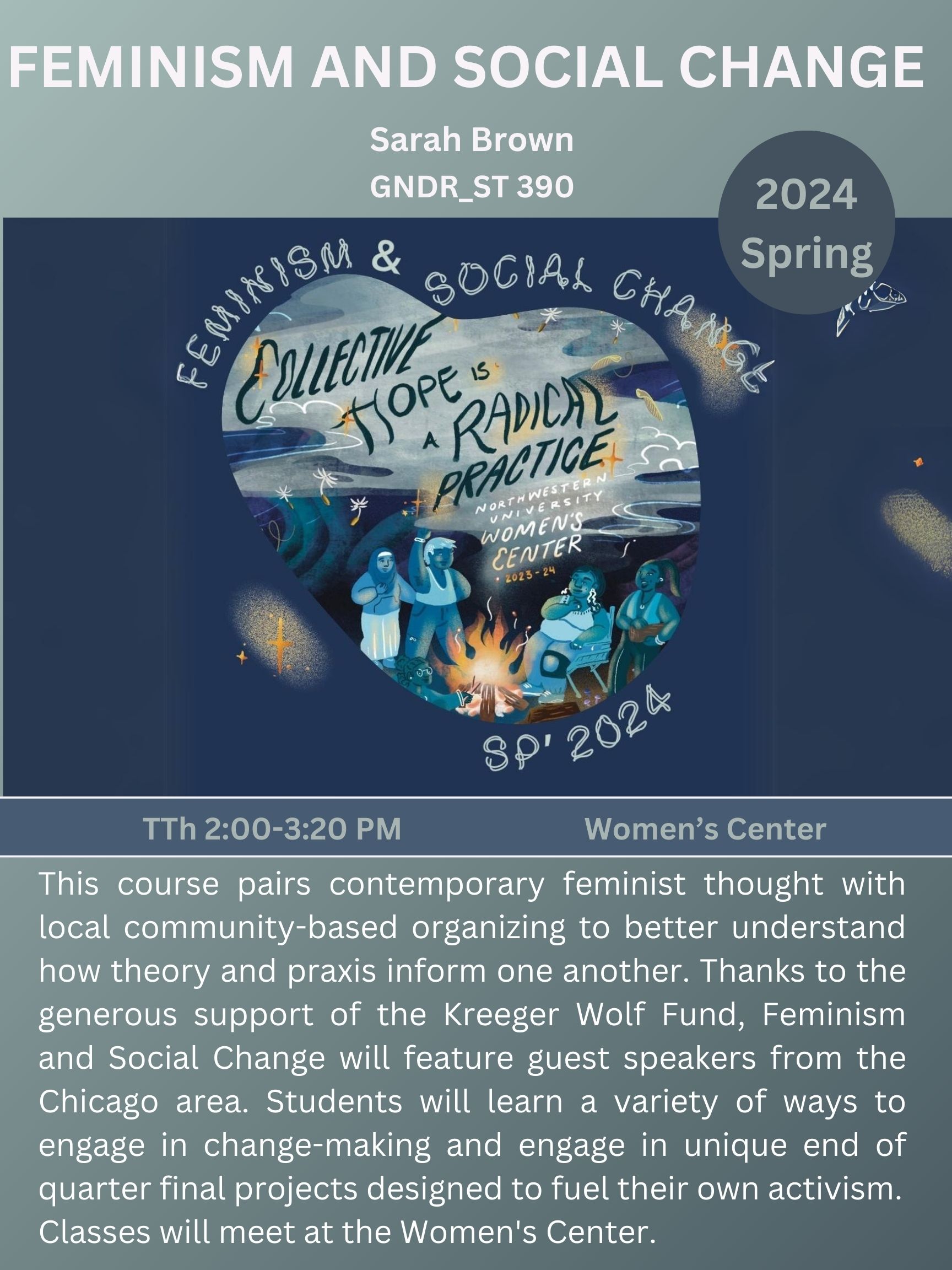 |
GNDR_ST 390-0-21: Feminism and Social Change
This course pairs contemporary feminist thought with local community-based organizing to better understand how theory and praxis inform one another. Thanks to the generous support of the Kreeger Wolf Fund, Feminism and Social Change will feature guest speakers from the Chicago area. Students will learn a variety of ways to engage in change-making and engage in unique end of quarter final projects designed to fuel their own activism. Classes will meet at the Women's Center.
|
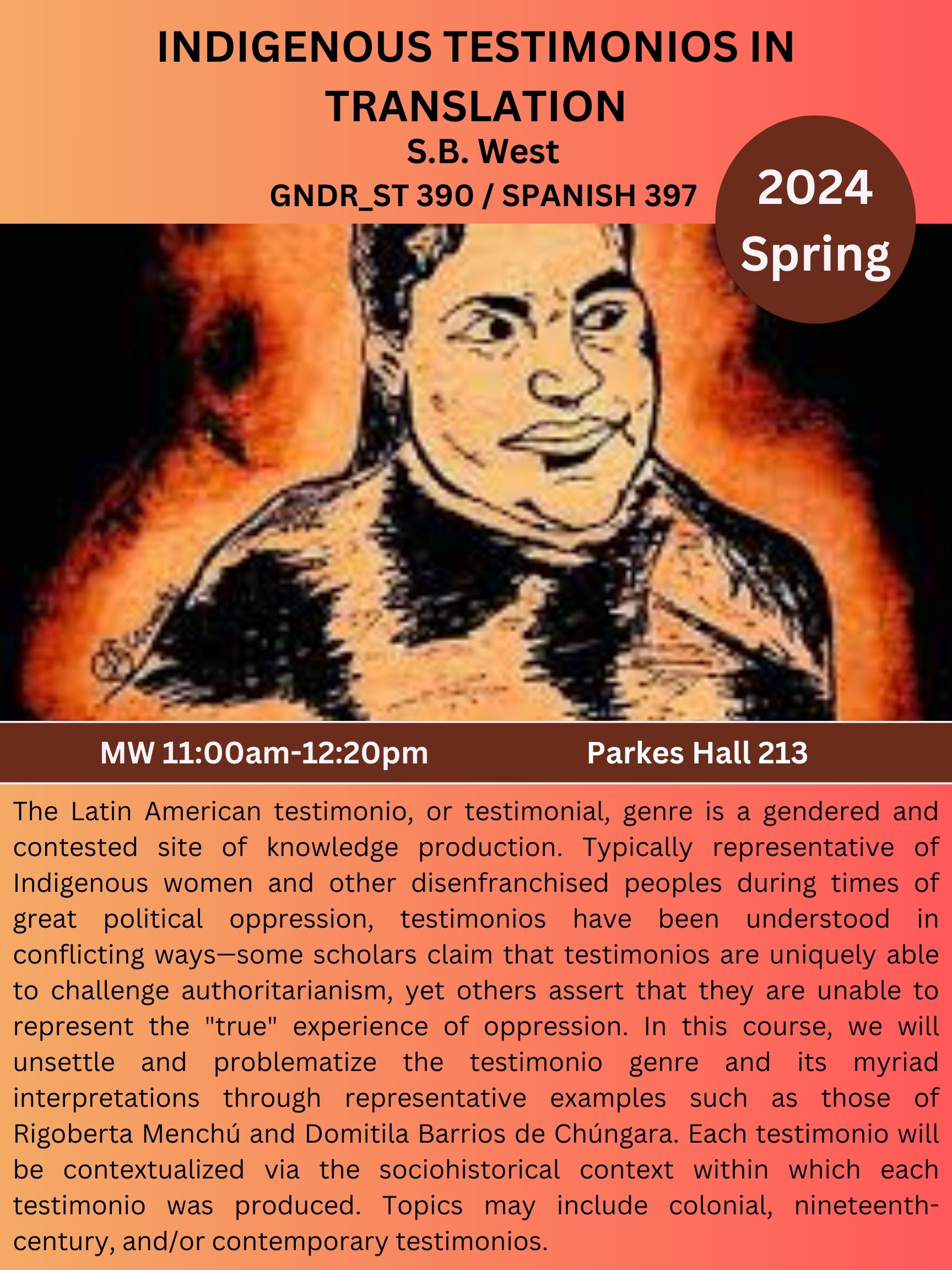 |
GNDR_ST 390-0-22: Indigenous Testimonios in Translation
The Latin American testimonio, or testimonial, genre is a gendered and contested site of knowledge production. Typically representative of Indigenous women and other disenfranchised peoples during times of great political oppression, testimonios have been understood in conflicting ways—some scholars claim that testimonios are uniquely able to challenge authoritarianism, yet others assert that they are unable to represent the “true” experience of oppression. In this course, we will unsettle and problematize the testimonio genre and its myriad interpretations through representative examples such as those of Rigoberta Menchú and Domitila Barrios de Chúngara. Each testimonio will be contextualized via the sociohistorical context within which each testimonio was produced. Topics may include colonial, nineteenth-century, and/or contemporary testimonios.
|
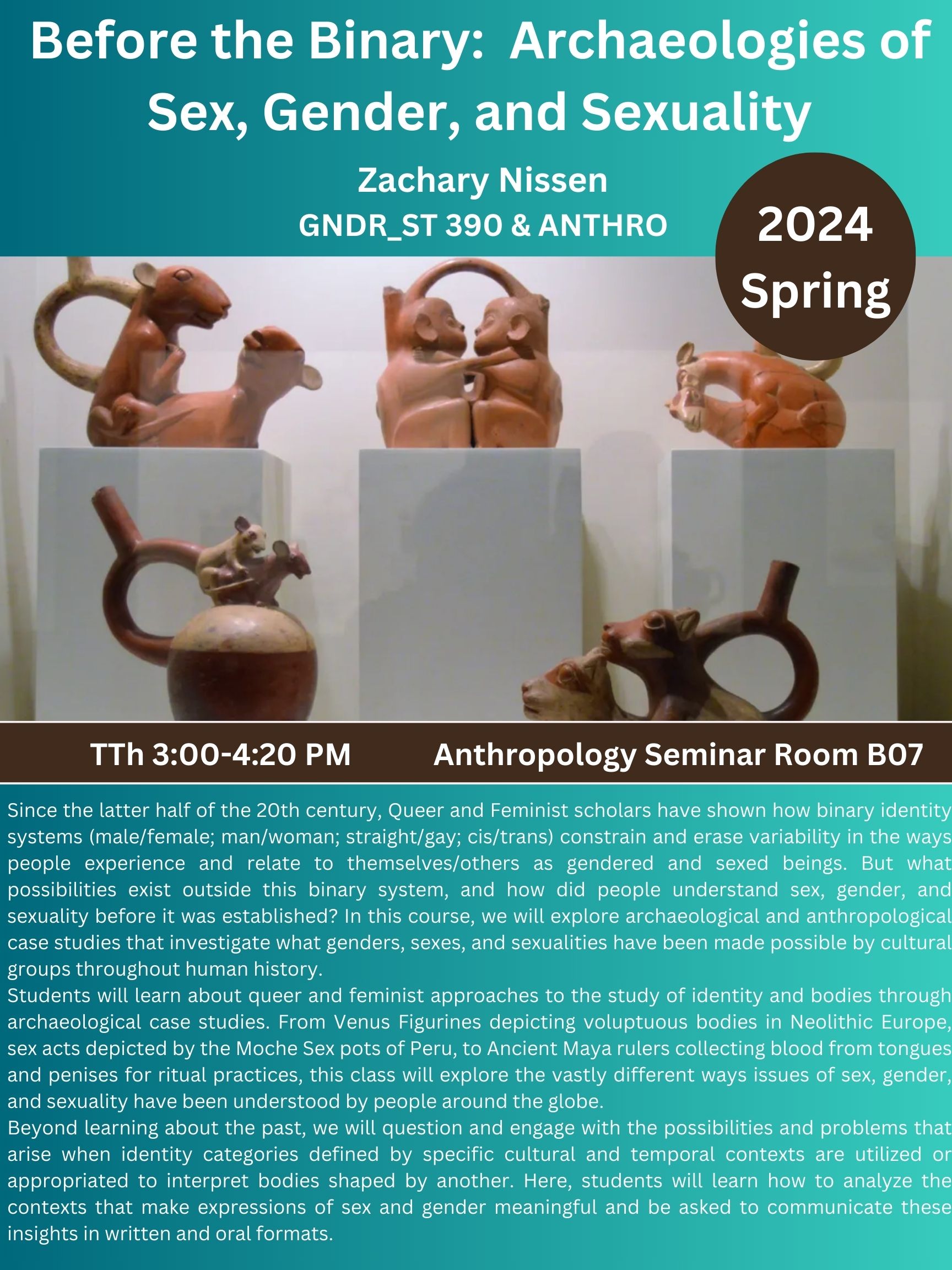 |
GNDR_ST 390-0-23: Before the Binary: Archaeologies of Sex, Gender, and Sexuality
Since the latter half of the 20th century, Queer and Feminist scholars have shown how binary identity systems (male/female; man/woman; straight/gay; cis/trans) constrain and erase variability in the ways people experience and relate to themselves/others as gendered and sexed beings. But what possibilities exist outside this binary system, and how did people understand sex, gender, and sexuality before it was established? In this course, we will explore archaeological and anthropological case studies that investigate what genders, sexes, and sexualities have been made possible by cultural groups throughout human history.
Students will learn about queer and feminist approaches to the study of identity and bodies through archaeological case studies. From Venus Figurines depicting voluptuous bodies in Neolithic Europe, sex acts depicted by the Moche Sex pots of Peru, to Ancient Maya rulers collecting blood from tongues and penises for ritual practices, this class will explore the vastly different ways issues of sex, gender, and sexuality have been understood by people around the globe.
Beyond learning about the past, we will question and engage with the possibilities and problems that arise when identity categories defined by specific cultural and temporal contexts are utilized or appropriated to interpret bodies shaped by another. Here, students will learn how to analyze the contexts that make expressions of sex and gender meaningful and be asked to communicate these insights in written and oral formats.
|
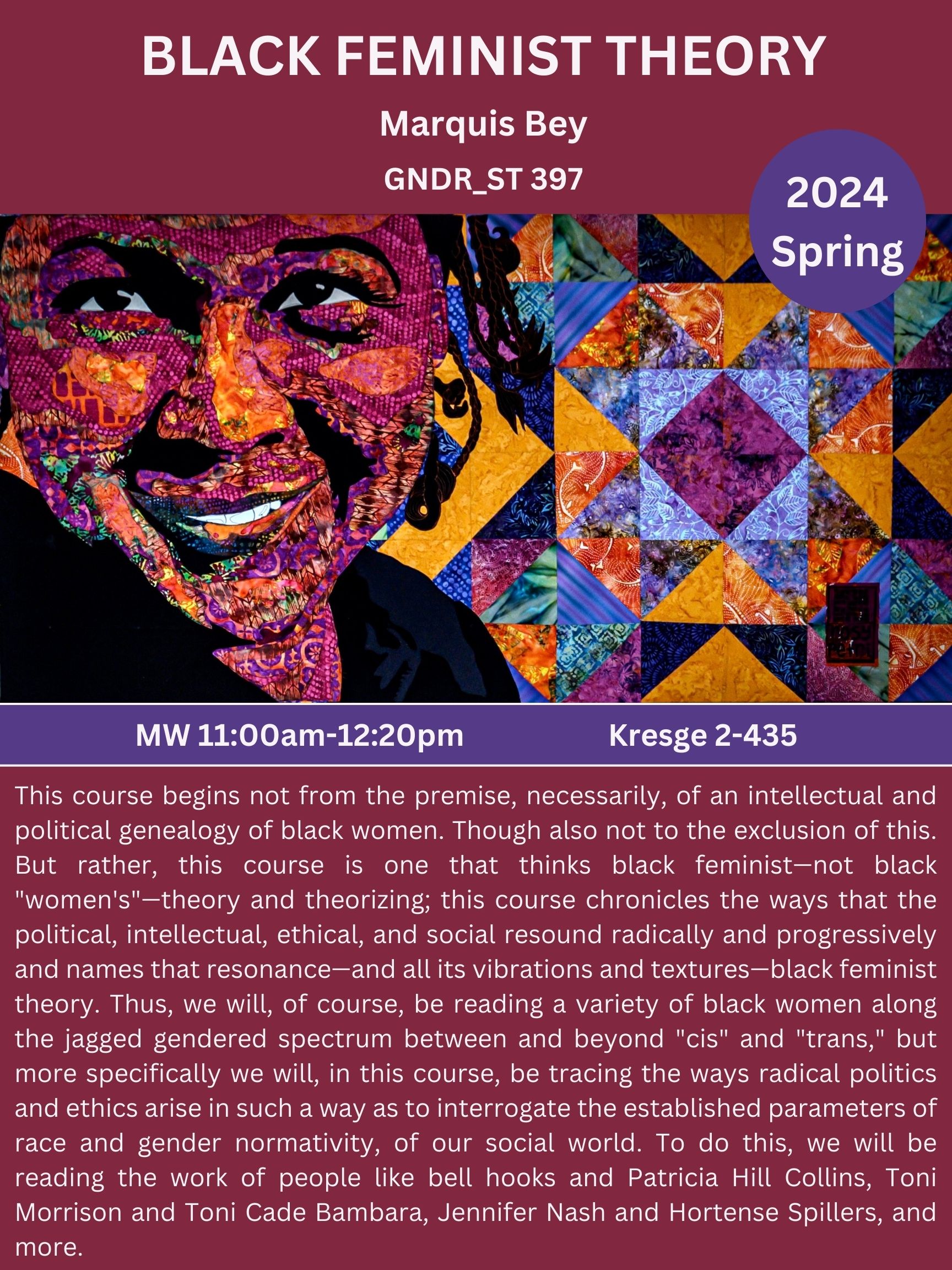 |
GNDR_ST 397-0-1/AF_AM_ST 380/ENGLISH 383: Black Feminist Theory
This course begins not from the premise, necessarily, of an intellectual and political genealogy of black women. Though also not to the exclusion of this. But rather, this course is one that thinks black feminist—not black “women’s”—theory and theorizing; this course chronicles the ways that the political, intellectual, ethical, and social resound radically and progressively and names that resonance—and all its vibrations and textures—black feminist theory. Thus, we will, of course, be reading a variety of black women along the jagged gendered spectrum between and beyond “cis” and “trans,” but more specifically we will, in this course, be tracing the ways radical politics and ethics arise in such a way as to interrogate the established parameters of race and gender normativity, of our social world. To do this, we will be reading the work of people like bell hooks and Patricia Hill Collins, Toni Morrison and Toni Cade Bambara, Jennifer Nash and Hortense Spillers, and more.
|
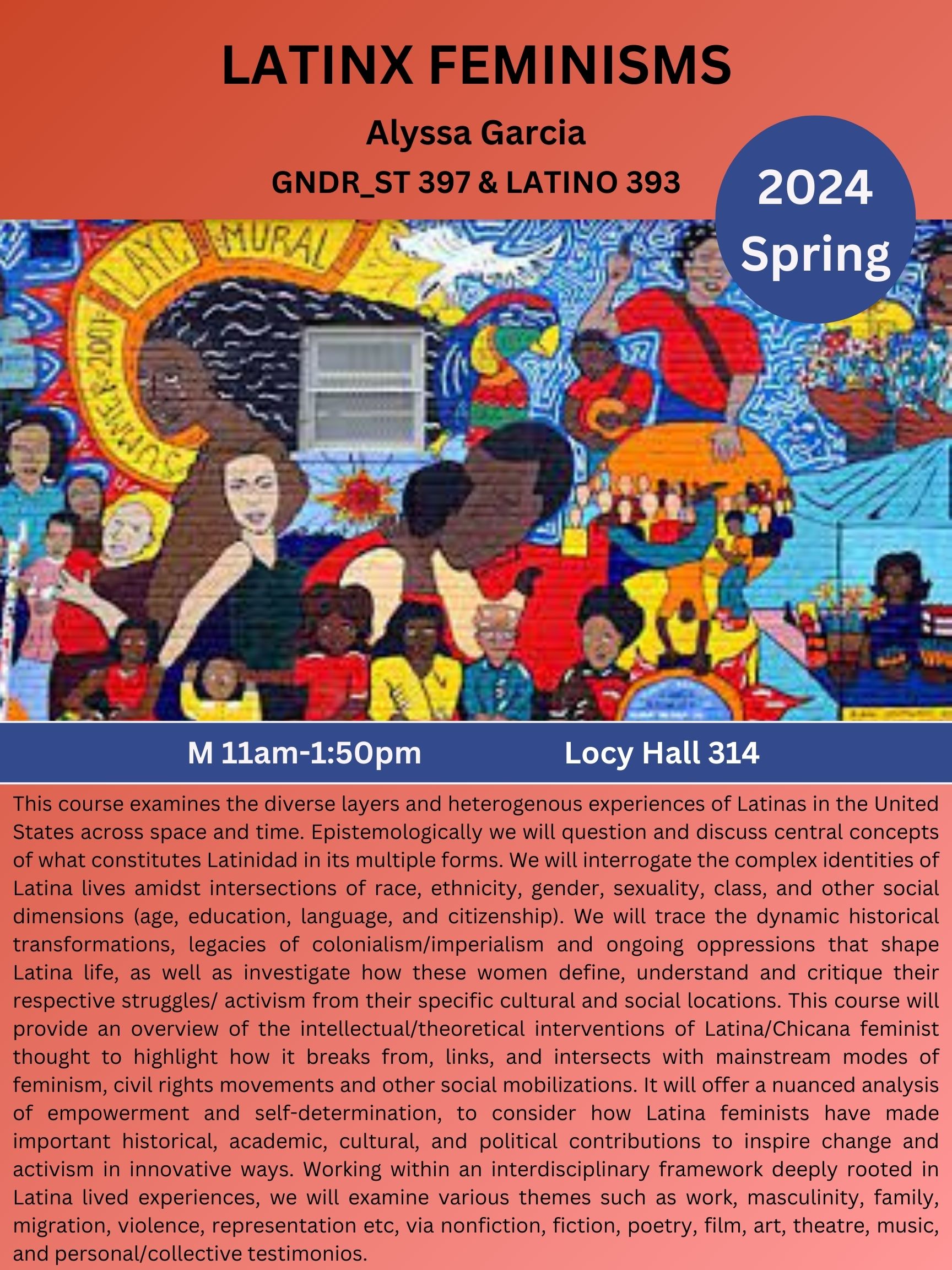 |
GNDR_ST 397-0-2/LATINO 393: Latinx Feminisms
This course examines the diverse layers and heterogenous experiences of Latinas in the United States across space and time. Epistemologically we will question and discuss central concepts of what constitutes Latinidad in its multiple forms. We will interrogate the complex identities of Latina lives amidst intersections of race, ethnicity, gender, sexuality, class, and other social dimensions (age, education, language, and citizenship). We will trace the dynamic historical transformations, legacies of colonialism/imperialism and ongoing oppressions that shape Latina life, as well as investigate how these women define, understand and critique their respective struggles/ activism from their specific cultural and social locations. This course will provide an overview of the intellectual/theoretical interventions of Latina/Chicana feminist thought to highlight how it breaks from, links, and intersects with mainstream modes of feminism, civil rights movements and other social mobilizations. It will offer a nuanced analysis of empowerment and self-determination, to consider how Latina feminists have made important historical, academic, cultural, and political contributions to inspire change and activism in innovative ways. Working within an interdisciplinary framework deeply rooted in Latina lived experiences, we will examine various themes such as work, masculinity, family, migration, violence, representation etc, via nonfiction, fiction, poetry, film, art, theatre, music, and personal/collective testimonios.
|
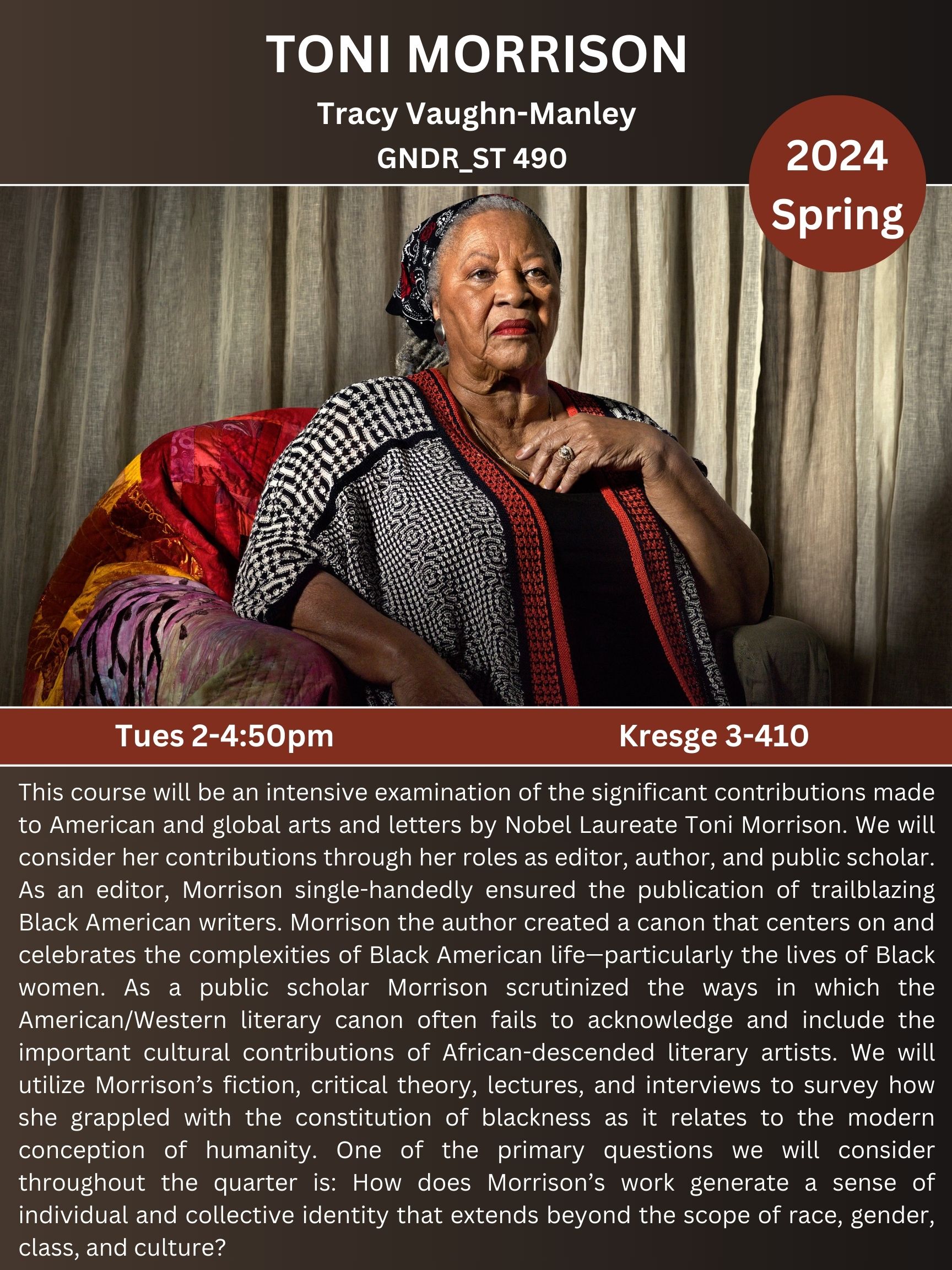 |
GNDR_ST 490-0-20/AF_AM_ST 480: Toni Morrison
This course will be an intensive examination of the significant contributions made to American and global arts and letters by Nobel Laureate Toni Morrison. We will consider her contributions through her roles as editor, author, and public scholar. As an editor, Morrison single-handedly ensured the publication of trailblazing Black American writers. Morrison the author created a canon that centers on and celebrates the complexities of Black American life—particularly the lives of Black women. As a public scholar Morrison scrutinized the ways in which the American/Western literary canon often fails to acknowledge and include the important cultural contributions of African-descended literary artists. We will utilize Morrison’s fiction, critical theory, lectures, and interviews to survey how she grappled with the constitution of blackness as it relates to the modern conception of humanity. One of the primary questions we will consider throughout the quarter is: How does Morrison’s work generate a sense of individual and collective identity that extends beyond the scope of race, gender, class, and culture?
|
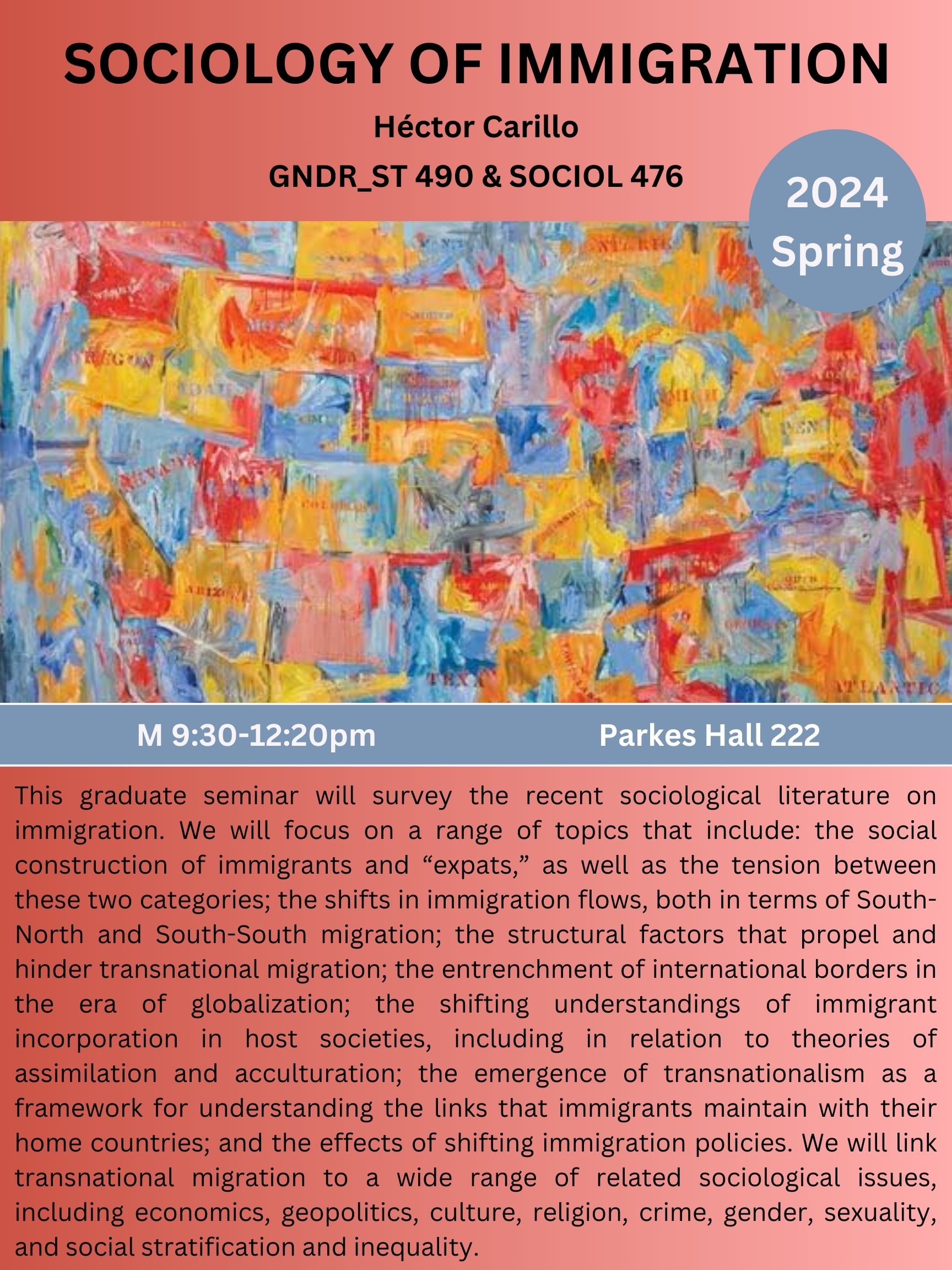 |
GNDR_ST 490-0-21/SOCIOL 476: Sociology of Immigration
This graduate seminar will survey the recent sociological literature on immigration. We will focus on a range of topics that include: the social construction of immigrants and “expats,” as well as the tension between these two categories; the shifts in immigration flows, both in terms of South-North and South-South migration; the structural factors that propel and hinder transnational migration; the entrenchment of international borders in the era of globalization; the shifting understandings of immigrant incorporation in host societies, including in relation to theories of assimilation and acculturation; the emergence of transnationalism as a framework for understanding the links that immigrants maintain with their home countries; and the effects of shifting immigration policies. We will link transnational migration to a wide range of related sociological issues, including economics, geopolitics, culture, religion, crime, gender, sexuality, and social stratification and inequality.
|
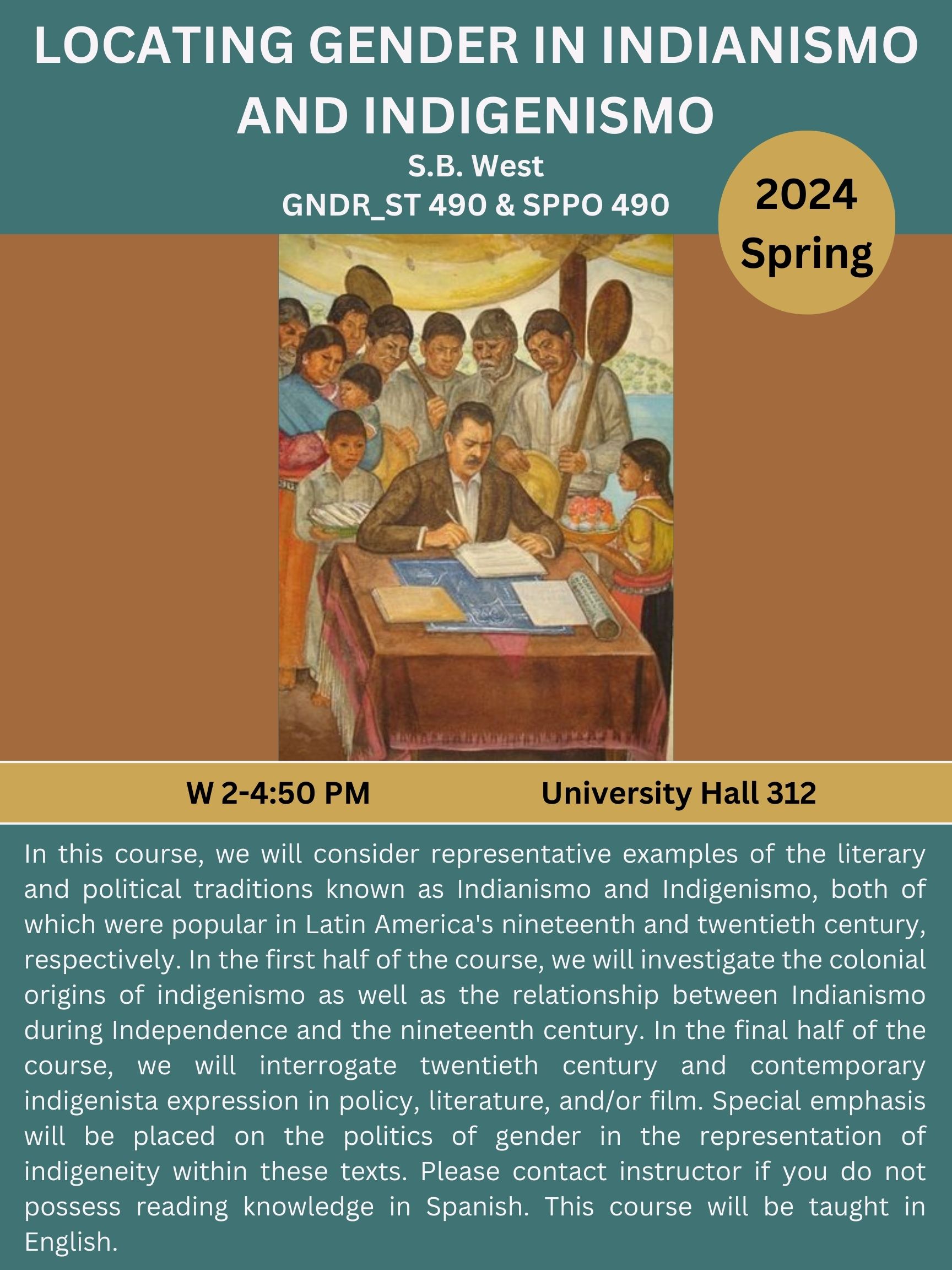 |
GNDR_ST 490-0-23/SPANPORT 480: Locating Gender in Indianismo and Indigenismo
In this course, we will consider representative examples of the literary and political traditions known as Indianismo and Indigenismo, both of which were popular in Latin America's nineteenth and twentieth century, respectively. In the first half of the course, we will investigate the colonial origins of indigenismo as well as the relationship between Indianismo during Independence and the nineteenth century. In the final half of the course, we will interrogate twentieth century and contemporary indigenista expression in policy, literature, and/or film. Special emphasis will be placed on the politics of gender in the representation of indigeneity within these texts. Please contact instructor if you do not possess reading knowledge in Spanish. This course will be taught in English.
|
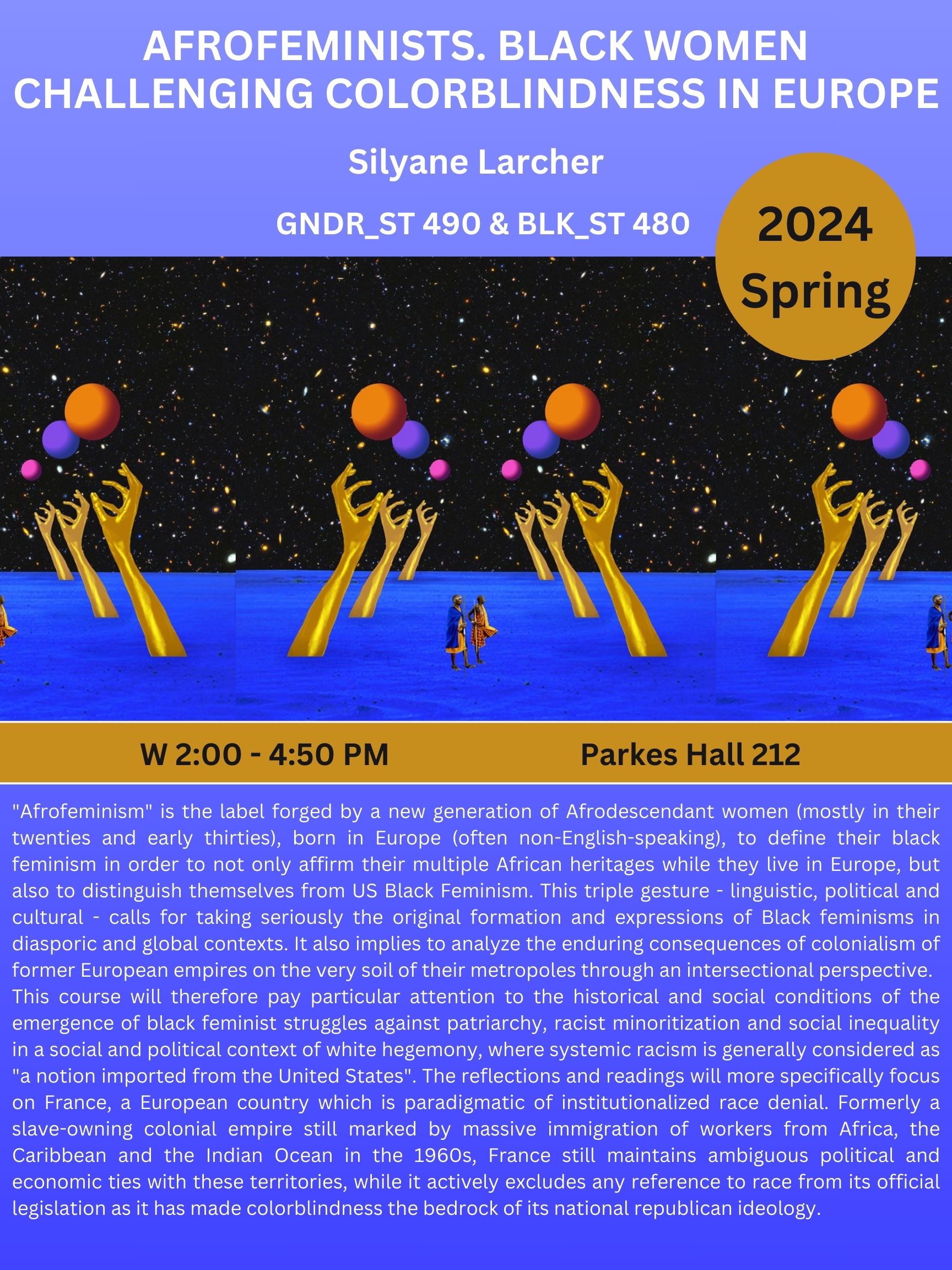 |
GNDR_ST 490-0-24/BLK_ST 480-0-22: Afrofeminists. Black Women challenging colorblindness in Europe
"Afrofeminism" is the label forged by a new generation of Afrodescendant women (mostly in their twenties and early thirties), born in Europe (often non-English-speaking), to define their black feminism in order to not only affirm their multiple African heritages while they live in Europe, but also to distinguish themselves from US Black Feminism. This triple gesture – linguistic, political and cultural – calls for taking seriously the original formation and expressions of Black feminisms in diasporic and global contexts. It also implies to analyze the enduring consequences of colonialism of former European empires on the very soil of their metropoles through an intersectional perspective. This course will therefore pay particular attention to the historical and social conditions of the emergence of black feminist struggles against patriarchy, racist minoritization and social inequality in a social and political context of white hegemony, where systemic racism is generally considered as "a notion imported from the United States”. The reflections and readings will more specifically focus on France, a European country which is paradigmatic of institutionalized race denial. Formerly a slave-owning colonial empire still marked by massive immigration of workers from Africa, the Caribbean and the Indian Ocean in the 1960s, France still maintains ambiguous political and economic ties with these territories, while it actively excludes any reference to race from its official legislation as it has made colorblindness the bedrock of its national republican ideology.
|
